
























AAs I write this, it’s perhaps the most beautiful day of the summer – blue skies, no humidity – a perfect time for the kids to jump back into the pool and come home to a fun barbecue dinner. The Three Weeks are over, and there is an excitement that is often associated with Shabbos Nachamu and Tu B’Av. Rather than videos of cantatas, we will soon get videos of our kids enjoying camp concerts, swimming, color war, and trips.
But this year, there is still a sense of sadness.
Yes, every year, as we leave the Three Weeks, we hope that we just experienced our last Tisha B’Av in galus, but this year, we feel galus a little deeper. I’m sure that as we watched the clock tick slowly on Tisha B’Av afternoon, our hunger felt different than other years – we imagined what it would feel like to feel this way not just for one day but for 307 days, in a dark tunnel, subject to unspeakable cruelty, while wondering if you will ever see the light of day again. This year, Tisha B’Av is not fully behind us; part of it is coming with us.
Yet, there is something magical about the rhythm of the Jewish calendar. Despite the present situation, we are naturally in-
clined at this time to feel hope. It is not an empty hope – it’s not just that we are free to enjoy summer again – it’s a feeling that seven weeks of nechama are ahead of us, culminating in the yomim noraim and Sukkos. It’s a hope that over the next few weeks miracles will happen and every single hostage will come home; it’s a hope that all the displaced people will be able to return to their homes in the north and the south; it’s a hope that this year on Shemini Atzeres we will be able to feel unbridled joy and a sense of love from Hashem, despite the memory of last year.
This all can and iy”H will happen. We can make it happen by tapping into the power of the Jewish calendar, by bringing the hope and nechama with us into the year. As we start to shop and swim and celebrate, we can envelop those acts with a deep-rooted belief that the words of the nechama will soon come to reality.
In that merit, may we experience the ultimate joy of greeting Moshiach, seeing the end of all suffering, and feeling Hashem’s love and embrace in a way that is beyond our wildest imagination.
Wishing you a wonderful week, Shoshana

Yitzy Halpern, PUBLISHER publisher@fivetownsjewishhome.com
Yosef Feinerman, MANAGING EDITOR ads@fivetownsjewishhome.com
Shoshana Soroka, EDITOR editor@fivetownsjewishhome.com
Nate Davis
Editorial Assistant
Nechama Wein
Copy Editor
Rachel Bergida
Shana Brecher
Lani White
Design & Production
Gabe Solomon Distribution & Logistics
P.O. BOX 266
Lawrence, NY 11559
Phone | 516-734-0858
Fax | 516-734-0857
Classified Deadline: Monday 5:00PM classifieds@fivetownsjewishhome.com text 443-929-4003
PAYMENT VIA CREDIT CARD MUST BE SUBMITTED ALONG WITH CLASSIFIED ADS
The Jewish Home is an independent weekly magazine. Opinions expressed by writers are not necessarily the opinions of the publisher or editor. The Jewish Home is not responsible for typographical errors, or for the kashrus of any product or business advertised within. The Jewish Home contains words of Torah. Please treat accordingly.











Dear Editor,
My uncle, Rabbi Genack, in the name of his rebbe, Rav Soloveitchik, presents a wonderful idea relating the theme of nechama. He notes that nechama is a din in aveilus, and therefore, there can be no aveilus without nechama. One proof is that aveilus ends only at the time when the consolers stop coming; it must be that nechamah is a kiyum of aveilus. This is why we may not give nechamah to an onen (literally, where the body is in front of him, i.e., a mourner whose relative is not yet buried). An onen is not subject to the laws of aveilus but rather those of aninus, which has no requirement of nechamah. This is why Tisha B’av concludes with Shabbos Nachamu, because aveilus needs nechamah.
May we see the kiyum hastily in our days.
Steven Genack
To The Editor:
I was going to respond to the scurrilous comments we have come to expect from Jason Stark and Daniel Behar, but I was touched by the suggestion from Yitzchak Moskowitz that rather than engage in whatever back and forth I am occasionally permitted on those occasions when The Jewish Home chooses to permit my response, we instead withhold our views from these pages and instead meet over bagels and coffee. Perhaps editor Shoshana Soroka can facilitate the gathering – maybe in the offices of The Jewish Home.
But I would like Mr. Moskowitz to play referee.
In the meantime, I’ll refrain from further comment. Hopefully those that disagree with me will do likewise.
David S Pecoraro
Former Vice President Rosedale Jewish Center
Dear Editor,
Trigger warning: The following is political satire and may cause leftist heads to explode. Viewer discretion is advised.
UNITED KINGDOM—The United Kingdom – a formerly serious country –has been moving farther and farther away from its democratic roots and pushing closer and closer to a socialist dystopian nightmare. The latest iteration of this alarming transformation is a law the government passed that requires children in all schools to study Mao Zedong’s famous little red book, which is a collection of his statements from speeches and writings.
“We believe that Chairman Mao’s little red book will inspire the next generation to fully embrace socialism,” British MP David Wilson said, as he was staring at a portrait of Karl Marx. “Our goal is to vest all powers within the state, destroy any and all notions of rights and freedoms, and break up the family unit. After studying Mao’s book, our children will be equipped with the knowledge and tools necessary to usher in the socialist revolution.”
The UK government also ordered that anyone who opposes the measure will be sent to a labor camp and forced to listen to Kamala Harris’s cackling for hours at a time.
Rafi Metz


Dear Editor,
The selection of Tim Walz as Kamela Harris’s Vice President is problematic on many fronts. First, Josh Shapiro, the current governor of Pennsylvania, was favored to be her running mate. However, since he is Jewish, that would not sit well with the Minnesota crowd who didn’t want to see a Jew in the Vice President (V.P.) position.
Walz, the high school teacher who was also a coach, has a long history of things starting with his less than mid-western Communist values. He was draconian in his crackdown on Covid, demanding masks and vaccinations for everyone. Walz also set up a “snitch line” so neighbors could report on anyone leaving their home or not wearing a mask. He took 30+ trips to Communist China, taking impressionable high school students for at least 10 of those trips. Walz states that he was fascinated by China, and as proof of that fascination, he and his wife honeymooned in China, marking their anniversary with that of the massacre at Tiananmen Square.
In 2020, Walz, as Governor, allowed Minneapolis to burn because he personally believed that the protestors were justified in their cause. He ordered the police to “stand down” in the face of rioters who he believed were exercising their “free speech.” Despite the mayor of Minneapolis requesting the National Guard, Walz opposed sending in the guard because he felt they would “inflame” the situation.
Only on the third day of rioting would he acquiesce in sending in the guard. That fits perfectly with President Biden’s V.P., Kamela Harris, who promoted a fund to bail out the protestors.
While the Democrat Party touts Walz’s military record, his service did not include war time. He is accused by his fellow soldiers of “stolen valor” for indicating that he served in war and carried “weapons of war.” Additionally, he misstated his rank at the end of his service because he decided not to be deployed to Iraq, but rather retired. He then used “weapons of war” as a political issue for gun control in his political campaigns.
As far as Israel is concerned, Walz made it a habit to meet with Palestinian representatives. One such case is Asad Zaman, who Walz referred to as a “Master Teacher” and who is the Director of the Muslim American Society of Minnesota. Zaman sides with the Palestinians as shown on his website. He states they were justified in the most heinous slaughter, assault, and abduction of more than 1,500 Jews on October 7. Zaman’s organization was previously given $100,000 by the State of Minnesota under Walz. The Anti-Defamation League stated that Zaman has a troubling history.
These are just some of the many reasons Jewish-Americans should not vote for the Harris/Walz ticket.
Jan Henock Woodmere, NY



In a unanimous ruling delivered last Wednesday by the Constitutional Court of Bangkok, Thailand’s capital, the court ruled that the Move Forward Party, a progressive party that won 14 million votes and a majority of seats in parliament in 2023, must dissolve.
The court said in its decision that “the constitutional court has to inevitably disband the party” because Move Forward is guilty of “undermining the monarchy” through its efforts to revise lese majeste, Thailand’s draconian law that bans criticism of the royal family. Last January, the constitutional court demanded that the progressive Move Forward party cease its efforts against lese majeste, alleging that the party’s heads are attempting to oust the country’s monarchy.
As part of the verdict delivered last week, the party and its leaders are now banned from involving themselves in politics for ten years. In response to the ruling, party leaders have insisted that they will continue to fight to preserve their progressive movement.
The party’s 2023 parliamentary win was surprising and threatened Thailand’s status quo. Due to Move Forward’s failure to secure parliamentary support for its royal reform agenda, the party was unable to form a government. Move Forward’s leader, Pita Limjaroenrat, stepped down after his party’s failure, making Move Forward a main opposition party.
This isn’t the first time the supposedly-independent constitutional court has ruled in favor of the dissolvement of progressive parties. Following the 2019 election, in which Move Forward’s predecessor, Future Forward, secured the third largest number of seats, the court ordered
the dissolution of the party and, likewise, barred party leaders from politics for ten years. The court’s move triggered mass demonstrations in 2020, headed by a younger generation of outraged, anti-monarchy Thai political leaders.
Over the past few years, hundreds of Thai citizens have been imprisoned on charges of violating Section 112, which is more commonly known as lese majeste. Last January, a man named Mongkol Thirakhot was sentenced to fifty years in jail after it was determined that he posted content on social media that insulted the country’s monarch. For one offense, a person can be sentenced to up to fifteen years in prison.
Lese majeste charges can also be brought by any citizen of Thailand, even those who have no direct involvement in the case. The Move Forward party has campaigned against lese majeste, vowing to lower sentence lengths and restrict those who can bring charges. Many human rights organizations say that Thailand’s lese majeste rules are used to limit the public’s freedom of speech.

On Friday, Denmark announced that it would be strengthening its border with Sweden. The measure come in the wake of Swedish gang violence that spilled into Denmark in recent weeks.
Copenhagen said it hoped to contain the spread of violence in its territory after Swedes were arrested suspected of several violent crimes in Denmark.
“The (Danish) police have decided to increase controls with Sweden,” Danish Justice Minister Peter Hummelgaard told TV2 television.
“Just before the summer break, the Danish parliament adopted... a vast series of measures regarding the gangs which... give police new and better tools to fight organized crime,” he said. “Today, we are tightening the screws even further.”
Police controls will be increased on trains crossing the Øresund Strait between the southern Swedish city of

16 Malmö and the Danish capital Copenhagen, the main crossing point between the countries. They will also be increased on the Øresund road bridge linking the two cities, with the use of camera surveillance among other things.
Since April, Swedes have been implicated in 25 cases in Denmark linked to organized crime. Recently, three Swedes – all minors – were arrested and held in custody following three shootings in Denmark.
Sweden has struggled to contain the rising gang violence in recent years, with shootings and bombings now weekly occurrences across the Scandinavian country. Other violent incidents linked to Sweden’s gangs have taken place in Norway, Turkey, and Iraq in recent months. Many of the skirmishes have been connected to the drugs market, although it has spilled into rivalries and personal vendettas in gang war.
A plane crashed to the ground in Vinhedo, Brazil, on Friday, killing all passengers onboard the aircraft.
The plane, operated by VoePass, was carrying 58 passengers and four crew members, a total of 62 people onboard. The plane had departed from Cascavel, Brazil, in the state of Parana.

“The company regrets to inform that all [62] people on board flight 2283 died locally,” the airline said in a statement.
The aircraft was flying normally on Friday until 1:21 p.m., when it stopped responding to calls. Radar contact was lost at 1:22 p.m. The crash occurred shortly after, at 1:30 p.m.
One witness told reporters, “I thought it was going to fall in our yard. It was scary, but thank G-d there were no victims among the locals. It seems that the 62 people inside the plane were the real victims, though.”
At an event in southern Brazil, President Luiz Inácio Lula da Silva asked the crowd to stand and observe a minute of

silence as he shared the news.
In a statement, the plane’s manufacturer, French-Italian ATR, said company specialists are “fully engaged to support both the investigation and the customer.”
The plane’s black box, or flight data recorder, has been recovered by officials.

Tanzanian police said Tuesday they had arrested more than 500 people, including top opposition leaders, as they planned to attend a youth rally, a stunning development in the East African nation where a pathbreaking female president had once promised to restore political freedoms.
Some 520 people were arrested across the country ahead of a Monday rally in the southwestern city of Mbeya, Awadh J. Haji, police commissioner for operations and training, said in a statement. Police, he said, also seized 25 vehicles that had been transporting people going to the rally and officials from different regions in the country.
The rally was organized by the opposition Chadema party, which said it wanted to mark International Youth Day. But police banned the gathering before it was underway and accused party members of making statements that showed their intention to carry out anti-government protests similar to those that swept across neighboring Kenya in recent months.
The latest crackdown does not augur well for Tanzania, whose president promised to oversee a more open nation after coming to power in 2021. The country’s first female leader, President Samia Suluhu Hassan, reversed some of the measures put in place by her populist predecessor, including by lifting a yearslong ban on political rallies.
But since then, Hassan’s government has been accused of cracking down on protests against a port management deal, forcibly evicting Maasai communities from their land, suspending news media outlets and arresting journalists — issues that activists say are alarming as the country prepares for local elections in De-
cember and a general election next year.
Among those arrested was Freeman Mbowe, chair of the Chadema party, and his deputy in the mainland, Tundu Lissu. Mbowe was released from prison in 2022 after charges against him related to terrorism were dropped.
Lissu was arrested in Mbeya on Sunday as he and other party members were gathering in the city for the rally. He, Mbowe and other top officials were released Tuesday after posting bail, according to a statement from the party posted on social media. The party said its office in Mbeya was “surrounded by the police, and they are not allowing people to enter” it.
The latest clampdown has drawn criticism from rights groups who have called on Hassan to stop them. (© The New York Times)

Secretary of State Antony Blinken’s six-day visit to six countries in Asia concluded last week. During the trip, Blinken visited Japan, the Philippines, Laos, Vietnam, Singapore, and Mongolia.
Blinken, standing side by side with Secretary of Defense Lloyd Austin, sought to boost the U.S.’s military relationship with Japan and the Philippines, with Blinken and Austin announcing a new joint-force command in Japan and pledging to give $500 million to the Philippines so that the country could bring its military up to date. His mission in visiting the other four countries was to represent the U.S. as a superpower in the region.
Blinken arrived in Asia the day after U.S. President Joe Biden delivered an address in which he attempted to clarify his reasons for not seeking a second term. In conversation with Blinken, Mongolian Prime Minister Oyun-Erdene Luvsannamsrai said that last year he had a “very good meeting” with vice president and current Democratic presidential nominee Kamala Harris, whom he wishes “the best of luck for her upcoming elections.”
With Biden on his way out of the White House, Asia hangs in the balance, as it faces the prospect of an electoral victory for former president and current GOP presidential nominee Donald

Trump, whose views on the region differ greatly from the Biden administration’s.
Although Laos and Vietnam, like China, are both communist states, Blinken sought to portray them as friends of the United States. At one point in the trip, Blinken met with To Lam, the president of Vietnam and the successor to the recently-deceased communist party leader Nguyen Phu Trong, who declared that Nguyen had “always wanted to elevate the relationship with the United States.” Blinken visited the family of Nguyen, who passed away a month ago, to wish them his condolences.
While in Singapore, Blinken met with Chang Heng Chee, a former ambassador to the U.S., at the Asian Civilizations Museum in a public forum, during which she lamented the U.S.’s hesitancy to engage in free trade.
“You cannot promote democracy if you don’t promote trade,” Chan chided. “So I get very discouraged when I hear Americans say we can’t do trade.”
Blinken responded, noting that the U.S. is Southeast Asia’s biggest direct foreign investor and recipient of foreign investing. He added that although the U.S. is a “great trading nation,” it must ascertain that “the trade works for our working people, that it works for our companies,
that it works for our societies.”
Blinken and other Biden administration officials have sought to convince China that the U.S. isn’t trying to limit Beijing’s power but have found doing so difficult, as Blinken continues to promote military talks with Japan and the Philippines. Blinken, on July 27, held a friendly conversation about several issues with Chinese foreign policy official Wang Yi while at the sidelines of a foreign minister conference in Laos. However, the Chinese Foreign Ministry reported that Wang told Blinken that Beijing wouldn’t give in to U.S. “pressure and blackmail” and expressed his belief that the United States has escalated “its containment and suppression of China.”
While in Mongolia, the final country of his trip, Blinken was given a horse as a gift from Prime Minister Oyun-Erdene Luvsannamsrai, who affirmed Mongolia’s strong democratic and economic relationship with the United States. Blinken named the horse “Frontier” but didn’t take the animal home with him.

Iran executed at least 29 people over two days last week, alarming officials in the United Nations human rights office.
The office of the U.N. High Commissioner for Human Rights said on Friday it has verified that 38 people were executed in July, bringing the total number of executions to at least 345 this year — mostly for drug offenses or murder — including 15 women.
“Imposing the death penalty for offenses not involving intentional killing is incompatible with international human rights norms and standards,” rights office spokeswoman Liz Throssell told a U.N. briefing on Friday.

down its war in Yemen. Last Friday, however, the State Department announced that it would be putting an end to the ban.
“We will continue new transfers on a typical case-by-case basis consistent with the Conventional Arms Transfer Policy,” a state department official said, confirming that the U.S. will soon be allowed to sell air-to-ground munitions to the kingdom.
Since Congress must approve major international weapons agreements prior to their finalization, lawmakers were briefed on the decision last week. The U.S. is expected to make an offensive weapons sale to Saudi Arabia soon.
“The Saudis have met their end of the deal, and we are prepared to meet ours,” said a senior Biden administration official.
“U.N. High Commissioner for Human Rights Volker Türk is extremely concerned about reports that, in the space of two days this week, Iranian authorities reportedly executed at least 29 people across the country,” she said. “This represents an alarmingly high number of executions in such a short period of time.”
A disproportionate amount of Kurds, Arabs and Baloch minorities were killed. Some prisoners were executed without their families or lawyers being told.
The United Nations has had longstanding concerns about executions in Iran. The U.N. Secretary-General Antonio Guterres issued a report in November decrying the “alarming rate” of them in the Islamic Republic.

Three years ago, the Biden administration banned the U.S. from selling offensive weapons to Saudi Arabia, a measure aimed at pushing Riyadh to slow
The ban was implemented three years ago due to bipartisan concerns about the mounting death toll and humanitarian crisis in Yemen. However, the war in Yemen has since cooled down, as the parties fighting for control of the country, Saudi Arabia and the Houthi rebel group, agreed to a U.N.-brokered ceasefire in March 2022. Since then, Saudi Arabia hasn’t launched airstrikes on Yemen, and the Houthis have rarely crossed the border to attack the kingdom. Additionally, international attention has shifted from the war in Yemen to the war in Gaza, which was triggered on October 7, when Hamas invaded southern Israel, massacring 1,200 Israelis and kidnapping 251 others. The Houthis have been disrupting key global waterways in support of Hamas.
“We also note the positive steps that the Saudi Ministry of Defense have taken over the past three years to substantially improve their civilian harm mitigation processes, in part thanks to the work of U.S. trainers and advisors,” added the State Department official.
In 2014, the Houthis overthrew Yemen’s then-government, which was backed by Saudi Arabia. The following year, war broke out between the Iranbacked rebel group and a military alliance led by Saudi Arabia, killing hundreds of thousands.
Iran’s new president, Masoud Pezeshkian, ran as a reformist candidate. But when he announced Sunday that his Cabinet nominees included several conservatives and only one woman, he faced a fierce backlash, with a high-profile vice president resigning and political allies accusing him of abandoning campaign























promises to bring change.
The resignation Sunday of Mohammad Javad Zarif, who had been appointed vice president for strategy and had led a search committee for Cabinet nominations, shocked Iran’s political circles. He had been a prominent face of Pezeshkian’s campaign, traveling across the country and telling voters to give change a chance. Now, he was abandoning the government in a public display of deep divisions before it was even formed.

In a post on his Instagram account, Zarif said it had become clear to him that he could not bring about the kind of domestic change that people had expected.
“I am not satisfied with the outcome of my work, and I’m ashamed that I could not adequately achieve what I had promised about representation of women, youth and ethnicities and the expert opinion of the committees,” he said.
Zarif followed up Monday with another post on Instagram, saying that his resignation did not mean he regretted supporting Pezeshkian or that he had lost hope in the new government, but rather “it means that I doubt whether I can be effective as a vice president of strategy.”
More stunning was the timing of Zarif’s resignation. As Iran’s former foreign minister, its most seasoned foreign policy expert and the top negotiator in the 2015 nuclear deal between Iran and world powers, said he was bowing out as a possible regional war loomed.
Iran has been threatening to retaliate against Israel for the assassination of Hamas’ political leader, Ismail Haniyeh, in Tehran about two weeks ago. Israel, which has not taken responsibility for the killing but had admitted being behind the assassination of a Hezbollah commander in Lebanon around the same time, has said that if Iran and Hezbollah launch large retaliatory attacks, it would strike back with force.
At the center of the controversy are two key Cabinet nominees: the candidates for minister of the interior and intelligence. Pezeshkian named two conservatives with a long history of brutal crackdowns on protesters, women and dissidents even though he had pledged

during debates and campaign rallies that he would reform such heavy-handed tactics. (© The New York Times)

Last week, part of a hotel in western Germany collapsed, leaving two people dead and tracking several people in the rubble overnight. The last person to be rescued finally was saved 24 hours later.
Fourteen people were in the hotel in Kroev when one story of the building collapsed at about 11 p.m. on Tuesday. Police said five were able to get out of the building unhurt because they were not in the part that collapsed, but others were trapped.
Some people who were trapped were able to connect with police by phone. But authorities had trouble reaching them because of the damage to the building.
“We have to proceed with caution because the entire building structure is like a house of cards. If we pull on the wrong card, this building is sure to collapse,” Joerg Teusch, fire and disaster protection inspector for the Bernkastel-Wittlich district, explained.
Among the first to be saved was a 2-year-old child, who was pulled out unharmed, and the child’s mother, who was rescued with minor injuries. The child’s father was rescued later.
“We all had tears in our eyes and I still feel the same now. The whole story has a very emotional component, because when we arrived, when we looked at the building, it looked like we weren’t taking anyone out,” Teusch said.
Authorities have yet to determine why the building collapsed. The original hotel building is believed to date back to the 17th century, but additional stories were added around 1980. Work was being done to the building the day of the collapse.
Witnesses reported hearing a bang and seeing a large cloud of dust at the time of the collapse.

On Sunday, the Paris Olympics wrapped up, with the United States earning the most medals – 126. China came in second (91), Great Britain came in third with 65, France earned 64 medals, Australia got 53, and Japan nabbed 45.
In terms of getting the gold, the United States and China each earned 40 gold medals; Japan came in a distant 20.
Simone Biles came to Paris as the most decorated gymnast ever and left with another three Olympic gold medals as well as a silver, becoming one of the biggest stories of these Games. She had pulled out of the Tokyo Olympics because of a cause of the “twisties.”
“It was important to me because nobody forced me to be out there on that stage,” Biles said of her victories this time around. “I solely did it for myself and I’m in a really good spot mentally and physically. So doing this for just me meant the world.”
Angela Carini, an Italian boxer, made headlines around the world when she bowed out of a match after 46 seconds when an Algerian boxer, Imane Khelif, who claims to be a woman, pummeled her in the ring.
After Khelif won her gold medal, Khelif’s lawyer Nabil Boudi said on Saturday that they filed a legal complaint with the Paris prosecutors because the boxer suffered “aggravated online harassment.”
“Imane Khelif decided to lead a new fight: one of justice, dignity and honor,” Boudi said.
Katie Ledecky made the U.S. proud, when she earned four medals – two gold, one silver and one bronze. In the process, she became the most decorated female U.S. Olympian of all time with 14 medals, surpassing fellow swimmer Jenny Thompson.
“I just love the pool, love the water, love telling people how great our sport is,” she recently told CNN. “Getting people in the pool to learn how to swim, that’s really important to me.”
In Paris, Ledecky won her gold medals in the 800- and 1,500-meter free-

22 style events, as well as a silver in the 4x200-meter freestyle relay and bronze in the 400-meter freestyle.
Ahead of the Paris Olympics, swimming in the River Seine had been illegal for more than 100 years due to the water’s pollution level.
However, in a mission to stand out and make some of the swimming events unique, authorities spent at least $1.55 billion to clean up the Seine in the leadup to the Games, and Paris officials made a big show of displaying its suitability.
However, the river’s E. coli levels meant the men’s individual triathlon – which began with the swimming leg in the Seine – had to be postponed by a day, and practice swims for the marathon swim and triathlons had to be canceled due to poor water quality levels following rainy days.
Still, Paris 2024 organizers insisted the water quality in the Seine was at a “very good” level on the morning of the individual triathlons. Belgium later withdrew from the mixed relay triathlon race and Switzerland had to mix up its roster after athletes from both countries fell ill following the initial triathlon races.
Turkey’s Yusuf Dikec caused a stir at the Games this year for his casual approach to shooting. With no specialized equipment — such as custom glasses, large ear protection or tinted lenses — and a hand casually resting in one pocket, Dikeç claimed Turkey’s first Olympic medal – a silver – in shooting with teammate Şevval Ilayda Tarhan.
Novak Djokovic added “Olympic gold medalist” to his resume this year. With the victory, Djokovic became the fifth player to own what has been dubbed the career “golden slam” by winning all four majors and an Olympic singles title. That exclusive group also features Rafael Nadal, Andre Agassi, Steffi Graf and Serena Williams, who was in the stands to witness the pulsating contest.
Thursday’s cigarette deliveries were unique, although the IDF has airdropped leaflets over Gaza in the past. Some leaflets that had been dropped in the past, for example, have ordered Gazans to evacuate from the area or have asked for information about top Hamas officials.
On the anti-Hamas leaflets dropped last week, the IDF printed a contact number for the “Influence Department,” which could provide more information. Another leaflet promised a gift for any Gazan who gathers five leaflets, although the gift was not specified.

Since the start of the war, which broke out in the wake of the October 7 massacre, Hamas has exercised complete authority of Gaza’s supply and demand and has exorbitantly increased prices for humanitarian aid, produce, and even cigarettes. As of now, cigarettes in Gaza cost $27 USD; a single pack costs a whopping $430 USD. Prior to the war, a single cigarette in Gaza 70 cents. Hamas, while using the extra money from the tax to fund its defense against the Israeli offensive, has time and time again hurt civilians in the enclave. Some Gazans, desperate for a smoke, have smuggled cigarettes or have begun using alternatives.
Hani Shaheen lives in Gaza. “Every week, I get together with four of my friends, and we each chip in to buy one cigarette,” Shaheen told The National .
“Each of us takes a couple of puffs, just enough to relieve some of the tension and stress we’re feeling. Five puffs don’t really do much, but it’s become a habit that I can’t break, and I’m used to it now, along with many of my friends.”
The cigarette air-deliveries, according to N12, are meant to encourage anti-Hamas sentiment in the Strip and to highlight the terror group’s inability to govern the territory.
On Thursday, the Israel Defense Forces airdropped cigarettes over the Gazan city of Khan Younis. Along with the cigarettes, the army also dropped anti-Hamas leaflets that read, “Smoking is dangerous, but Hamas is more dangerous,” and “Hamas is burning Gaza.”
Jewish state’s best year in the Olympics yet and eclipsing Israel’s previous record of four medals. Israel won one gold medal, five silver, and one bronze. Before this year, Israel had 13 Olympic medals in all; now it has 20.
Israel will give NIS 5 million to the victorious athletes, NIS 1 million of which will go to the gold medalist, NIS 700,000 to each of the silver medalists, and NIS 500,000 to the bronze medalist. An additional NIS 2.5 million will be awarded to the coaches.
Surprisingly, this year’s Olympics didn’t see much anti-Israel sentiment, aside from a few signs, posters, and boos coming from the crowd. In one Judo match, Messaoud Redouane Dris, an Algerian player, refused to play against Tohar Butbul, an Israeli athlete, and forfeited the match.
In fact, there were many Israeli flags. Additionally, when twenty-four-year-old Israeli sailor Tom Reuveny won the gold medal for men’s windsurfing, “Hatikva,” the national anthem of Israel, was sung.
“It’s much bigger than me to win this event, and it feels amazing,” Reuveny said, adding that his brother was fighting in Gaza as an IDF soldier and that “it was so hard to go training while everyone else was crying over lost people, dead people. It’s been so hard, and I still had to put my head down and keep training and it’s all for this moment.”

Well-known Israeli athlete Sharon Kantor won a silver medal in the women’s windsurfing event. In total, Israel has won five Olympic sailing medals.
Israel broke other records this year. For example, Lonah Chemtai Salpeter, 35, a female runner who immigrated to Israel from Kenya in 2016, made ninth place in Sunday’s women’s marathon, the highest spot in the race for Israel yet.

On Sunday, Gali Baharav-Miara, the attorney general of Israel, demanded that Labor Minister Yoav Ben-Tzur end daycare funding for charedi households that have members that learn instead of going to the army.
Baharav-Miara cited the High Court’s recent ruling that military exemptions for charedi Jews are not legal. That supreme court decision came into effect last week, with the IDF conscripting around 3,000 chareidim Of the 900 charedim who received conscription orders, only 48 appeared for the draft. Last March, the High Court also ended state funding to yeshivas where around 50,000 students are eligible for conscription. The rulings have sparked widespread protests, with many charedim insisting that they will not serve, in fear of secularization.
“The conclusion is that there is no longer any justification to fund the daycare as an incentive for Torah studies for those who are designated for military service but have not shown up to be drafted,” the attorney general said.
“It is important to emphasize that cigarettes do not enter the Strip and that this is a one-time occurrence,” a security official noted.
Israeli athletes won seven medals in the 2024 Paris Olympics, marking the
Three Israelis won medals in Judo: Raz Hersko, who won a silver medal in the women’s over-78kg weight class; Inbar Lanir, who won silver in the women’s over-78kg weight class; and Peter Paltchick, who won bronze in men’s under-100kg class. In total, Israel has won nine judo Olympic medals.
This year, Israel won two silver medals in gymnastics. One of the medals was won by Artem Dogopyat, who played in the men’s artistic gymnastics floor routine, and the other was won by a rhythmic gymnastics team of five Israeli women. Dolgopyat previously won a gold medal in Tokyo, making him Israel’s top Olympic athlete.
If a household has even one member who refuses to serve, then that family won’t receive subsidies to send their children to daycare, Baharav-Miara declared. The measure will take effect in the beginning of the upcoming school year and will affect whether funding is given to families to pay for the daycare tuition but not the child’s registration.
The Shas party, of which Ben Tzur is a member, is strictly against the conscription of charedi Israelis and said the attorney general was bullying the charedi community.
“The decision to deny working charedi mothers the subsidy for daycare three weeks before the start of the school year just because the husband is studying Torah is cruel legal bullying and abuse of


helpless children,” Shas said, adding that Baharav-Miara’s decision was “mark of Cain on the forehead of the legal system, which is supposed to be the protector and supporter for women who have decided to enter the workforce and contribute to the Israeli economy.”
Housing Minister Yitzhak Goldknopf, the leader of United Torah Judaism party, an ally of Shas, branded the order “scandalous and discriminatory.”
“This is a direct attack against charedi
women who go out to work for a living, and seek to maintain a Torah lifestyle,” Goldknopf stated. “This is another attempt to harm the charedi public in various and cruel ways. Torah Judaism will act with all the tools at its disposal to ensure that the families of the Jews are not harmed.”
“The attorney general reveals the truth – they are not interested in the needs of the army, but only in obsessive persecution of the Torah world and the charedi family,” said Judaism and Her-
groups were eliminated by the IDF in an airstrike launched at Gaza City’s Taba’een school complex, which was used as a military base. The identities of the deceased operatives were publicly released by Israel on Saturday night.

Although the strike was successful in eliminating terrorists who used the school as a base of operations, the international community still condemned Israel for allegedly killing an unconfirmed number of Palestinian civilians. Gaza’s defense agency, which is run by the untruthful terror group that massacred 1,200 Israelis and kidnapped 251 others on October 7, purports that more than ninety people were killed in the airstrike on the school, although it failed to differentiate between civilians and operatives.
In response to news of the strike, the Biden administration expressed deep concern and lamented the civilian death toll in Gaza.
“We know Hamas has been using schools as locations to gather and operate out of, but we have also said repeatedly and consistently that Israel must take measures to minimize civilian harm,” stated Sean Savett, a spokesman for the National Security Council.
“Yet again, far too many civilians have been killed,” said Kamala Harris, the U.S. vice president and Democratic presidential nominee. “Israel has a right to go after the terrorists that are Hamas. But they also have an important responsibility to avoid civilian casualties. We need a hostage deal, and we need a ceasefire. And I can’t stress that strongly enough –the deal needs to get done. It needs to get done now.”
itage Minister Meir Porush. “The legal system drags small children into a political battle and works to starve them. They have no restraint.”
Nineteen terrorists from the Hamas and Palestinian Islamic Jihad terror
The U.K., France, Egypt, Qatar, Lebanon, Iran, Turkey, and the United Nations all released statements, condemning Israel for the strike and calling for an immediate ceasefire, with some accusing the Jewish state of genocide or of not taking enough caution to avoid civilian casualties. Some alleged that women and children were killed in the strike.
The IDF used three “precision munitions” and struck a mosque in the Taba’een school complex, where many terrorists were hiding, according to the military. The army added that the “strike could not have caused the damage that

26 corresponds to the casualty reports of the government media office in Gaza,” but rather, caused little damage to the rest of the school complex.
“Early this morning, the IDF conducted a precision strike against the terrorists in one specific building of the compound. An area that, according to our intelligence, no women and children were present,” IDF Spokesman Rear Adm. Daniel said.
Hagari added that there was a “high probability,” according to “various intelligence indications,” that Ashraf Juda, the Islamic Jihad’s Central Camps Brigade commander, was also at the school at the time of the strike, although it is currently unknown whether he is still alive.
“Increasingly, in recent months, Hamas has focused on exploiting school buildings, often where civilians are sheltering inside, to use them as military facilities, command and control centers, for storing weapons, and to execute terrorist attacks,” Hagari stated. “After we received clear intelligence of the threat posed by these terrorists and in accordance with international humanitarian law, we took numerous steps to mitigate the risk to civilians, including using aerial surveillance prior to the strike and selecting very precise munitions to avoid civilian casualties.
“Since the beginning of this war, the Hamas and Islamic Jihad terrorist organizations have been systematically abusing the civilian population and infrastructures in Gaza for their terrorist activities against the state of Israel,” Hagari added. “This includes Hamas’s massive network of underground tunnels which go under towns, hospitals, mosques, schools, and UN facilities, and are used by terrorists to command attacks, store weapons, and hold Israeli hostages captive.”

The Defense Security Cooperation Agency, part of the U.S. Department of Defense, notified Congress on Tuesday that U.S. Secretary of State Antony
Blinken had approved five potential sales to Israel – collectively worth up to $20.3 billion – of tactical vehicles, mortar and tank cartridges, missiles and F-15 fighter jets.
The sale of F-15IA and F-15I+ aircraft “and related equipment” costs up to $18.82 billion, according to the agency. Israel has requested to buy 50 new F-15IA jets, which are made by Boeing, the agency said.
“The United States is committed to the security of Israel, and it is vital to U.S. national interests to assist Israel to develop and maintain a strong and ready self-defense capability. This proposed sale is consistent with those objectives,” it said.
“Incorporating F-15IAs into the Israel Air Force’s fleet of fighter aircraft will enhance Israel’s interoperability with U.S. systems and bolster Israel’s aerial capabilities to meet current and future enemy threats, strengthen its homeland defense and serve as a deterrent to regional threats,” the agency added.
Delivery of the jets would likely begin in 2029, per the agency.
The State Department also approved sales worth up to $102.5 million of “advanced medium range air-to-air missiles and related equipment,” which are made by the Tucson, Ariz.-based RTX Corporation. The missiles are “used to defend against airborne threats, such as the missile and drone salvo launched at Israel on April 14,” per the Pentagon.
Foggy Bottom green-lit a proposed sale, worth up to $774.1 million, of 32,739 “120 mm tank cartridges and related equipment,” which are made by General Dynamics and Northrop Grumman. The State Department also approved a proposed sale of 50,400, General Dynamics-made “120 mm high explosive mortar cartridges and related equipment” worth up to $61.1 million, and a proposed sale of Oshkosh Corporation-made “modified M1148A1P2 family of medium tactical vehicles and related equipment,” worth up to $583.1 million.
The Defense Security Cooperation Agency said that the sales of the missiles, mortar and tank cartridges and tactical vehicles “will improve Israel’s capability to meet current and future enemy threats, strengthen its homeland defense and serve as a deterrent to regional threats.”
Shelley Greenspan, the White House liaison to the U.S. Jewish community, said that the “proposed sales will support Israel’s long-term security by resupplying stocks of critical munitions and investing in long-term upgrades in capability.”
“Israel continues to face a myriad of severe threats, including from Iran and its proxy groups such as Hamas, Hezbollah and the Houthis,” Greenspan said.
The U.S. “commitment to Israel’s security remains unwavering. We will continue to do what is necessary to ensure Israel can defend itself in the face of these threats.” (JNS)
Dempsey addressed the court and spoke of his “profound sense of regret” for his actions, issuing a personal apology to the police gathered in the room.
Federal prosecutors have charged more than 1,265 defendants and secured prison sentences for more than 460 people involved in the riot.

David Dempsey was handed out a 20 year prison sentence on Friday, the second-longest sentence for defendant convicted in the January 6, 2021 events at the U.S. Capitol.
Prosecutors showed multiple videos of Dempsey kicking and throwing objects at the police line. Many members of the Capitol Police and D.C. Metropolitan Police were in attendance in the courtroom during the trial.
In one video clip, Dempsey repeatedly swung a stolen metal crutch down onto an officer’s helmet, cracking the face shield.
One officer who Dempsey struck testified that he believed he was going to die and that his thoughts began drifting to his family.
Judge Lamberth described Dempsey’s offenses as “exceptionally egregious” before handing down the sentence, which he said was further warranted due to Dempsey’s lengthy criminal history and past instances where he had attacked political opponents during protests in 2019 and 2020.
The judge, a Reagan appointee, said that “fortunately” Dempsey’s efforts to break through the police line were not fruitful, as it would likely have resulted in a “bloodbath” for lawmakers sheltering inside the building.
“David Dempsey is political violence personified,” a prosecutor said in making the case for Dempsey’s harsh sentence.
Prior to receiving his sentence,

Starbucks, facing slowing sales, a slumping stock and agitation from activist investors, abruptly ousted its CEO on Tuesday, replacing him with the CEO of Chipotle Mexican Grill.
Brian Niccol, who has held the top position at Chipotle since 2018, will take the helm of Starbucks next month, the company said. He will replace Laxman Narasimhan, whose tenure began in March last year, when he took over from Howard Schultz and became the first CEO to come from outside the company. Starbucks’ chief financial officer, Rachel Ruggeri, will step in as interim CEO until Sept. 9. Analysts and investors largely cheered the move, with Starbucks’ stock soaring more than 21% in morning trading.
The swift change in leadership at the coffee giant comes as it grapples with weakening results in some of its biggest markets, particularly the United States and China. Since the start of Narasimhan’s tenure, Starbucks shares have fallen more than 20%.
The steep drop in the stock and softening results had opened the door for activist investment groups to enter. Elliott Investment Management, which started building a position in the stock this summer, began pushing the company to make changes. Last week, a second activist group, Starboard Value, joined the fray.
In an interview with CNBC, Mellody Hobson, who is stepping aside as board chair to become lead independent director in September when Niccol assumes his role, said the board started to consider a leadership change a couple months ago. It ultimately decided Niccol would be “the right leader for this moment” — and did not consult Elliott or other shareholders about the change, Hobson said.
In a statement, Elliott said it viewed the announcement “as a transformational step forward for the company.”
Narasimhan, who is leaving Starbucks effective immediately, was handpicked by the board and Schultz in the fall of 2022. The former CEO of Reckitt, which owns brands including Lysol and Air Wick, Narasimhan had little-to-no background in restaurant chains.
Niccol spent about three years at the top of Taco Bell, part of Yum! Brands, and took over as CEO of Chipotle in early 2018. Chipotle’s stock has soared from around $6 in 2018 to a recent record high of more than $65 this summer.
On Tuesday, Chipotle’s stock fell nearly 12% as the company said its chief operating officer, Scott Boatwright, would act as interim CEO. (© The New York Times)
NASA astronauts Butch Wilmore and Suni Williams were supposed to end their mission in space around seven weeks ago. The two, however, have spent over two months in space, and it’s currently unclear how NASA is going to get them home.
Wilmore and Williams flew to space on a test flight of Boeing’s Starliner. Although they were initially supposed to return on the Starliner, NASA is reconsidering that decision, as concerns have popped up about propulsion problems and helium leaks. They also found issues with overheating, causing Teflon seals to bulge. Instead, the two astronauts might have to be rescued by SpaceX’s Crew-9, a move that might force Wilmore and Williams to remain in the International Space Station for an additional six months, which would mean they’d likely return in February 2025 or later.

“I would say that our chances of an uncrewed Starliner return have increased a little bit based on where things have gone over the last week or two,” said NASA’s Space Operations Mission Directorate associate administrator Ken Bowersox. “But again, new data coming in, new

analysis, different discussion — we could find ourselves shift in another way.”
NASA must make their decision by mid-August, according to officials. On Friday, Boeing rejected NASA’s concerns and insisted that it would be safe for the astronauts to come home on the Starliner.
The two astronauts started their mission on June 5.
“We haven’t approved this plan [regarding the astronauts’ return on a
SpaceX craft],” Steve Stich, the commercial crew program manager of NASA, said, adding that a return on Starliner would be the optimal choice. “In other words, we’ve done all the work to make sure this plan is there; we have the suits identified to fly up on Crew-9 (for Williams and Wilmore to wear aboard Crew Dragon). … But we have not turned that on formally, as that’s the path that we’re going to go down.”
SpaceX’s Crew-9 mission was sup-
posed to launch at around August 18. However, last Tuesday, NASA said that it was postponing the launch until at least September 24 in light of the possibility of using SpaceX’s craft to bring the astronauts home.
“This adjustment allows more time for mission managers to finalize return planning for the agency’s Boeing Crew Flight Test,” NASA said in a statement.
There would be challenges in abandoning the Starliner for the time being,

however.
“Switching off of our primary path of bringing Butch and Suni home on Starliner causes us to take additional risk in the rest of our mission profile — and so we have to compare all those risks,” said Bowersox.
For instance, if the Starliner is left behind, it would need a software update to allow it to fly back to Earth autonomously. The issue is that the Starliner code hasn’t been written or modified since
around 2022. Revisiting the code would be challenging and time-consuming.
A new study found that xylitol, a popular low-calorie sugar alternative found in low-sugar foods and other items, like gum and toothpaste, may double the risk of heart attacks, strokes, and deaths if
level may go up 10% or 20% but it doesn’t go up a 1,000-fold,” said Hazen, noting that xylitol levels did go up 1,000-fold. “Humankind has not experienced levels of xylitol this high except within the last couple of decades when we began ingesting completely contrived and sugar-substituted processed foods.”

Dr. Matthew Tomey, a cardiologist who works at Mount Sinai Fuster Heart Hospital in New York City and assistant medicine professor at Mount Sinai’s Icahn School of Medicine, noted that “differences in platelet behavior were seen even after a person consumed a modest quantity of xylitol in a drink typical of a portion consumed in real life.”
“These experiments are interesting but alone do not prove that platelet abnormalities are to account for a linkage between xylitol and clinical events,” Tomey, a researcher unaffiliated with the study, added.
The scientists behind this new study also found in 2023 that another popular sweetener used in stevia, monk fruit, and other products, called erythritol, may cause blood clots. The study indicated that, within three years, the risk of heart attack and stroke is almost doubled when erythritol is consumed at its highest quantities.
The American Heart Association has recently predicted that around 61% of U.S. adults will have cardiovascular disease by 2050. Xylitol is often promoted as a sugar alternative for individuals with diabetes or obesity.
eaten in high amounts.
“We gave healthy volunteers a typical drink with xylitol to see how high the levels would get and the (levels of xylitol) went up 1,000-fold,” said Dr. Stanley Hazen, a senior study author and the director of the Center for Cardiovascular Diagnostics and Prevention at the Cleveland Clinic Lerner Research Institute and at the Cleveland Clinic’s Center for Microbiome and Human Health.
“When you eat sugar, your glucose
“When someone has a heart attack, we give them aspirin or drugs like clopidogrel, or Plavix, to counter platelet activity. These sugar alcohols appear to be enhancing platelet activity, which is concerning,” said National Jewish Health in Denver’s director of cardiovascular prevention and wellness Dr. Andrew Freeman. “This is another warning we ought to switch to water, with a close second being unsweetened tea or coffee.”
In response to the studies, Calorie Control Council president Carla Saunders said the study’s findings “are contrary to decades of scientific evidence substantiating the safety and efficacy of low-calorie sweeteners such as xylitol by global health and regulatory agencies. These

30 findings are a disservice to those who rely on alternative sweeteners as a tool to improve their health.”
“If you actually do the calculation, it literally takes a tonnage of fruit to be equivalent to one diabetic cookie that can have like nine grams of xylitol, which is a typical label amount. It would be like eating salt at the level of a salt lick,” said Hazen, noting that natural amounts of xylitol are actually very small. “It’s sold as a so-called natural sweetener, and because xylitol doesn’t spike blood sugar levels, it’s also marketed as low carb and keto friendly.
“Yet people at risk for diabetes are among the most vulnerable for clotting events,” he added. “We’re targeting the wrong people.”
“Through their work, the investigators have shined a light on the safety of sugar substitutes. There is more to learn,” said Tomey. “In the meantime, it is worth remembering that sugar substitutes are no substitute for a sincere commitment to the several elements of a healthy diet and lifestyle.”

A new study has linked marijuana overuse to a three-to-five times increase in the risk of head and neck cancers. A huge dataset of insurance data and millions of medical records were analyzed as part of the study.
“Our research shows that people who use cannabis, particularly those with a cannabis use disorder, are significantly more likely to develop head and neck cancers compared to those who do not use cannabis,” said Dr. Niels Kokot, a senior study author and professor of clinical otolaryngology-head and neck surgery at the Keck School of Medicine at the University of Southern California in Los Angeles.
According to the U.S. Centers for Disease Control and Prevention, cannabis use disorder is defined by the overuse of marijuana, marijuana use despite serious repercussions, the experiencing of cravings and withdrawal symptoms, the inability to stop using the drug, and becoming tolerant to marijuana’s effects.
“While our study did not differentiate between methods of cannabis consumption, cannabis is most commonly consumed by smoking,” Kokot noted. “The association we found likely pertains mainly to smoked cannabis.”
Dr. Joseph Califano, the Iris and Matthew Strauss Chancellor’s Endowed Chair in Head and Neck Surgery at the University of California, San Diego, who was unaffiliated with the research, noted that “the occasional recreational use of marijuana and head and neck cancer” has no associations, according to the study.
Out of all cancer cases, head and neck cancers account for 4%. The National Foundation for Cancer predicts over 71,000 new head and neck cancer diagnoses and over 16,000 deaths this year.
Nicotine and alcohol use are the leading causes of head and neck cancers, though the cancers could also be caused by GERD (gastroesophageal reflux disease), a weakened immune system, poor oral hygiene, and a diet without a sufficient amount of fruits and vegetables. Exposure to asbestos and wood dust could also cause head and neck cancers. Other causes include the contraction of the human papillomavirus (HPV) or the Epstein-Barr virus (EBV).
The average age of the 116,000 marijuana users with head and neck cancers, the study found, was forty-six. According to the study, those with cannabis use disorder, regardless of age, were around 2.5 times more likely to get oral cancer, around five times more likely to get oropharyngeal cancer (cancer of the soft palate, tonsils, and back of the throat), and more than eight times more likely to get larynx cancer.
“Especially as (marijuana) becomes more widely legalized and socially accepted, we may see a corresponding rise in head and neck cancer cases if the association is confirmed,” Kokot said. “This underscores the importance to inform people about the potential risks and conduct further research to understand the long-term impacts of cannabis use on cancer development.”
If you have a toddler, keep them off the tablets. According to a new study published in JAMA Pediatrics, child tablet use at 3.5 years old is associated with a higher number of expressions of anger and frustration a year later. In addition, children who were more prone to anger and frustration at 4.5 years old were more likely to
have higher tablet use a year later (at 5.5 years old). Early childhood tablet use “may contribute to a cycle” of problems in emotional regulation, according to the authors, Caroline Fitzpatrick, PhD, Pedro Mario Pan, PhD, and Annie Lemieux, MSc.

The studied was conducted in Nova Scotia, Canada, among a sample of 315 parents of preschool-aged children.
The results of this study are not surprising. Another study published earlier this year found that among kids 2- to 5-years old, those whose parents often used technology to manage their negative emotions were more likely to show poor anger and frustration management a year later.
Children, as part of their development, need to learn to deal with their negative emotions themselves. But if they are given a tablet or an electronic device when they are going through a hard time, they will not learn how to deal with their anger issues.

Susan Wojcicki, a pioneering tech executive who helped shape Google and YouTube, died at the age of 56 after suffering from lung cancer.
Wojcicki played a key role in Google’s creation and served nine years as YouTube’s CEO, stepping down last year to focus on her “family, health, and personal projects I’m passionate about,” she said at the time.
Wojcicki’s collaboration with Google co-founders Larry Page and Sergey Brin began shortly after they incorporated their search engine into a business in 1998. Wojcicki rented the garage of her Menlo Park, California, home to them for $1,700 a month. Page and Brin – both
25 at the time – continued to refine their search engine in Wojcicki’s garage for five months before moving Google into a more formal office. They later persuaded Wojcicki to come work for their company.
Wojcicki joined Google, now known as Alphabet, as its marketing manager in 1999 and served in various positions as Google grew its online advertising presence by acquiring YouTube in 2006 and DoubleClick in 2008. She served as Google’s senior vice president of advertising and commerce from 2011 to early 2014 and CEO of YouTube from 2014 to 2023.
“Her loss is devastating for all of us who know and love her, for the thousands of Googlers she led over the years, and for millions of people all over the world who looked up to her, benefited from her advocacy and leadership, and felt the impact of the incredible things she created at Google, YouTube, and beyond,” Google and Alphabet CEO Sundar Pichai said in a note to employees.

Looking to hear about the traffic and weather? For almost 60 years, commuters tuned into WCBS 880 AM to hear how clogged the Van Wyck was. Now, 880 is shutting the lights and will be replaced with ESPN New York.
The change will take place on August 26. 1010 WINS will still be on the air.
Audacy, the parent company for both WCBS 880 and 1010 WINS, announced the agreement with Good Karma Brands, a sports media networkthis week. The station 880 AM will become the new home of ESPN New York and will use the call letters WHSQ-AM.
Because Audacy owns 880 and 1010, it will move its coverage of the New York Mets to 1010 WINS.
“WCBS 880 has been one of the most respected radio stations in history, with a legacy cemented by the hundreds of worldclass journalists, on and off the air, who willed it into existence over the decades. If it happened in New York or the world, you heard about it on WCBS 880,” said Chris Oliviero, president of Audacy’s New York market. “Today, 1010 WINS@92.3FM, equally iconic, moves forward as New York’s only 24/7 all-news station with the
best distribution platform, the largest audience and the most recognized brand in the industry.”
WCBS 880 AM switched from music and radio to an all-news format in August 1967. It has been on the air in an all-news format for 57 years.
With 880 out of the picture, 1010 WINS remains the oldest all-news AM radio station in the United States, providing local, traffic and weather news for millions of New Yorkers since April 1965.

A magnitude 4.4 earthquake occurred in Los Angeles, California, on Monday at 12:20 p.m. PT, according to the U.S. Geological Survey.
The quake was only 7.5 miles deep and was directly under the populated areas of Los Angeles, which made it seem so much more potent to residents.
“It was a jolt,” one woman told KABC. “And then the building just started to shake violently. It wasn’t those nice roll-y ones we get. I had to hold on to the doorjamb.”
Earthquakes of magnitudes 4 to 5 generally bring light shaking and very light to no damage.
Other recent earthquakes in the area include a magnitude 4.9 quake on July 29 near Barstow and a magnitude 5.2 temblor last Tuesday near Bakersfield.
Pasadena Fire Department Deputy Chief Anthony James said, “I was parked next to a bus. It felt like the whole ground was going away from under me. I thought, ‘What was that?’ And quickly figured it out,” he said.
ers signed up, there were around 70 noshows, falling short of the 220 dogs needed to break the Guinness World Record. The current record – with 219 dogs – was set at a Los Angeles screening of PAW Patrol: The Mighty Movie in 2023.

Still, all is not lost. There appears to have been some dogs who may have come in without being registered, which would boost the numbers for the record attempt. Woof!

Researchers have been working on the excavation of an ancient Greek city in western Turkey. Recently, they uncovered a pot filled with a number of valuable gold coins that had been hidden away for more than 2,000 years.
The stash was found in Notion, an 80acre fortified city. It was buried beneath the floor of a fifth century BC courtyard house.
“The discovery of such a valuable find in a controlled archaeological excavation is very rare,” said excavation leader Dr. Christopher Ratté, professor of ancient Mediterranean art and archaeology at the University of Michigan and director of the Notion Archaeological Project, in the release.
“No one ever buries a hoard of coins, especially precious metal coins, without intending to retrieve it. So only the gravest misfortune can explain the preservation of such a treasure.”
ally used for everyday expenses.
As for why the owner never returned to retrieve the gold, Ratté proposed it could be indicative of Notion’s place as a frontier between the Greek civilization and Persian Empire during centuries of conflict. As such, the owner may have perished in battle.
Good as gold…

Jim Dreyer calls himself The Shark. Last week, the 60-year-old attempted an epic 80-mile swim across Lake Michigan. But after two days, Dreyer turned back. He had lost batteries needed for a critical GPS device and ended up going off-course.
Jim Dreyer, 60, was pulled from the water last Thursday after swimming for 60
miles. He said he had been swimming from Michigan to Wisconsin for hours without a GPS, relying only on a wrist compass and his reading of the sky and waves.
A support boat pulled up and informed him that he had been swimming north all day — “the wrong direction,” said Dreyer, who had left Grand Haven on Tuesday.
“What a blow!” he said in a report that he posted online. “I should have been in the home stretch, well into Wisconsin waters with about 23 miles (37 kilometers) to go. Instead, I had 47 miles (75 kilometers) to go, and the weather window would soon close.”
Dreyer said his “brain was mush” and he was having hallucinations about a steel wall — “stuck my hand right through it” — and cargo ships. He figured he would need a few more days to reach Milwaukee, but there was a forecast of 9-foot (2.7-meter) waves.
“We all knew that success was now a long shot and the need for rescue was likely if I continued,” Dreyer said.
Dreyer crossed Lake Michigan in 1998, starting in Two Rivers, Wisconsin, and finishing in Ludington, Michigan. He has attempted to do it again three times – all without success.
Time to wave goodbye.

Professional Drivers with · Limos · Suburbans · Sprinters for all your TRI-STATE transportation needs.
· Airports · Weddings,
· Out of town · Hourly rates. Affordable luxury!!
Around 210 dogs showed up with their owners to watch a movie in Vermont in the attempt to break a world record.
The group watched Andy Mitchell’s Netflix documentary, Inside the Mind of a Dog, at the Memorial Sports Center in Middlebury.
Although 280 dogs and their own-
The newly found coins are from the reign of the Persian Empire (sixth century BC to about 330 BC) and are known as Persian darics for the kneeling archer on the front of the coin that depicts Persian King Darius.
There are no dates on the coins, making it hard to pinpoint exactly when they were made. Gold coins were more valuable than silver ones, which were gener-
Shomer Shabbos
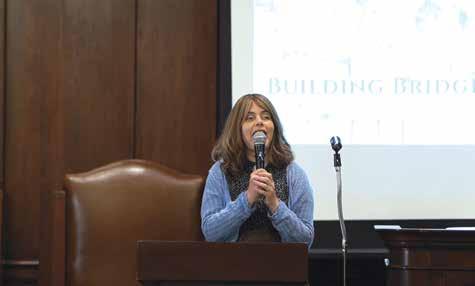


Approximately 700 women from across our neighborhoods gathered for an evening of chizuk and inspiration on Sunday night. It was an evening of unprecedented unity for the women of the community as all ages and levels of religious observance were present. The theme was shalom – appropriately held in Beth Shalom.
The evening flowed seamlessly. It opened with a beautiful slideshow and the singing of “I am an ancient wall of stone”
by the children of Camp Simcha. Tehillim was recited in unison led by Rebbetzin Rifky Freundlich. Opening words were shared by Mrs. Slovie Wolff introducing the speakers with her most touching sharing of her recent experiences in Poland. She was followed by Rebbetzin
Aviva Feiner, Mrs. Hadas Lowenstern (on video), Rabbanit Shani Taragin, and Mrs. Dina Schoonmaker (on video). All of them wove the theme of developing Ahavas Yisrael and the importance of shalom to bring us Mashaich Tzideinu!
The women concluded with singing Acheinu and Ani Maamin led by Rebbetzin Feiner, and the feeling in the room was amazing.
Everyone left very uplifted! Please read the touching words penned by someone who attended:
We are drawn to gatherings where the focus is “A Night of Chizuk” Or “A Night of Inspiration.”
But last night was something else. Something unique. It was a night of warmth. A night that touched us deep
down.
I looked around at the women in my vantage point. Some were wiping away tears. Some were nodding in acceptance and agreement. Everyone was fixated on the speakers. From the Tehilim to the Ani Maamin, the koach of the nashim tzidkanios prevailed. We ask what we can do? Last night was the answer. Come together. Connect with one another. And be present collectively to welcome Mashiach, b’mheira b’yameinu.


Prime Minister Binyamin Netanyahu wasn’t the only one in Washington on July 24 making the case on behalf of Israel. A distinguished delegation from One Israel Fund held a series of meetings with prominent elected officials to express the pro-Israel community’s gratitude for their steadfast support for the U.S.-Israel relationship. However, and even more importantly, it was to educate them on the vital importance of Israel maintaining control of the Heartland communities throughout Judea and Samaria as this is something, often times, glossed over by the other Israel organizations on The Hill as well as taking congressional delegations to Israel.
The delegation featured One Israel Fund president Jacqui Herman; board members Dr. Gary Applebaum, Dr. Irwin Azman and Eli Burman; Larry Rein, Phil and Margy Jacobs, Rochelle and Steve Battino; and executive vice president Scott M. Feltman.
The day began with a lively roundta-
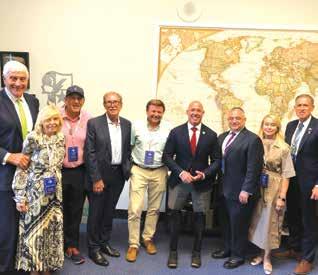
ble discussion over breakfast at the Capitol Hill Club followed by individual meetings on The Hill. In total, the delegation met with twelve lawmakers including Senator Pete Ricketts (R-NE); Congressman Don Bacon (R-NE); Congresswoman Lori Chavez-Deremer (R-OR); Congressman Anthony D’Esposito (R-NY); Congressman Chuck Fleischmann (RTN); Congresswoman Virginia Foxx (RNC); Congressman Nick Lalota (R-NY); Congressman Nick Langworthy (R-NY); Congressman Mike Lawler (R-NY); Congressman Brian Mast (R-FL); Congressman Marc Molinaro (R-NY) and Congressman Rudy Yakym (R-IN).
Each member has visited Israel numerous times yet never had the opportunity to visit the Jewish communities in Judea and Samaria. Scott and Jacqui offered each member the opportunity to join One Israel Fund for a day or more to visit the Heartland on their next trips which was met with great interest and anticipation. Many other officials expressed interest in


meeting with the delegation, but the day didn’t allow for additional meetings since the Prime Minister was speaking that afternoon to a joint session of Congress. Our own Jacqui Herman was given a “golden” ticket by Congressman Lalota to view the speech live while the rest of the delegation returned to the Capitol Hill Club to watch the speech together with many of the staffers on The Hill.
Betzalel Art Gallery is thrilled to announce its upcoming exhibition, “Tu B’Av: A Celebration of Love Through Art,” set to open on August 18 and run through October 7. This special exhibition will showcase a curated collection of artworks that explore and celebrate the themes of love, unity, and connection, in honor of the joyous Jewish holiday, Tu B’Av.
Tu B’Av, often referred to as the Jew-
ish Day of Love, is a time for celebrating romance, friendship, and the bonds that bring people together. In this spirit, Betzalel Art Gallery has brought together a diverse group of artists whose works encapsulate the multifaceted nature of love.
From abstract interpretations to vivid depictions, each piece offers a unique perspective on what it means to love and be loved.
Join us for the opening celebration on
August 18, from 11 AM to 2 PM. Guests are invited to enjoy brunch while experiencing the art that celebrates love in all its forms. Additionally, we are honored to welcome guest speakers Long Beach Police Commissioner Richard Depalma and Long Beach Chaplain Rabbi Benny Berlin, who will share their insights on community, love, and unity.
“We are excited to bring this vibrant and meaningful exhibition to our com-
If you would like information about future delegations to Washington with One Israel Fund please email scott@oneisraelfund.org, or if you are interested in learning more about the organization, please visit www.oneisraelfund.org or follow them on Instagram (@oneisraelfund) or Facebook (One Israel Fund).
munity,” said Michele Huttler Silver, Director of Betzalel Art Gallery. “Tu B’Av is a perfect occasion to reflect on and appreciate the connections we have with one another, and we hope this exhibition will inspire visitors to do just that.”
Betzalel Art Gallery is located at 70 East Park Avenue, Long Beach, NY. The gallery is open by appointment.
One of the most extraordinary things about Hillel Day Camp is the family we become over the summer. This sense of family grows in each group, blossoms across the organization, and extends far beyond our campgrounds on a global level. Our campers, hailing from various communities and schools, come together to forge incredible bonds that often last a lifetime.
We share in each other’s joy – celebrating simachot, personal achievements, and collective milestones. The laughter, camaraderie, and spirit that fill our days are a testament to the strong connections we build. Yet, as a family, we also stand by one another in times of sorrow. It is with heavy hearts that we acknowledge the passing of Rabbi Binyamin Hammer, father of our beloved division head, Meira Yagodayev. We wish Morah Meira and her family a swift and heartfelt nechama during this difficult time.
Our sense of family also guides our actions on a communal level. As we approached Tisha b’Av and navigated the

solemnity of the Nine Days, we paused from our usual activities to reflect and contribute to a greater cause. Last week, our “Swim for Israel” and “Swim for Each Other” campaigns took center stage.
During our annual Swim-a-Thon, campers have been enthusiastically raising funds to support vital organizations that help the Jewish people in Israel and provide opportunities for children to experience the joys of summer camp. At Hillel Day Camp, we are more than just a collection of individuals – we are a family that supports, uplifts, and in-


spires one another, every day of the summer and beyond.
Last week, Hillel Day Camp hosted a family evening of chesed and music at the Israel Chesed Center. Our Hillel families learned about what the Israel Chesed center does for Israel and for our chayalim, packed gear, and enjoyed the inspirational acapella tunes of Six13. Our G3s and G2s participated in a special mezuzah decorating event where they designed mezuzot and wrote letters for families in Israel.
Even through a week of rain, the fun didn’t stop! We had an exciting MINUTE
TO WIN IT! competition that focused on strategy, teamwork, and FUN hosted by our very own Rabbi Nissan! The exciting trips continued to Once Upon A Treetop, Adventure Park, United Skates of America, and Casa de Spin. We celebrated Israel Day, had scavenger hunts, and @fitkids.ny at @the.fit.studios came and held breakdancing workshops with our boys! We wish you a Shabbat Nachamu Shalom, and hope you had an easy fast, and a meaningful Tisha b’Av.
Follow the action throughout the week on Instagram @hillel_day_camp

A Conversation with Rabbi Paysach Krohn, renowned author and lecturer, and Rabbi Eliezer Krohn, rabbinic counselor for PUAH
By Gila Arnold
As Tisha B’Av approached this year, I’m sure I’m not the only one who struggled with a sense of hopelessness, a feeling of, “Will this ever end?”
After everything that’s happened?
After October 7? After the missiles, the war, the frightening resurgence of global anti-Semitism?
Weren’t we all so certain, witnessing our incredibly powerful achdus in the weeks following Simchas Torah, that this was it – that the Geula was coming?
Yet once again, here we were… sitting on the floor, mourning our state of Galus, crying for our tragedies, both new and ancient.
And now, once again, as we’ve done year after thousands of years, we wipe our tears, pick ourselves up, and stride forward. Continuing to fight, continuing to daven, continuing to hope. Nachamu!
In his new book, From Sorrow to Celebration: The Three Weeks, Tisha B’Av and Tu B’Av (Artscroll), Rabbi Paysach Krohn, the Maggid of our generation, zeroes in on this uniquely Jewish ability to find hope and optimism even in our pain.
I recently sat down for a conversation with Rabbi Paysach and his son Rabbi Eliezer, who, as rabbinic counselor for PUAH, sees this resilience every day on a very personal level, in the couples whom he guides on their fertility journey. The father-son pair shared their insights, inspiration and, of course, their stories!
Rabbi Krohn, was this sefer written in response to the events of October 7?
R’ Paysach: Actually, not at all. It was in the making well before Simchas Torah. Following the, baruch Hashem, successful publication of my Hagadah, At the Maggid’s Seder, which came out at the very beginning of Covid, Artscroll suggested I continue writing seasonal sefarim, with a mix of stories and inspiration. My next book was about Elul and the Yamim Noraim, and after that, we decided to write about the Three Weeks. However, I didn’t want to only write sad material, so I decided to expand it by including Shabbos Nachamu and Tu
B’Av. I also have a section about the Gedolim whose yahrzeits fall out during the Three Weeks. This book has turned out to be the biggest I’ve ever written!
This has been a year filled with tragedy and a frightening rise in global antisemitism, but also a year of many miracles. After everything that’s happened, there’s been a strong sense that the final Geulah must be about to come.
B’ezras Hashem, it will soon. Yet, here it is, about to be Tisha B’Av once again. How do we deal with that sense of disappointment?
R’ Paysach: The hallmark of a Yid –our special koach – is that we believe in the future. Sometimes that future won’t happen for a long time, but we believe that ultimately, the good will come.
There’s an unbelievable story in my book about Rebbetzin Roiza Tauber, the mother of Rav Ezriel Tauber, noted speaker and writer and dean of the Shalheves Seminars. In the early 1940s, knowing the Nazis were about to invade their country of Czechoslovakia, they went into hiding. Now, here’s the amazing thing: during their four years in hiding, from 1940-1944, Rebbeztin Tauber gave birth to four babies! Her friends and relatives all thought she was crazy; why would a Jew want to bring more children into such a world when the chances were all but certain that they’d be killed?
In fact, in 1944, Rebbetzin Tauber was caught and deported to Auschwitz. Because she was expecting, Mengele, ym”sh, decided to keep her alive for medical “experimentation.” Her baby was killed as soon as she was born; as Rebbetzin Tauber would say later, that little daughter had the zechus to save her mother’s life. Hearing that mothers after birth were sent to the gas chambers, Rebbetzin Tauber escaped from the hospital two days postpartum and miraculously survived. Her husband and four little sons survived as well.
While, like many survivors, she didn’t want to speak about her war experiences, when she was very elderly, her son Rav Ezriel asked her how she could have brought children into the world during this terrible time. Did she really think they would survive?
She answered firmly, “We are Yidden! We don’t lose children! Don’t you know about Techiyas HaMeisim? We bring children into the world not merely for
this world but for the future world. Every Jewish child is an eternity! Every neshama is forever!”
So when we look at the events that have happened this year, the main thing we need to hold on to is our emunah and bitachon. That a Yid can never give up.
That’s the message of Shabbos Nachamu and Tu B’Av coming directly after Tisha B’Av.
R’ Paysach: Absolutely. Listen to this beautiful story that happened to Rav Moshe Shapiro. The year was 1946, and he had recently gotten engaged. One day, he was walking with his kallah in a park in Yerushalayim, in back of the Reich hotel, when they encountered an older man with a beautiful, warm smile. The man came over to the chassan and kallah and said, “Be happy, kinderlach! You are the mashal for how Hashem will be happy! Yasis alayich Elokayich – Hashem will rejoice over us, His nation, like a chassan rejoices over his kallah.”
After he walked away, Rav Moshe said to his kallah, “Do you know who that man was? He’s the Ponovezher Rav. He lost everything in the Holocaust. Yet he came to Eretz Yisrael to rebuild, and here he is, on a mission to spread happiness in the world.”
Imagine! The Ponovezher Rav, who had every reason to give up, instead looked around him and saw hope. He saw a chassan and kallah and found there a mashal for Hashem’s love for His people!
Rav Eliezer, I’m sure you find a similar emotion with couples experiencing infertility. With every treatment their hopes are raised, maybe this time we’ll finally see our personal geulah, only to be disappointed. How do you help them deal with this disappointment while still retaining optimism for the future?
R’ Eliezer: As a PUAH counselor, I deal with all sorts of cases. There are the couples who call with a straightforward issue, I guide them to the right doctor and the right solution, and, baruch Hashem, they call a few months later to share the good news that they’re expecting.
But then there are the other cases. The couples struggling with a really tough situation who try again and again, only to experience one disappointment after another. Rav Chaim Soloveichik says that where hishtadlus ends, that’s where
bitachon begins. It can be hard to know where to draw that line, but it’s essential that we have both elements. I help couples make the right medical decision for their particular situation. I’ll say, “Listen, Hashem can do anything. He can make you have a child with this procedure or without it. But in my opinion, this is the proper thing to do.”
Even when they experience setbacks and failures, they need to know that they made the best decisions they could, following the best medical guidance, and that we’re davening for their success. That’s all that any of us can do; Hashem does the rest.
Whatever the area we may be struggling in – whether fertility, shidduchim, parnassa, shalom bayis – we have to understand that, while we need to put in a certain amount of hishtadlus, after that it’s our job to sit back and realize that it’s all up to Hakadosh Baruch Hu. Never stop davening, never stop hoping, because nothing’s impossible when it comes to a Yid. Particularly in my work, I’ve seen it time and again. A couple experiences another failed cycle, and another, and the next thing you know, she’s pregnant.
Rabbi Paysach: Rav Eliezer, who is also a mohel, has done many brissim for babies who were born thanks to PUAH’s counseling. How incredible is that! This is the epitome of the theme “From Sorrow to Celebration.”
What about the times when there really does seem to be no hope? What do you say to a couple if they reach the end of the line and have run out of options?
R’ Eliezer: Those cases are very tough. I’ve had many people cry to me over the phone, and it breaks my heart. Unfortunately, there is pain in life, and sometimes there’s nothing we can do about it.
The biggest gift I can give couples in this situation – and that we can give ourselves, if we find ourselves in such a circumstance, whatever our challenge may be – is to allow them to feel the pain, to understand that it’s okay to hurt, it’s okay to cry, and that we can continue on in life with the pain.
I’m there to listen, to cry with them, and also to alleviate any potential guilt by validating that they made the best deci-
continues on bottom of next page…

MTA has talmidim and alumni attending and working at various camps around the tristate area and Israel. It is always a highlight for the boys to be visited by MTA rebbeim and staff, who always show up bearing a summer swag gift and food! It is a great way to stay connected over the
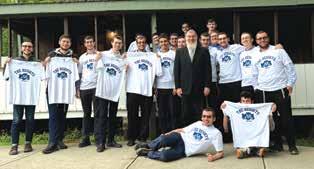
summer months.
This year, MTA gave out brand new dri-fit t-shirts with a new design that was very well received. Each visit presented the opportunity for MTA staff to bring food – ranging from doughnuts to Chickie’s – catch up with the talmidim and alumni, and see them at their sum-
This year’s Israel Day had an extra sense of meaning and purpose at Camp Kaylie. Israel day began with a powerful video introduction, featuring reflections from our upper staff and campers about what makes living in Israel so special. Their personal stories and emotional insights painted a vivid picture of the love and pride they feel for living in our homeland. The morning continued with a Chinuch session during which our campers wrote heartfelt letters to the chayalim, expressing their deep appreciation for the soldiers’ dedication and bravery. Our campers walked around camp all day wearing blue and white and holding Israeli flags, with the amazing day culminating with the Zimriyah. This year’s ceremony featured songs about Am Yisrael and Eretz Yisrael which each division sang their song under the expert guidance of Ms. Shaindy Plotzker. The campers sang their hearts out, creating an atmosphere filled with emotion and unity.
A particularly touching moment came
…continued from previous page…
sions they could and put in their best effort.
Can you leave us with one final thought to focus on as we emerge from Tisha B’Av into the Shiva d’Nechemta, the weeks of consolation? What is something that we can we do to bring Geulah?
Rav Paysach: Rav Schwab writes an

mer best. Even though school is not in session, it is important to keep up the kesher with everyone, as they are all #Lions4Life!
Pictured are some highlights from the camp visits, which include Kaylie, HASC, Dora Golding, Morasha Kollel and NCSY Kollel in Israel! In a few short weeks,

when the camp presented a gift to the Morell family, who are mourning the loss of their son, Maoz, z”l, who fell while fighting in Gaza. Moaz’s story is one of remarkable strength and determination.
Campers learned that his inner resilience traced back to his great-grandparents, who had to put their children into hiding to survive the horrors of Nazi Germany.
This legacy of courage and fortitude was a source of inspiration, highlighting the enduring spirit that runs through the Morel family. Head Counselor Mrs. Tova Pola-
astounding idea in his sefer, Rav Schwab on Prayer, which I quote in my book. Every day, we ask Hashem to bring Moshiach with the words “Es tzemach David… tatzmiach” – may You cause the offspring of Your servant David to flourish. Chazal explain why the Geulah is compared to the flowering process – because a plant doesn’t grow overnight. It’s a long, slow
the big brass doors will be opened, and hundreds of talmidim will fill the building once again. MTA staff eagerly awaits the beginning of the school year, while still relishing the last bits of the summer break.

koff presented the gift, a painting with the pasuk: “Hashem oz l’amo yiten, Hashem yivarech et amo ba’shalom” to Mrs. Morell who shared that “Hashem should hear the tefilla and shira of Zimriyah and bring us the ultimate shalom.”
Mrs. Morel thanked the Kaylie family for welcoming them into camp and allowing them to gain chizuk from sharing the story of their son Maoz. She shared, “Maoz was a great hero. If you met him, you would think he was a regular kid. Only those of us who took the time and
process. And, Rav Schwab adds, a plant doesn’t grow on its own; it needs water. Where’s the water for Moshiach? Our tears.
How sad is that? Think about it. How many people, when they daven, cry because they want Moshiach? We cry for parnassah, we cry for shidduchim, we cry to have children, we cry that we should
got to know him got to see what a special person he was. There is a message leading up to Tisha B’Av. The Beit Hamikdash was destroyed for sinas chinam. If we spend the time and get to know someone and their inner world, then we can have ahavat chinam. What I have seen in Camp Kaylie is that is what you are learning here. You get to know people for who they are on the inside. Thank you very much for having me here.”
raise our children properly…but who cries about Moshiach?
Cry for Moshiach! That’s how we water the plant! What an insight…and what a responsibility.
















JGreenstein and Company will be selling the lifetime collection of American Folk Art wooden Torah ark lions and graphics of Daniel Levinson. The Daniel Levinson Collection
In Loving Memory: Daniel Levinson (1938–2024): Born in 1938 in Brooklyn, New York, Daniel was the son of Polish immigrants who sought a better life in America. His upbringing instilled in him a strong work ethic, resilience, and a deep appreciation for Jewish heritage.
As a young man, Daniel felt a calling to serve his country. He joined the United States Navy, dedicating himself to defending freedom and democracy. His commitment to duty and honor left an indelible mark on those who served alongside him. But perhaps Daniel’s most profound passion was his unwavering Zionism. He believed in the dream of a Jewish homeland—a place where his people could thrive, celebrate their traditions, and contribute to the world.
After serving in the United States Navy, Daniel felt a calling to make Aliyah to Israel—a journey that would shape the rest of his life. In the land of his ancestors, he found love, raised a family, and contributed to the vibrant tapestry of Israeli society; his two boys served as officers in the IDF. Daniel’s love for Russian and Jewish history was unwavering. He immersed himself in the stories, struggles, and triumphs of these rich traditions. His passion extended beyond books; he collected Judaica artifacts, cherishing each piece as a bridge between generations. Each mezuzah, menorah, and Torah scroll held significance, a bridge between generations and a testament to faith. His collection was more than objects; it was a testament to resilience, survival, and hope. Daniel touched the lives of many, leaving behind a legacy of love, courage, and intellectual curiosity. May his memory continue to inspire us all.
Jonathan Greenstein said, “I met Danny in the 1990’s in the 27th Street flea market in Manhattan’s Chelsea market. We bonded over our mutual love and admiration for antique Judaica and remained friends until his passing. He

would come visit me in my Brooklyn office to sell me kiddush cups, and for dozens of years, my staff loved him as this sweet and hilarious man. His weekly calls would always start the same way, ‘How you doodle?’ and end with him screaming about the unfair coverage Israel was getting in the media. His love for Israel and the soldiers of the IDF knew no bounds. He had no greater mission in life than to dedicate himself and his endeavors to the welfare of the Israeli soldiers. Whenever we would negotiate over a piece, he would always say, ‘It’s going to the soldiers,’ and I knew it held true.
“The Greenstein family, Abe, as well as the entire Judaica collecting community, will forever miss his wit, his humor, his boundless energy and capabilities and his unwavering defense of the Jewish state. If there was social media in his time, he would have been the king.
“I’m proud to represent his collection.”
The entire auction can be viewed at jgreenstein.com.
Where: 417 Central Avenue, Cedarhurst, NY 11516
When: September 10, 2024 at 12:00 noon
















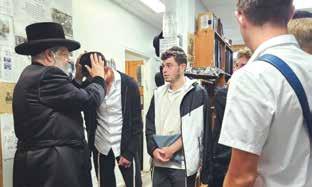

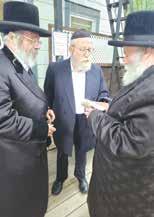

Dr. Fraidy N. Maltz, BS, PharmD, BCACP, of Woodmere, was named Assistant Dean of Student Affairs & Administration at Touro College of Pharmacy (TCOP). Maltz served as Director of Student Engagement, Developmental Portfolios and Co-Curricular Learning for the past two years. She led TCOP’s co-curricular program, promoting student involvement in on-campus activities and community events and serving as an advisor to the Student Government Association and student organizations.
In her new position, Dr. Maltz will be TCOP’s Chief Student Services Offi-
cer, supervising student services, mental health counseling, disability services, and serving as TCOP’s liaison to the Library, Bursar, Financial Aid, Security, Student Insurance and more. She will oversee administrative operations and functions at TCOP and will continue as an Associate Professor in the Department of Pharmacy Practice.
“As Assistant Dean of Student Affairs and Administration, I am looking forward to working with TCOP students to address their individual needs, to promote their well-being and to provide them with the support and opportunities they need to achieve great success both academically and professionally,” said Dr. Maltz.
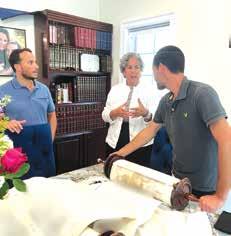
New York State Assemblywoman Stacey Pheffer Amato joined in celebrating the news that a stolen Sefer Torah had been recovered. Thieves had broken into a local yeshiva a few months ago and made off with the Torah. Through ongoing efforts between the NYPD Major Case Squad, the 101st Precinct, along with dedicated members of the Rockaway Nassau Safety Patrol (RNSP), the investigation persisted and finally resulted in an arrest and rescue of the Torah.
Prior to the arrest, the police had relayed to Assemblywoman Pheffer Amato that they had a suspect and were closing in on the investigation. Criminal charges have been filed against the man arrested.
“Pharmacy is a versatile profession that offers numerous career paths. In addition to working in community pharmacies or hospitals, pharmacists can specialize in clinical areas such as ambulatory care, critical care, oncology, infectious diseases, and pediatrics, with individualized board certification. Other career pathways include working in the pharmaceutical industry, in managed care and long-term care. I hope to help prepare our students for any of the exciting career paths in pharmacy that they choose to pursue.”
Dr. Maltz earned a Bachelor of Science in Pharmacy summa cum laude and her PharmD from the Arnold & Marie Schwartz College of Pharmacy and Health Sciences of Long Island University, where she was selected for membership in the Rho Chi Honor Society and Phi Lambda Sigma Pharmacy Leadership Society. Before coming to TCOP, Dr. Maltz had two decades of teaching experience at

“This remarkable achievement is a testament to the dedication and perseverance of our law enforcement. All of us owe a debt of gratitude to the NYPD and RNSP for their tireless efforts that ultimately led to the recovery – as this collaboration between law enforcement and the community is a powerful reminder of what can be achieved when we work together towards a common goal,” said Assemblywoman Pheffer Amato.
The Assemblywoman went to visit the Torah which is currently being cared for by RNSP. According to RNSP, about 10 Torah portions were damaged and are in the process of being repaired by Rabbi Oppen.

LIU Pharmacy. She has also served as a clinical pharmacist in the community pharmacy practice setting, where she ran disease state management programs and performed medication therapy management. Her recent research interests have focused on student learning. Dr. Maltz is a member of several professional pharmacy associations and is board certified in ambulatory care.

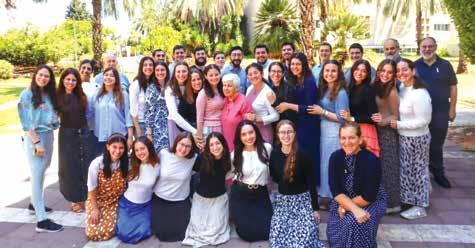
Five Long Islanders are among 29 college undergraduates participating in the 14th annual Summer Science Research Internship Program. A joint Bar-Ilan University (BIU)-Yeshiva University (YU) initiative, the program enables students to gain hands-on experience in emerging scientific fields while being mentored by Israel’s finest scientists.
This year’s cohort is comprised of students from Yeshiva College, Stern College for Women, Columbia University, Cornell University, Rutgers University, The Cooper Union, Queens College, Brooklyn College, Touro College, Lander College, and the State University of New York at Binghamton. Among them: Hannah Zahler from West Hempstead, Blimy Dresdner from Brooklyn, Betzalel Cohen from Far Rockaway, Lilly Glickman from Woodmere and Ruben Prawer from Great Neck.
During the seven-week research experience, the students conduct intensive internships in STEM research with faculty members from BIU’s Institute for Nanotechnology and Advanced Materials, Gonda (Goldschmied) Multidisciplinary Brain Research Center, Alexander Kofkin Faculty of Engineering, Mina and Everard Goodman Faculty of Life Sciences, Faculty of Education, and the Departments of Mathematics, Chemistry, Physics, and Psychology.
The program also includes one-day enrichment trips to sites around the country. This year’s itinerary has included visits to the Teperberg Winery, Israel Aerospace Industries, the National Library and the Volcani Institute for Agricultural Research. This year has also
included a visit to the sites of the October 7 massacre: Re’im, where the Nova Festival took place, and Tkuma, which features an exhibition of destroyed cars, the city of Sderot, and more. One farmer the group met explained how the terrorists breached the border and stormed into Israel that day. The program also includes lectures by BIU scholars on a wide range of topics, as well as night activities, Torah learning, and Shabbatonim at YU’s Gruss Institute in Jerusalem, where the group is housed.
In Prof. Hillel Kugler’s lab at the Kofkin Faculty of Engineering, Hannah Zahler, of West Hempstead, and Blimy Dresdner, of Brooklyn, have learned the foundations of the reasoning engine, a computational toolset that enables to automatically construct gene regulatory networks that are consistent with biological experiments and data. The tool has recently been used to develop a state-ofthe-art computational model of embryonic stem cells.
To further improve and evaluate the performance of the reasoning engine, a code was developed in the project to connect the reasoning engine to a cutting-edge repository of Boolean Networks, paving the way to evaluate the synthesis algorithms in the reasoning engine on a wide set of realistic biological models.
“We’re working on a code that takes files from the repository and converts them so they can be imported into the reasoning engine and analyzed, focusing on the computer science and coding
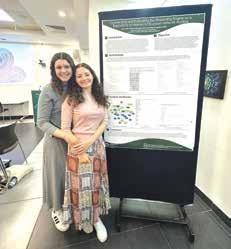
aspects of the research,” says Zahler, a computer science major at Queens College. “We’re learning a lot from Hillel and his PhD student Eitan Tannenbaum, and Blimy and I are also learning a lot from each other, exchanging knowledge from what we’ve learned in college and from past experience,” adds the 21-year-old, who is planning a career in software engineering.
Dresdner couldn’t agree more. “I didn’t imagine research being this fun. Working with Hannah to figure things out, work through ideas and bounce them off each other has been an incredible experience,” says the computer science student, who’s entering her third year at Brooklyn College.
For Dresdner, being in Israel at this particular time has been very meaningful. “Things seem scarier and more intense when you see what’s happening from America. But being here I’ve seen faith shining through. People aren’t afraid and they go about their daily lives. For my part, I’m happy to support Israel in any way I can during this time, whether by buying goods or touring the country and visiting different sites.” In general, she says no matter where the group has visited, they’ve had great fun over the past seven weeks.
Previous participants in the program told Zahler they had the best summer of their lives on the summer science program, but she didn’t understand what they were talking about until she experienced it herself. “It’s amazing how friendly and inclusive everyone is. I didn’t know anyone in the group coming in and everyone broke me out of my shell. It was just a
great summer,” she concludes.
“One of the Best Experiences of My Life”
Betzalel Cohen, of Far Rockaway, has been involved in a number of research projects, one of which will make a meaningful impact on Israel’s ability to detect enemy aircraft.
Prof. Dror Fixler, of the Kofkin Faculty of Engineering, placed Cohen on a unique project aimed at tackling one of the greatest challenges to the IDF since the outbreak of the war: invisible unmanned aerial vehicles (UAVs) that carry no electromagnetic signature. Fixler’s group built an innovative optic system involving a combination of high-powered cameras that can detect certain phenomena created by UAV’s in flight. The prototype was recently presented to the Administration for Research, Development of Weapons and Technological Infrastructure (known in Hebrew by the acronym MAFAT) in the Ministry of Defense. “The prototype that Betzalel helped build and activate is going to be a big project that we will be collaborating on with MAFAT,” says Fixler.
In addition, Cohen performed blood pressure measurements using a new technology developed by Fixler, as well as blood oxygen saturation measurements using another relatively new method, and worked on another project aimed at detecting water pollutants. “Betzalel has been amazing. He is very driven, always looking to do more, and has done a lot of work in the lab,” says Fixler.
“In school I never felt that any of the material I was learning would have real-world use, but being in the lab and utilizing all I know is the first real evidence that I’ve learned something practical,” says the 22-year-old Cohen, who’s entering his fourth year as a pre-engineering major at Yeshiva University. “I feel like I’m really making a difference with all the different projects I’m doing. It’s quite incredible and I’m surprised at how much I’m capable of doing at this stage. I thought at most I’d be getting people coffee this summer and I’ve been very pleasantly surprised.”
Advancing AML Research
Lilly Glickman, of Woodmere, has been working in Dr. Binyamin Knisbacher’s lab at the Goodman Faculty of Life
continues on bottom of next page…
By Chaya Feldstein
Be My Guest opened its doors in December 2023 and has raised awareness about the great mitzvah of hachnasas Orchim. Its goal remains the same; to seek out friendship with those we know, sit next to in shul, neighbors on the block, people we shop with in the grocery. Those people put a smile on their face and are put together, well dressed, despite their aloneness, which could be divorce, widowhood or singlehood or even someone who may have family but their family doesn’t know how to connect as family should.
The Chofetz Chaim in Sefer Ahavas
Chessed points out, “Chesed, however, is not just money. One reason the Talmud declares chesed to be superior to charity is because with charity, one gives only money; with chesed, one may give his physical effort as well. Of all the areas in which one may extend oneself in chesed, hospitality to guests — hachnasas orchim — is considered the ‘crown jewel.’” (Loving Kindness, Day 126 - Abraham’s Tent)
In the heat of the summer, long, sunny days, and vacation time, there are so many who find this time to be totally the opposite of fun and joy. Aloneness is what Yerushalayim feels and each person going through this horrific exile. There are some who may feel even more alone
because in reality they don’t reside with another person, and major bracha pours down when alleviating just a tiny bit through empathy. Empathy feels like a warm, wholehearted invitation. A phone call early in the week, “We’d love to get to know you better. Can you join us for a meal this Shabbos?”
To listen to the inaugural address by Rabbi Paysach Krohn, shlita, “Be My Guest, Hachnosos Orchim The Way it Ought to Be” https://www.torahanytime.com/#/lectures?v=271912 or by phone 718-298-2077 Press 9 and class ID 271912 then #. For more info and to become an ambassador in your shul, please email bemyguest@whiteshul.com.

The BACH Jewish Center’s Youth Department hosted a special Sunday Fun Day Duct Tape Daddy Art Class. The event was part of the BACH in Long Beach’s weekly series of youth events during the summer.
Ohel Children’s Home and Family Services recently unveiled the newly renovated Kleinman Family Ohel Regional Center, expanding the space to accommodate the growing needs of local youths and their families seeking mental health services. The updates were made possible through grants from the New York State Office of Mental Health and generous donors, including Deena and Marvin Nagler, helping Ohel to deliver affordable and quality mental health care.
“Our goal is to provide a children’s center of excellence, allowing young people access to best-in-class clinical mental health therapists and experts who can offer the necessary support and resources,” said David Mandel, CEO of Ohel. “Ohel is well known as a training
…continued from previous page…
Sciences. Focusing on computational cancer genomics and immunogenomics, the Knisbacher lab develops and applies computational tools to study DNA and RNA aberrations that drive cancer and how these produce novel therapeutic opportunities. The lab uses bioinformatics and machine learning methods to characterize alterations in cancer cells and advance precision medicine for cancer patients.
Glickman has been working on applying a computational workflow developed in the lab to a large dataset of RNA sequencing from Acute Myeloid Leukemia
institute, and we employ several of the country’s top mental health experts who use evidence-based models to meet the social and emotional needs of all our clients, ideally at the onset of any incident or potential trauma. We are committed to serving the broader community and launching new programs as needs evolve.”
The centrally located outpatient center has owned a presence in Far Rockaway since 2009 and supports a range of mental health conditions, including anxiety, depression, family issues, and mood disorders. Over the years, the center’s young clientele has grown substantially. Now, the center has approachable and inclusive features, such as updated waiting rooms and seven child-friendly treatment offices filled with toys, art supplies,
(AML) patients. Her work will enable the lab to explore this blood cancer, which hasn’t yet been studied in the lab. The goal of her project is to help provide insights into mechanisms of AML development, improve molecular subtyping of the disease, and identify clinically-relevant RNA biomarkers, with the overarching goal of advancing precision medicine.
Glickman, 20, is a rising senior majoring in biology at Stern College. With future plans to make aliyah and a strong interest in science and research, she thought the BIU-YU program would be a perfect way to test the waters. “The com-
and more.
Later this year, Ohel will launch an early childhood mental health program for younger children, starting with infants and continuing through age six. The program will offer a perinatal therapist at its Brooklyn headquarters, with plans to extend these services to the Far Rockaway Center. These services will differ from current programs typically serving children between seven and eighteen. Participating therapists will also be trained and supervised by Dr. Norman Blumenthal and Dr. Chaim Neuhoff.
Raizel Keilson, clinical director of children’s services at Ohel Tikvah, noted, “We want to eliminate unnecessary stress and empower parents to recognize the signs and symptoms that may require a child to receive a mental health consult or intervention.”
“The center offers a range of services and treatment, making it convenient for parents and minimally disruptive for their children,” added Miriam Simon, clinical director at Ohel Tikvah, Beach 9th Center.
The Kleinman Family Ohel Regional Center serves a diverse population and is located at 156 Beach 9th Street (second floor) in Far Rockaway. The center accepts various insurances and offers clients a sliding scale. For more information or to schedule a consultation at The Kleinman Family Ohel Regional Center, call 718-851-6300.
bination of working in a lab, adjusting to everyday life and culture in Israel, and doing the job I envision has been amazing and provided a very realistic picture for the future,” she says.
In the lab, Glickman enthuses about the meaningful assignments she received. She learned practical research skills, such as coding, and she’s particularly pleased with the general functions she created that will regularly serve lab members going through data sets. On a personal level, she developed a wonderful rapport with those in the lab and the MA student she worked closely with gave her lots of per-
sonal and career-related advice.
Glickman is thrilled with the program in general. About her fellow participants, she says, “These are people I’ve just met and seeing their creative side, the way they volunteer for our activities every night and go above and beyond to make the summer what it can be, is amazing,” she concludes, adding, “I love being in Jerusalem. There is nothing like it.”
The program is generously funded by the late Dr. Mordecai Katz OBM and Dr. Monique Katz, the Irving I. Stone Foundation, and the Zoltan Erenyi Fund.
In one of the most famous parables in Gemara (Berachos 61b), Rabbi Akiva articulated for all time the indispensable relationship between Klal Yisrael and the study of its Torah.
The Rabbis taught in a Baraisa: Once, the evil regime decreed that the Jewish people should not study the Torah. Papus ben Yehuda came and found Rabbi Akiva convening public assemblies and engaging in Torah study. [Papus] said to him, “Akiva, are you not afraid of the regime?” [Rabbi Akiva] replied, “I will offer you a parable. To what can this be compared? To a fox walking alongside a river, who saw fish gathering from place to place. [The fox] said to them, ‘What are you running from?’ They said to him, ‘From the nets people are bringing to [catch] us.’ He said to them, ‘Is it your wish to come up to dry land, and we shall dwell together as did my ancestors with your ancestors?’ They said to him, ‘Are you the one they describe as the cleverest of animals? You are not clever but a fool! If in the place that gives us life we are afraid, the place that will lead to our deaths (should we not be afraid) all the more so?’
“So too with us. Now, as we sit and en-
gage in [the study of] Torah, of which it is written (Devarim 30:20), ‘For it is your life and the length of your days,’ we are endangered, if we were to disengage from Torah, all the more so!”
The fish rightly mocked the fox’s recommendation. How would it benefit them to go to a place where they could not breathe and would surely perish? But we are left wondering why the alleged wisest of animals presented so spurious an argument in the first place?
An observation by Rabbi Eliyahu Lopian (Lev Eliyahu, first edition, page 40) may provide an approach. The Mishnah in Keilim (17:13) teaches us: The Torah states that utensils and garments are susceptible to tumah. But because the word beged, garment (of cloth), which the Torah uses to refer to materials that grow on land, such as flax, cotton, or wool, is juxtaposed to the word ohr, leather, we derive that only a utensil or garment made from the hide or skin of a land animal can contract tumah, but an item made from the skin of a fish will not. Rabbi Akiva, however, notes that there is an exception: A leather utensil made from the skin of the creature known as the sea dog, which
flees to the land to escape danger, is susceptible to tumah. Rabbi Lopian questions the reasoning. Is it not true, he asks, that even the sea dog can survive on land only briefly? It may flee there to escape danger, but if it wishes to survive, it must return to its true, natural habitat! Should it not then be classified as a water creature?
His answer is an enlightening mussar thought. The fact that the sea dog turns to the land for deliverance — even a temporary one — is enough for us to determine that it is not a true denizen of the sea. The lesson is that the Jewish people are no different. Torah is the air we breathe. If, during hard times, we abandon it, even if we intend to do so for a short while or to some limited degree, we are detaching ourselves from our source of life and are doomed.
Perhaps, then, the fox said to the fish, “Come to me on the land where I will provide you with a temporary haven from the fishermen’s nets. I’ll place you in a pond or an aquarium where you can survive in the interim. I will return you to the water once the danger has passed.”
The fox’s assurances did not fool the

It was one of the most meaningful Avnet experiences of the summer when over 150 campers, parents and staff volunteered at the Israel Chesed Center. There was a true feeling of achdut as the group gathered for Avnet’s first-ever “Avnet Family Night of Chesed” to immerse themselves in helping their brothers and sisters in Eretz Yisrael. After watching a short video about the Israel Chesed Center’s incredible initiatives, it was time to get busy. There was much to do including packing a variety of supplies, decorating personalized cards, and
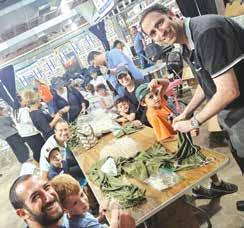
tying tzizit for the chayalim. In the midst of the Nine Days the message of the evening was really about being part of the community of Klal Yisrael.
“We wanted to invite parents to share this moment with their children, so our campers understand that even at a young age they have the privilege of playing an active role in Am Yisrael,” said Daniel Stroock, Camp Director.
In addition to the family night at Israel Chesed Center, there have been daily opportunities to show kindness and good deeds across all divisions. In

fish. They realized that his true intentions were to devour them immediately. The lesson Rabbi Akiva wished to impart is that any suggestion that we deviate even slightly or temporarily from Torah, our true-life source, must be seen for what it is: national suicide.
Reprinted from Rabbi Akiva by Abie Rotenberg with permission from the copyright holder, ArtScroll Mesorah Publications.

Chinuch, there were discussions of the concept of “ahavat chinam” spreading unconditional love to counteract the “sinat chinam” baseless hatred that exists in the world. Many campers have been writing letters and tying tzizit for the chayalim as well as making bracelets for the children of displaced families. Avnet also recently held a challah bake, in light of the heightened tensions in Israel, where the children davened for the safety of the soldiers.
“The situation in Israel really set the tone of the importance of unity in all of
Avnet’s programming this summer. We set out to make it educational and we want our campers to grow in middot,” added Ilana Mann, Program Director.
The Israel Chesed Center welcomes visitors of all ages, and there are many opportunities to get involved. Contact Israelchesedcenter@gmail.com for more information. Along with the Center’s ongoing, critical campaigns there is a special link to donate through Avnet –https://charidy.com/icc.gear/Avnet.


“People have got to know whether or not their president is a crook. Well, I’m not a crook.” - At a November 17, 1973 news conference
“I would have made a good Pope.”
“When the president does it, that means it’s not illegal.” - In a 1977 interview with David Frost

“I was not lying. I said things that later on seemed to be untrue.” - Reflecting on the Watergate scandal in 1978
“I urge the Congress to join me in mounting a major new effort to replace the discredited president.” - During his 1974 State of the Union address at the height of the Watergate scandal, fumbling a line in which he meant to say, “replace the discredited welfare system”
The new UPS man delivering a registered package needs a signature so he rings the doorbell. Chana sticks her head out of the second floor window and says, “Nu, what is it?”
“I have a registered parcel for Mrs. Goldberg,” he replies.
“Is it wrapped in fancy gift paper or just plain brown paper?” Chana asks.
“Ordinary brown paper, ma’am,” replies the UPS man.
“So who is it from?” Chana asks.
“It’s from Macy’s department store, ma’am,” he replies.

“This is a great day for France!” - At the funeral of French President Charles de Gaulle in 1970, while speaking in French
“I would not like to be a Russian leader. They never know when they’re being taped.” - (Nixon knew he was being taped because he was taping himself, yet forgot about the tapes and said things which led to his incrimination in Watergate)
“I want to make sure he is a ruthless son of a [gun], do what he’s told, that every income tax I want to see I see, that he will go after our enemies and not our friends. Now it’s as simple as that. If he doesn’t, he doesn’t get the job.” - Discussing appointing a new IRS commissioner
“Does it say which store?” Chana asks.
“Yes, ma’am,” he replies, “It says that it’s from the Union Square store.”
“Does it say what’s in it?” Chana asks.
“It says it’s from their jewelry depart ment,” he replies. “Will you now come down and sign for it, please?”
“Sorry,” Chana replies, “I can’t do that.”
“Why not?” asks the UPS man.
“Because,” Chana replies, “I’m Chana Cohen. Mrs. Goldberg lives next door.”


1. What was the Watergate?
a. A water pollution facility
b. A hotel/office complex
c. A government building
d. A data mining company
2. The five men arrested in connection with the Watergate break-in all belonged to which organization?
a. Campaign to Re-Elect the President (CREEP)
b. Republican Party
c. Democratic Party
d. Republican Campaign Committee
3. The Watergate break-in took place before the 1972 election, when Nixon’s team was trying to get an edge on their opponent, George McGovern. Which portion of the total 537 electoral votes did each candidate get?
a. Nixon, 270 / McGovern, 267
b. Nixon, 320 / McGovern, 217
c. Nixon, 425 / McGovern, 112
d. Nixon, 520 / McGovern, 17
4. Why did Vice President Spiro
T. Agnew resign during the Watergate investigation?
a. Because he orchestrated the break-in
b. Because he did not want to be part of a corrupt administration
c. Because he was charged with bribery and tax evasion
d. Because he wanted to forever be part of Watergate trivia
5. On what basis did President Nixon argue that he shouldn’t have to hand over the White House tapes?
a. The Right to Privacy
b. Executive Privilege
c. Due Process
d. National Security Concerns
6. How was the burglary on the Democratic National Committee’s office uncovered?
a. Nixon’s campaign started using information that only the DNC had, which led to an investigation which uncovered the burglary
b. One of the burglars told his friend and the friend went to the press
c. The burglars were seen on videotapes, which were present in various parts of the DNC’s offices
d. The burglars used tape to hold open the latches on door locks, and a sharp-eyed security guard saw some tape which was left there and called the police
7. In his last hours in office, President Nixon was consoled by an aide who told him history would judge him more kindly than his contemporaries had. Nixon replied, “That depends on who’s writing the history.” That aide was:
a. a. Alexander Haig

b. Henry Kissinger
c. John Dean
d. Gordon Liddy
Answers
1) B-The Democrats’ campaign headquarters were located in the Watergate, which was a hotel/office complex.
2) A
3) D
4) C- Spiro Agnew’s crimes were unrelated to Watergate and the charges were the result of an investigation into actions he took while still governor of Maryland.
5) C
6) C
7) B
6-7 correct: Are you Bob Woodward by any chance?
3-5 correct: Not bad—you know a modest amount about the biggest presidential scandal in history. (Now go back to your iPhone and Candy Crush.)
0-2 correct: I hear you are deeply entangled in your own scandal: NotRealBright-gate



By Rabbi Berel Wein

This Shabbos is Shabbos Nachamu, the Shabbos that begins for us a cycle of comfort and consolation after the weeks of sadness and mourning over the past tragedies of the Jewish people. These next seven weeks of healing comfort will lead us into the bright, new year that awaits us.
In this week’s parsha there is to be found, so to speak, the short course and synopsis of all of Judaism – the Ten Commandments, the Shema and the explanation of the Exodus from Egypt to be given to the wise son. In a general sense, the entire structure of Torah and Jewish life is encapsulated for us in the parsha of the week. Since this Shabbos is invariably also Shabbos Nachamu, it is not difficult to see that the Torah is teaching us that comfort and consolation are spiritual values and attainments and not necessarily dependent upon material wealth or worldly success. Our society, so rich in material goods and advanced technology, suffers greatly from all sorts of mental and social dysfunction. Depression is the “black dog” (Churchill’s
words for his recurring bouts of depression) that affects over a third of the citizens of the Western world! True comfort and serenity within human beings are difficult to achieve and most precarious to maintain.
us a structure of belief and morality that every individual can aspire and ascribe to, no matter how decadent the society in which one finds oneself enmeshed in. The moral strictures that protect life, property and person are the basic rules
It is not difficult to see that the Torah is teaching us that comfort and consolation are spiritual values and attainments and not necessarily dependent upon material wealth or worldly success.
The Torah in this week’s parsha, in order to help and guide us, gives us a formula to achieve this elusive goal of contentment. And it lies within the parameters of those three principles of Jewish faith outlined in the parsha of the week. The Ten Commandments create for
of Jewish faith and life. The dysfunction between parents and children, a 24/7 commercial world, accepted robbery and corruption as a social norm, daily murders and a completely immorally dissolute society – how can one avoid being depressed in such a milieu? All
of civilization teeters on the fulcrum of those Ten Commandments. They point the way out of the social morass that sucks us down to destruction.
The Shema is the vehicle of connection of our soul with the Creator Who fashioned us and gave us life. The belief in the one and universal G-d Who rules and is omniscient and omnipotent is the greatest gift of the Jews to the human race. It gives us discipline and security, purity and nobility, the whiff of immortality and the security in knowing that life is never in vain.
And finally, the understanding of the uniqueness of Israel in G-d’s scheme of things, as represented in the story of the Exodus from Egypt, gives structure and perspective to our national and personal lives. But it takes wisdom and knowledge – a wise son – to appreciate and treasure this memory of the distant past. Memory alone can also give us a sense of comfort and well-being and contribute towards the consolation and contentment we so ardently seek.
Shabbat shalom.


By Rav Moshe Weinberger
Adapted for publication by Binyomin Wolf

There is a beautiful Midrash on the parsha (Sifri, Devarim 36). In it, Chazal say, “The Jewish people are so precious that the Torah surrounded them with mitzvos: tefillin on their heads, tefillin on their arms, mezuzos on their doors, and tzitzis on their garments. Regarding them Dovid said, ‘Seven in a day I praise You for Your righteous statutes’ (Tehillim 119:164).”
The pasuk quoted by the Midrash refers to the fact that Dovid HaMelech was inspired to praise Hashem seven times a day for the seven mitzvos that surround His children as a sign of how precious they are to Him: four tzitzis on their garments, tefillin on their heads and arms, and a mezuzah on their doors.
The Midrash then continues with a well-known story about Dovid HaMelech, “He entered the bath house and saw himself naked. He said, ‘Woe that
I am naked of mitzvos!’ He then gazed at the sign of the covenant on his flesh and began to arrange his praise [after leaving the mikvah], as the pasuk (Tehillim 12:1) says, ‘For the conductor, on the eighth, a song of Dovid,’” a hint at bris milah, which is done on a baby’s eighth day of life.
What exactly happened to Dovid HaMelech in the mikvah? What was the nature of the epiphany he had there? He certainly wasn’t embarrassed by the fact that the other people in the mikvah “caught” him without his tefillin and tzitzis on. First, that is the nature of the place and what everyone would expect. Second, as he was the king of the Jewish people, when he entered the mikvah, everyone else certainly left as soon as he arrived!
Aside from the fact that Hashem told us to, why do we wear tefillin and
tzitzis and put mezuzos on our doors? We bind tefillin on our heads and our arms to remind us to bind our minds and actions to Hashem’s will. Wearing tzitzis remind us, wherever we go, of the mitzvos. And the mezuzah reminds us, before we leave the house, to remember Hashem’s will in all the choices we make as we journey out into the world. They stand as reminders to awaken our minds to remember our connection to Hashem and His will – “seven in a day I praise You.”
But Dovid HaMelech was bothered by the question: What happens if all of the reminders that keep my actions and thoughts in the right place are removed? What is left of me? Do I still have a connection with Hashem? Is it all external? Do I have an essential connection with G-d? How have all of these reminders affected my essence, if at all? Perhaps
this question is what caused Dovid to cry out, “Woe that I am naked of mitzvos!”
It is so easy for us to allow Yiddishkeit to be reduced to one long string of reminders and signs without any change in the nature of who we are, what we want, or the nature of our consciousness. One’s entire Jewish life may only be defined by one’s rebbe, morah, family, shul, yeshiva, and the checklist of Jewish activities one engages in on a daily, weekly, or yearly basis. These signs of Hashem’s love surround us on all sides and are wonderful. But does the way we rely on them make us into empty shells? What are we without them? Have they changed us on the inside?
How does one act when he is naked of mitzvos? When all the reminders are somewhere else and something pops up on the screen on a person’s phone, even
unintentionally, what does he do? What is left when he is stripped of every external reminder and motivator to keep him or her on the straight and narrow? Is he still connected to Hashem and his Yiddishkeit?
Perhaps Dovid HaMelech’s fear at that moment in the mikvah was about what happens when one takes away all of his external badges of Divine service, when he was truly naked of mitzvos, disconnected from everything outside of himself. He was worried whether, after removing all of the “means” in his life, whether the “ends” had become part of his essence.
What was his epiphany? He realized that the part of him which was always covered, which was most private, the part of him so internal that it was part of his very flesh, had never left him. “This is My covenant which you shall observe, between Me, you, and your children after you: circumcise for yourselves every male” (Bereishis 17:10). This hidden sign of “My covenant” is the symbol of the relationship between the Jewish people and Hashem because it is invisible. It cannot serve to jog the memory. It only exists as part of our essence. That was
his comfort and the subject a new chapter of Tehillim.
What does it mean to be so connected to mitzvos that one feels connected even when he is stripped of everything in this world, both physical and spiritual? I once read about a Gerrer chassid who was interred in one of the concentration camps. Because he had violated
ing the flesh.
When the Nazis threw this Jew into the pit to die, with everyone else looking on helplessly, he cried out: “Master of the World! I stand here naked before you.” And because it was Sukkos at the time, he continued:
“You commanded me to take an esrog, but I have no esrog. You say that
What happens if all of the reminders that keep my actions and thoughts in the right place are removed? What is left of me?
some Nazi rule or other, he was decreed to die. But to amuse themselves and torment the other Jews, they decided to kill this Jew by stripping him of all of his clothing and throwing him into a lime pit. This was a particularly gruesome death because lime acts like acid, burn-
the esrog corresponds to the heart, and I do have a heart. You told me to take a lulav and that a lulav corresponds to the spine. I have no lulav, but I do have a spine. You commanded me to take hadasim corresponding to the eyes and aravos corresponding to the lips. I have
no hadasim or aravos, but I do have eyes and lips. And let the cloud rising up from the crematoria be my aukkah! Please, Master of the World, I ask that you take back my heart, spine, eyes, and lips back up to You and consider it as if I have fulfilled all of my obligations to you!”
Each of us is surrounded by a myriad of mitzvos and positive Jewish role models, environments, and lessons. But if they remain as external reminders which, if removed, would leave us naked of mitzvos, then they will not have ever fulfilled their purpose.
Let us merit not to be satisfied with the externals marks of Yiddishkeit alone. May we succeed in driving these reminders of our relationship with Hashem deep into our minds and hearts so that when we enter our version of Dovid HaMelech’s mikvah, we, too, will rejoice in our own internalization of our covenant with Hashem.
Rav Moshe Weinberger, shlita, is the founding Morah d’Asrah of Congregation Aish Kodesh in Woodmere, NY, and serves as leader of the new mechina Emek HaMelech.


By Rabbi Shmuel Reichman
Nothing in life is an accident. In Parshas Va’eschanan, we read about the Arei Miklat, the cities of refuge for those who unintentionally killed (Devarim 4:41-49). This parasha usually falls out immediately following Tishah B’Av and, consequently, shortly before Elul. At face value, the Arei Miklat , Tishah B’Av, and Elul do not seem to share a thematic connection. The Ir Miklat is a city of refuge — a safe haven — for one who unwittingly murders. Tishah B’Av is a day of sadness and destruction, as Klal Yisrael mourns the loss of the Beis Hamikdash and the tragedies that have occurred throughout Jewish History. Elul is the month of teshuvah. What links these three topics together?
In order to understand their deep underlying connection, let us delve into each of these three topics.
Tishah B’Av:
On Tishah B’Av, we go through a process of aveilus (mourning), similar to the process of mourning a loved one. This seems to be an excessive response to the loss of a building — the Beis Hamikdash (Holy Temple). However, the destruction of the Temple itself was merely the physical expression of a much deeper tragedy. As we have previously discussed, the Beis Hamikdash was the makom (locus) of connection between Hashem and this physical world. The Beis Hamikdash was destroyed as a result of the disconnect that we, Klal Yisrael, created between us and Hashem, between us and our fellow man, and between us and ourselves. We lost sight of the spiritual

root of this world, shattering the connection between us and Hashem. As the Nefesh Hachaim explains, once this was broken, the physical vessel that represented this connection i.e., the Beis Hamikdash, was reduced to an empty shell that could easily be destroyed. (Nefesh Hachaim 1:4)
The concept of death is the disconnect between a spiritual life-force and its physical vessel. The death of a person is the process of one’s soul separating from their body. (Death is a stage of life, not the end of life.) When the Beis Hamikdash was destroyed, the world died. The soul of the world, i.e., Hashem, left its body, its vessel — the physical world — resulting in a cosmic spiritual chasm and a shattered reality. (True, Hashem is still manifest in this world, but only infinitesimally compared to the connection that once was.) We mourn
on Tishah B’Av not just for the destruction of a building but for the death of the world itself. And we yearn for the day when Hashem will once again be fully and clearly manifest in this world, revealing the spiritual essence of this physical reality.
Based on this idea, it is now clear why Klal Yisrael was sent into galus (exile) as a result of the churban Beis Hamikdash (destruction of the Temple).
A person who murders another intentionally is executed as punishment.
(This is middah k’neged middah : The murderer removed his victim’s soul from the physical world, so he is punished likewise. An accidental murderer, on the other hand, is not executed but exiled. This is also middah k’neged middah, but due to the unintentional nature of the act, the punishment is less severe. Instead of the killer losing his existence
in the physical world, he loses his physical “place” in the world, his makom. He is forced to leave his home and live in exile. Interestingly, the word for place, makom, is deeply connected to the word for existence, kiyum. Hashem gives existence to the world – kiyum – by creating a place for the world – makom When one takes away their fellow man’s existence in the physical world, kiyum , they also take away their place within it, makom.
When the Jewish People “killed” the world, we were sent into exile. We lost our home, our makom — Eretz Yisrael. According to some opinions, this was, in fact, an act of mercy on the part of Hashem, as the Jewish People should have been executed for murdering the world — for having severed its soul from its body. Instead, though, we were merely exiled, maintaining the ability to correct our mistake and return home.
This serves as a beautiful explanation of the Midrash that states that instead of destroying the Jewish People, Hashem took his wrath out on the wood and stones of the Beis Hamikdash. (Eichah Rabbah 4:14.) Hashem destroyed the Beis Hamikdash, but He did not destroy us, giving us the chance to rebuild anew. Our exile, in a sense, is a gift, as it allows us to rebuild the connection between us and Hashem and return home once more.
This is why Elul directly follows Tishah B’Av. Tishah B’Av is the time of breakdown, exile, and death. Elul is the time of rejuvenation, redirection, and rebirth. As we transition from Tishah B’Av toward Elul, we pause, stop the
negative momentum, and begin building anew. The low of Tishah B’Av becomes the impetus for growth throughout the month of Elul, and in this way, it becomes a yeridah l’tzorech aliyah — a breakdown for the sake of ascension.
Elul, in the deepest sense, represents our journey back home to our proper makom, back to our unbreakable bond with Hashem. The goal of Rosh Hashanahis to fully and wholeheartedly anoint and embrace Hashem as our King. This can only happen after a month spent bridging the gap that we created between us. Elul is our voyage back home as we reconnect Hashem to this world — the Soul of the world to its proper place. The literal meaning of the word “teshuvah” is “return” (shuv means return), and that is our goal at this time. We yearn to return the world to its proper, higher state, to return the Jewish People back to our elevated status, and for each and every one of us to return to our higher, true selves.
The process of return is a joyous one, but it is also a challenging one. We often feel as though we are fighting an uphill battle, and we struggle to maintain momentum and continue gaining ground. Every year as we approach Elul, there is an underlying sense of dread as we prepare ourselves for another year of “New Year’s resolutions,” writing down the same list of goals, only to be forgotten two weeks later. For many, this is the unspoken dread of Elul — the feeling of despair and loneliness as we grapple to rebuild ourselves and what feels like a broken connection with Hashem. This is why Hashem created the Ir Miklat An Ir Miklat is a place for those without a place. When one loses his physical makom, he feels lost, abandoned, hopeless. At exactly this moment, he is given a sense of hope. He may have lost his place, but there is still a place for him to go in the interim until he can return home. This is what the Ir Miklat represents: hope for the hopeless, home for the homeless, stability for the unstable.
There is an additional spiritual idea here that reveals the ultimate depth of this concept. Many people think that before Hashem created the world, there was nothing. On the contrary – until Hashem created the world, there was everything; there was only Hashem Himself. As the Arizal, Ramchal, and others
explain, Hashem created the world by making a makom, a space, within Himself. Just as everything in the physical world requires space to exist, existence itself required a space to exist. If you have a cup completely filled with metal, you cannot pour any water into it. Only if there is a space in the cup, if there is room for the water, can you pour water into the cup. Before Hashem created the world, there was no space for us to exist, as all of existence was occupied by Hashem. To create the physical world, Hashem made space within Himself for us to exist. This is why Hashem is referred to as the “Makom of the world,” the place of the world (Midrash Tehillim 90; Rashi, Avos, chap. 2). We exist within Hashem, so to speak; He is our makom.
However, there are times in our lives when we feel distant from Hashem and when we question whether or not Hashem truly cares for us, loves us, or believes in us. It is specifically at these times that we refer to Hashem as “Makom.” For example, in a house of mourning, it is customary to tell the mourner, “HaMakom yenachem — The Place will comfort you.” This is because at this specific time, the mourner feels most distant from both their loved one and from Hashem. We therefore remind the mourner that not only is Hashem still your Makom, but He is also still the Makom of your loved one. This helps the mourner feel close to Hashem and reminds him that the meis is still here, in existence, within Hashem, simply in a more spiritual dimension.
This is the idea of an Ir Miklat . When one loses their physical makom, they feel completely abandoned. We not only provide him with a different physical makom, but we also ensure that he realizes that he will always have an existential, spiritual Makom — Hashem!
Elul as Our Makom
This is the purpose of Elul. Tishah B’Av reminds us of how broken we can become, of the genuine difficulty and challenge of life. But there will always be an Elul, an Ir Miklat , a Makom . This connection between Elul and the Ir Miklat is alluded to in the Torah. The very first time the Torah mentions the Ir Miklat is in Parshas Mishpatim, with the words: “If G-d brought it about (meaning that the murder was unintentional), I will make a place for you…” (Shemos 21:13) The roshei teivos of these words is Elul!
Elul is our Ir Miklat, reminding us
that we will always have a place to stay until the chaos subsides. But even while in the midst of that chaos, we must remember that this is only a way station, and that we must arise and journey back to our true makom , to our true destination. Elul is our shelter amidst the storm, a lighthouse in the dark. It helps protect us from the darkness, but it also helps guide us back to our true destination.
When we pass by the month of Elul, Hashem covers every tree with white flags. Elul is Hashem’s way of saying, “There will always be a place for you.” In response, we must embrace that place and begin rebuilding from there toward our true destination.
This is the first step of teshuvah: recognizing that we are not where we need to be, but that through constant effort and the help of Hashem, we can get there; we can return to our true makom, and we can ascend to a true Rosh Hashanah. The foundation for this is our interim makom, our Ir Miklat, Elul — the place for those without a place. This allows us to gain our footing, create clarity and purpose, and begin our journey back home.
May we all be inspired to pause,
find our footing, and use this Elul to purposefully journey back to our true makom, i.e., Hashem.
Rabbi Shmuel Reichman is the author of the bestselling book, “The Journey to Your Ultimate Self,” which serves as an inspiring gateway into deeper Jewish thought. He is an educator and speaker who has lectured internationally on topics of Torah thought, Jewish medical ethics, psychology, and leadership. He is also the founder and CEO of Self-Mastery Academy, the transformative online self-development course based on the principles of high-performance psychology and Torah.
After obtaining his BA from Yeshiva University, he received Semicha from Yeshiva University’s RIETS, a master’s degree in education from Azrieli Graduate School, and a master’s degree in Jewish Thought from Bernard Revel Graduate School. He then spent a year studying at Harvard as an Ivy Plus Scholar. He currently lives in Chicago with his wife and son where he is pursuing a PhD at the University of Chicago.
To invite Rabbi Reichman to speak in your community or to enjoy more of his deep and inspiring content, visit his website: ShmuelReichman.com.

By Rabbi Avrohom Sebrow
Tavi had a strong passion for musical instruments, and when he saw Pafi’s harp, he was determined to acquire it. He resorted to extreme measures and placed Pafi in a tree, refusing to let him down until he agreed to sell his cherished harp. The events are clear, and the halachic issue should be relatively straightforward. The coerced sale is deemed invalid. According to Rav Bibi, this is indeed the correct stance. However, somewhat unexpectedly, Rav Huna holds a different view, and the halacha follows Rav Huna.
The sale is considered entirely valid based on Rav Huna’s reasoning that despite Pafi’s initial reluctance to sell the harp, he eventually consented when payment was received. Nonetheless, Rav Huna acknowledges that if Tavi coerced Pafi into giving him the harp as a gift, the gift would be invalidated.
The Gemara (Bava Basra 48) relates this two additional halachos. If a stubborn husband is physically compelled by a rabbinical court to grant a get (Jewish divorce), the get is considered valid. Similarly, a person can be forced to fulfill his commitment to bring a sacrifice. Tosfos notes that both situations are somewhat different from the scenario mentioned earlier. Rav Huna’s ruling that the sale was valid was based on the seller receiving money in return. However, in the case of the recalcitrant husband and the person coerced to bring a sacrifice, what did they receive in return? Tosfos concludes that it must be the fulfillment of a mitzvah for the husband to divorce his wife, which can be considered as a form of payment. Beis Din would only force a husband to divorce his wife if it is a mitzvah to do so. Similarly, the person offering the sacrifice is benefiting by fulfilling his obligation, as he is saving himself from being considered a sinner. This is equivalent to receiving payment.
This halacha raises a very serious question: What should a person who knows he will be forced to sell an item

do to extricate himself from this predicament? The Bais HaVaad Halacha Center of Lakewood had a similar scenario before them for a ruling. Two families entered into a real estate partnership. The venture was very successful and lasted a number of years. A disagreement arose as to how the venture should proceed moving forward.
valuation. They said that if the family of the kollel couples disagrees, they will drag the matter through the secular courts. It could take years for a resolution.
The blackmailed family, well-versed in Torah learning, utilized the halachic technique of shtar modaa to their advantage. This strategic use of the modaa technique
What should a person who knows he will be forced to sell an item do to extricate himself from this predicament?
One family wanted the venture to maximize payouts. They needed the money to support their children learning in kollel. The other family wanted any excess funds to be reinvested in the venture. The problem was that the title of all the real estate was in this latter family’s name. Knowing they had the upper hand, they proposed to dissolve the partnership at a discounted
allowed them to agree to the reduced rate under duress and protest the issue in Beis Din at a later point. They simply stated their protest in front of witnesses. The witnesses drew up a document recording the protest and signed it. This use of the shtar modaa technique, designed precisely for such situations, demonstrates the family’s deep understanding of halachic strategies.
However, there was one major issue. The witnesses did not know firsthand what type of duress the blackmailed family was under. They had to rely on their say so. This is a seemingly fatal flaw. The Gemara states (40b), “The Sages of Neharde’a say: Any preemptive declaration (modaa) that does not have written in it the formulation: ‘We are personally aware of so-and-so’s duress’ is not a valid preemptive declaration.” This statement from the Gemara highlights the importance of firsthand knowledge in a modaa, which was lacking in this situation.
However, the Rashba explains that the Gemara simply means the modaa is not valid on its own. One can write the modaa, then leave it up to Beis Din to ascertain whether the supposed victim was under duress. That would be perfect in this situation. Beis Din will investigate the issue later and discover the truth. Still, Rabbeinu Yona disagrees and is of the opinion that such a modaa should not be written at all. However, some suggest that if the modaa is perfectly clear that the witnesses do not have firsthand knowledge, then the modaa may be written. In any event, the blackmailed family had the Rema’s ruling in their favor. The Rema rules that regardless of which opinion one follows, the Rashba or Rabbeinu Yona, once the modaa is written, it is valid b’dieved-post facto.
Indeed, the strategy proved to be effective. Following the consent to the unfair division, the distressed family called upon the other family to appear before the rabbinical court. They provided the written acknowledgment of the protest drafted by the witnesses. The rabbinical court determined that the forced division was invalid. (This case was serialized in Ami, with the psak appearing in Issue 679.)
Rabbi Avrohom Sebrow is a rebbe at Yeshiva Ateres Shimon in Far Rockaway. In addition, Rabbi Sebrow leads a daf yomi chaburah at Eitz Chayim of Dogwood Park in West Hempstead, NY. He can be contacted at ASebrow@gmail.com.
By Rabbi Yair Hoffman
So what are the top eight things to know about Shabbos Nachamu?
1) Firstly, being joyous and celebrating Shabbos Nachamu is a custom with deep historical roots. The Maharil (1365-1427) in his minhagim (27) explains that the entire nation should rejoice on this special Shabbos. He further writes that we should express our faith and conviction in the arrival of the redeemer who will surely comfort us.
2) Because of this, it is worthwhile to treat this Shabbos differently than another Shabbos. Indeed, the Sefer entitled Drashos Even Shoiv (Parshas Va’Eschanan) states that we should treat Shabbos Nachamu like a yom tov. This sefer was written by a student of the Rashba.
The Ritvah (Taanis 30b) indicates that the food preparations on this Shabbos should be like yom tov – in other words, the food should be more elaborate than for a regular Shabbos.
3) Many shuls recite special piutim on Shabbos Nachamu as well.
4) Shabbos Nachamu also represents the first of the seven Shabbosos of consolation that is to come prior to Rosh Hashana. But aside from being the first, Shabbos Nachamu is different than the others. Of all the seven, it is only Shabbos Nachamu which contains this remarkable “yom tov” nature.
5) Another aspect of the yom tov nature of Shabbos Nachamu lays in the fact that the Torah reading is always Parshas Va’Eschanan – when we lein the Aseres haDibros, the Ten commandments. This is a convention enacted by Chazal. The Chofetz Chaim (in his Biur Halacha to Orech Chaim 428) explains that this was enacted so that during the week immediately before Tisha B’Av we can read the reproach of both Moshe Rabbeinu in Parshas Devarim as well as that of Yeshaya in the haftorah.

Certainly, this is an important reason to enable us to get the most out of Tisha B’Av and help direct our teshuvah.
6) But perhaps there is another reason, as well. Chazal tell us that there is no simcha, there is no joy, like Torah. Last week, we read “Yisamach Yisachar
There is something different about Klal Yisroel. The collective neshama of the Torah nation is configured with a different operating system – one that finds joy and meaning in Torah itself. We are only truly happy, we only thrive, on account of Torah.
Of all the seven, it is only Shabbos Nachamu which contains this remarkable “yom tov” nature.
be’ohalo” – Yissachar, he who dedicated himself to Torah study, will rejoice in his tent. The Abarbanel, as others, explains that there is no simcha, there is no joy, like the joy of Torah. This then may be another reason for why Shabbos Nachamu is always on Parshas Va’Eschanan. The reading of the Aseres haDibros gives us joy. It uplifts, nourishes, restores – especially after having been deprived of it for close to 36 hours!
We have just witnessed grave tragedies. The day that commemorates the destruction of both palaces of Hashem – the Batei HaMikdash. Klal Yisroel needs a reprieve, a salve for our affliction and ailments. There is no better salve than that of Torah and the receiving of it.
7) Many have the minhag to immerse in the mikvah on Shabbos Nachamu – even those who do not do normally
on a Shabbos morning. And, of course, the minhag is to honor the rav of the shul with the aliyah of the reading of the Aseres HaDibros (see Magen Avrohom 428:8). These minhagim reinforce the joy and exultation of the day.
It is suggested that just as the Chofetz Chaim tells us that this special enactment was made so that the haftorah will inform the impending day of Tisha B’Av, so too should we look at this haftorah to inform how we conduct ourselves. We should once again serve Hashem in happiness. The period of mourning is over, and we should once again find the joy in our lives.
As in every yom tov, indeed, in every venue of human endeavor, the more we prepare for something, the more meaning we ultimately can derive from it.
So, while it is still early, let’s go out and shop for a few extra delicacies for Shabbos Nachamu. Let’s hug our children. Let’s enjoy our older relatives. Let’s be tolerant of the foibles of others. Let’s appreciate the gifts that HaKadosh Boruch Hu bestowed upon us – especially the gift of Torah that is embodied in the reading of the Aseres HaDibros. And most importantly, “ Nachamu, nachamu ami.”
8) And one last thought: The Dubno Maggid explains the double wording of “Nachamu, nachamu, ami ” as follows: Be comforted, because I, Hashem, am asking for your comfort and that is the greatest nechama of them all.
This article should be viewed as a halachic discussion and not practical advice. The author can be reached at yairhoffman2@ gmail.com.
For the past 30 or even more years, usually four times a week, I started my day at a gym. My preferred time is and was first thing in the morning. In a concession to having nowhere to be, I have tried to switch my wake up from 5 a.m. to 7 a.m.; it has not been an easy transition. I still prefer my early morning workouts (a stretch to call it that).
I hear that men, even after they retire, like to go to their accustomed early minyanim. Even when invited to join a new and more age-friendly group, Bob sticks to his time and place of tefillah.
In the days when I was gainfully employed, just a month ago, not retired and before Covid shut down my gym, you would find me first thing every morning, at 5:00 a.m., huffing and puffing to the sound of my own voice or those of my beloved gym buddies.
Occasionally, we could hear the music. In the four years since our gym closed, I gifted myself a later start time and walked up and down the boring blocks of my former neighborhood. Rain or shine, I was out alone or with former gym buddies, mostly Autumn; she liked 6:00 a.m. better, too.
I miss figuring out the world with each one of them. Walking together gave us a positive perspective and the tools we needed to start our day.
So it made perfect sense for me to find a gym and a like-minded chevra in Rechavia, and I did.
It’s located in the Wolfson Towers, an enclave of short and tall buildings which mostly well-to-do Americans and Europeans call home part time. A lot of the apartments are mostly empty. The building, once very “elegant and fancy,” houses everything you need to be comfortable; lovely and spacious-for-Israel apartments overlooking Gan Sacher and Jerusalem, a supermarket, medical suites, a nail salon, dress shop, travel agent, drugstore and a gym.
It’s not a fancy gym nor does it have the latest in technology for equipment –it’s more like a “Rocky” movie old-fashioned one. What it does have is the basics – equipment and classes with an emphasis on simple things that do the job. They also

By Barbara Deutsch

teach Pilates, have a Reformer Room, and offer some special class for old bones, “freiderdomething” that I hear is great and I’m trying tomorrow.
The gym is packed with women young and old alike. Everyone is informally dressed, no fancy labels, and polite. I’m not clear why, but people help me with my floor mat and carry my weights. They are not heavy.
Best of all, the classes are in Hebrew. I have convinced myself that though I do want to go to Ulpan, I am not planning on starting now; though hot in the afternoons, it’s too gorgeous outside to sit in hot, stuffy classrooms for hours.
Anyway, my everyday Hebrew works okay; buying bread and eggs, we manage. For forms and downloading apps, help is needed.
And yes, those smart, busy kids are (more than we care to admit) needed. No matter how hard we tried, we could not get our kupa health plan to download correctly. Granddaughter number one was able to get our bank account to work, but it took granddaughter number four, coming home from camp in America, to figure out the health plan. Elisheva’s nimble fingers can order three mains from four different places and have it on the table within twenty minutes; the correct food comes hot.
Silly us, once we aced the bus passes –our free senior gold ones finally worked –we figured that the health app would be a breeze to download and fill out. As we were in the building for an appointment with our nice, new and low-key holistic doctor (he has prescribed a host of healthy massages for our not-young backs), we dropped into the main kupa office to ask for support downloading the small print Hebrew app.
The office was filled with mostly Anglos waiting to take a number. Figuring I could simply ask if I was in the right place for help with the app, I walked over to the “Reception desk” to inquire. In a quick response, I got a hand with an outstretched pointy finger pointing to the box on the far wall, “Take a number and wait!”
Being retired gives you plenty of time to do that, so we waited.
We must give a shout-out to a lovely girl with a baby waiting in the office for a form; she tried to help us. Alas, the app did not work for her, either.
“Barbara!” My English name was shouted and enunciated in a guttural way; there are a lot of r’s in my given English name. It has become clear to both of us that we will not ever be called by our Hebrew names in Israel; something about matching passports. I presume that my Hebrew name is useless and will only ever be said in the
land of Ivrit when I get a bracha. I was never such a fan of my name, Bayla, as I was never called something cute like Bailey. I’m not really sad about it, but Barbara, the most common of names growing up, was also not a fan favorite of mine.
Back to the line.
As I made my way back towards the receptionist, I made an attempt to verbalize my question. Before I said a word, the woman let loose with a torrent of verbal abuse that included: “What do you think my job is?” “How do you expect me to know the answer?” Best of all, “ Don’t you have grandchildren?”
As we hurriedly left the office, a lovely, much older gentleman shrugged his shoulders, smiled softly at us, and commented, “Israel!”
As a reminder, this same receptionist gave Bob a health card with someone else’s name on it.
Every right is a privilege
Every privilege is denied
Every denial is negotiable.
Going to a gym establishes tried and true routines that help me keep my body in shape, my mind active, and allows me to meet new friends. The chevra will take time to develop; my standard for that is high.
Now I have the added bonus of learning the word for knees in Hebrew.
That’s Israel, I’ve been told and now experience, but only sometimes. People, even strangers, greet you with warm and kind smiles. At the famous and delicious Falafel Hut, the young proprietor gave out free samples as the growing line waited for the fresh batch. I asked his name to thank him, “Yiddale, they call me Yiddale,” he responded with an impish grin.
Barbara Deutsch is the former associate principal at HANC, middle school principal at Kushner, and Dean of Students at Yeshiva of Flatbush. A not-retired educator, she is trying to figure out life in Israel through reflections on navigating the dream of aliyah as a wife, mother, grandmother, great-grandmother and friend.
On July 25, I had the honor and privilege of attending Prime Minister Benjamin Netanyahu’s spectacular speech to Congress.
Netanyahu beautifully articulated the tremendous threats Israel is facing, the historic connection of the Jewish people to the Land of Israel, the sensitivity of the current situation, and how far Israel has gone to prevent harm to civilians beyond what any army has ever done in history. The unprecedented amount of applause Netanyahu received from both sides of the aisle as he articulated his vision emboldened Israel against its enemies and could have gone a long way toward ending the war with the best possible outcome for Israel’s future security.
But there was one problem: I was at the speech, but I am not the vice president of the United States and the current front-runner for the presidency. And the woman who is made a point of not being there.
Kamala Harris needed to be sitting there on the dais behind Netanyahu at Congress that day to demonstrate her commitment to America’s top ally. But more importantly, she needed to be there to listen to one of the world’s elder statesmen and learn from him.
Her decision to instead go to a sorority sent a message to Israel’s enemies that if she would get elected, G-d forbid, they could do whatever they want to the Jewish state while she would look the other way.
Just in case Iran and its proxies did not get that message, she sharpened it following her meeting with Netanyahu, when in a completely unnecessary and frightening address to the public, she described her conversation with the prime minister of Israel as “frank.”
“I also expressed with the prime minister my serious concern about the scale of human suffering in Gaza, including the death of far too many innocent civilians,” she said in an accusatory tone. “And I made clear my serious concern about the

By Martin Oliner

dire humanitarian situation there, with over two million people facing high levels of food insecurity and half a million people facing catastrophic levels of acute food insecurity.”
Was Harris aware that while she spoke, there were hundreds of trucks of food and aid waiting on the Gazan side of the border that Israel let in but the UN was not delivering? Did she not know that it is Hamas and the UN that deserve her scolding?
“What has happened in Gaza over the past nine months is devastating – the images of dead children and desperate, hungry people fleeing for safety, sometimes displaced for the second, third, or fourth time,” she said, lecturing and shaming America’s ally. “We cannot look away in the face of these tragedies. We cannot allow ourselves to become numb to the suffering. And I will not be silent.”
Had Harris attended Netanyahu’s speech or at least taken a few minutes to read it, perhaps she would have realized that her words were wrong and that silence would have been a much better choice.
A Harris presidency not only could be a disaster for Israel and the Jewish people. It would be the greatest existential threat Israel has ever faced.
American voters need to wake up and
realize that Kamala Harris is a dangerous radical who wants America as we know it brought down. Her sympathy is not with Israel but with the people of Gaza who invaded Israel on October 7, murdered 1,200 people, kidnapped more than 250 and assaulted far too many.
Her victory would persuade Iran to escalate its nuclear weapons program, its proxies to intensify their rocket fire, and Qatar to continue harboring terrorists.
The Democratic Party replaced President Joe Biden as its presidential candidate with a woman who is to the Left of Bernie Sanders. She then added insult to injury by picking progressive running-mate Tim Walz to push the ticket even further leftward, while rejecting the pro-Israel Jewish governor of the key state to decide the election in Pennsylvania Governor Josh Shapiro. She gave in to the Squad with that choice, and she would let them decide her Middle East policy if she would get elected.
Living in a democracy gives you the freedom to vote on a lot of issues that are important to you. Maybe if it was a less sensitive time, or if you had a candidate like Biden with decades of calling himself pro-Israel, Jewish voters could afford to cast their ballots on abortion or the environment.
But now Israel is in the middle of a seven-front war, the world is fraught with danger, and the Democratic candidate for president is a foreign affairs novice whose views on Israel are downright scary. Voters need to keep in mind that they are selecting the leader of the free world, not who you would want to spend time with.
Donald Trump has been the best American president for Israel, and voters know he can be trusted to keep both America and Israel safe. He owes it to the world to win and to stop being his own worst enemy. Harris and Walz, by contrast, have no advantages, and letting her take over the White House would make America less safe and put Israel in great peril.
We have seen what happens when American Jews set aside their differences and unite to defeat anti-Israel candidates. Synagogues in New York that have barred politics from the pulpit for decades permitted weekly addresses against Jamal Bowman until he lost.
The diverse Jewish community of St Louis joined together last week to force out antisemitic Congresswoman Cori Bush.
The time has come to do what worked in New York and St. Louis on a national level, in order to ensure Kamala Harris’s defeat and send a message that being anti-Israel is not an electoral asset. Harris must be beaten so handily that no party will ever again field a candidate who is not a strong supporter of the Jewish state.
If that happens, the next time Netanyahu or another prime minister of Israel comes to Washington, the future leaders of America will be there as they should be, listening and applauding.
Martin Oliner is chairman of the Religious Zionists of America, president of the Culture for Peace Institute, and a committee member of the Jewish Agency. He was appointed by former U.S. President Donald Trump and serves as a member of the U.S. Holocaust Memorial Council. He is the former mayor of Lawrence, NY.

By Shloime Schwartz
Shlepping Nachas is one of the most interesting bands to burst onto the scene in recent memory. Colorful, fun, funky, and blessed with a playful sense of humor, their style is unique – and their story is as well. I sat down with the band in Yerushalayim’s Nachlaot neighborhood, an area known for its laid-back creative atmosphere. This is where Shlepping Nachas originally coalesced around the potent vibes of friendship and a shared love for music, starting out with living room jams and busking in the Machane Yehuda Shuk.
The band consists of Simchi Skaist, 25, from Monsey; Yekutiel “Skilly” Adler, 24, from Marine Park, Brooklyn; Yedidya Shmuel “Diddy” Steinberg, 32, from Lakewood, NJ; and Avraham Dovid “Trak” Trachtenberg, 27, from Far Rockaway, NY. The band told me that getting them all together in one spot was something of a minor miracle; Diddy had just arrived back from his honeymoon, and Simchi was getting married in less than a month. They were thrilled to be together and eager to share their stories.
As we walked through the streets of Nachlaot, cars stopped and honked their horns and spontaneous dancing broke out several times. It seemed that everyone we met were old friends of the band, and it highlighted the spirit of friendship and community that is such a big part of the story and personality of Shlepping Nachas.
“We never set out to start a band,” Trak tells me. “We were just friends who loved playing music together. Everything formed organically around that.”
Throughout the interview, so many different friends who helped the band were mentioned, Simchi joked that we would need one of those conspiracy theory investigation corkboards with strings tracing connections to keep track of everyone. People who made the band’s art and social media, people who encouraged them, and people who got them connections in the music industry are all mentioned with effusive praise and hakaras hatov. It’s a fitting theme for a band who loves to connect and create an amazing atmosphere of warmth and joy through their music.
Let’s start off with a shoutout for the hometown audience. What is your connection to the Five Towns area?
Simchi: I was born in Yerushalayim and grew up in Monsey, but I feel a strong connection to the Five Towns because my father, Rav Shmuel Skaist, was a very close talmid of Reb Shlomo Freifeld, zt”l. He was in the Sh’or Yoshuv kollel for a long time, and I grew up with a lot of stories about his Rebbi and some of the days in the Yeshiva’s early years. A lot of those stories influenced the openness I feel with music and with this band. From my perspective, Sh’or Yoshuv had a very ahead of its time environment, where people were encouraged to be themselves and where the rabbeim facilitated an environment of growth and self-expression.
Trak: My family goes back a few generations in Far Rockaway. My father was from the second graduating class of Yeshiva of Far Rockaway. I went to YFR as well, and I was very close with the Rosh Yeshiva, Rabbi Yechiel Perr, z”l, who was niftar a few months ago. I learned from him about the value not just of learning but of being a good human being. When I first came back from
Israel, I was working as a plumber, which isn’t the most typical post-yeshiva move. I remember how happy and encouraging he was when I told him about my job. He showed me that he appreciated the value of learning a trade and being able to provide for a family.
How does the unique atmosphere of Eretz Yisroel and Nachlaot, in particular, influence the formation of the band? Could you have formed this band if you were living near Central Avenue?
Simchi: When we first met, me and Skilly were in Rabbi Fisher’s yeshiva in Moshav Matisyahu, and that was very much a time of growing and exploring, trying to discover myself. When I lived in the U.S., my priorities were very different and I was in a different headspace. I wouldn’t have been down to be in a band that busks on Central Avenue, but maybe now I would be!
Diddy: I think many people find that being in Eretz
and I saw it was something special. I recognized Simchi, because we had both worked at Camp Simcha a few years before. After that, our paths crossed again Lag B’Omer time. I got hired for a gig in Teveria and hired Trak to be the percussionist.
Trak: It was my first paying gig. The first time I was called a musician! I went to Meron, to camp there for Lag B’Omer before the gig in Teveria. I was shlepping a big jug of water, rolling it up and down hills, to get to the camping spot I had used the previous year. When I got there, Simchi and Skilly had already set up shop on the spot, so I just joined in with them, and we really hit it off. I told them to come visit me in Yerushalayim so that we could play some music together.
Diddy: After the gig, we all met at a Melava Malka at our friend Chaim Meir Wertheimer in Tzfat. I was in the house, and I heard reggae jamming again, the same type I had heard at the festival in the south. I said to myself:
“We discovered a fully furnished cave near our yeshiva with a couch, a table and seforim. For the first year and a half, we would hang out there for hours, watching farbrengens of the Lubavitcher Rebbe and playing music.”
Yisroel, away from home, there is an opportunity to explore and experiment a little with what you want to do, whether it’s in learning, creative self-expression or other areas. If I hadn’t come to Eretz Yisroel, I don’t know if I would’ve had the opportunity.
Tell us about how you all met.
Skilly: When I first met Simchi in yeshiva, the only thing we agreed on was music. We got into the niche of him playing niggunim, which I would fuse with reggae and jam. One early song we did was “Ribnitzer Reggae”; I would play a reggae beat on the guitar and then we would adapt the niggun to it.
Simchi: We discovered a fully furnished cave near our yeshiva with a couch, a table and seforim. For the first year and a half, we would hang out there for hours, watching farbrengens of the Lubavitcher Rebbe and playing music.
Diddy: By the way, the idea of just finding a cave and making that into a chavaya is an outgrowth of the simplicity and DIY attitude of life in Israel, which is such a big influence on our band.
Trak and I met working at Bounteous Brewing, which was a gastropub pilot/music happening spot that Ephraim Greenblatt ran at his house. Ephraim is from Lawrence, so you can mark that down as another Five Towns connection. The first time I had seen these guys playing together was at a festival in the south. There was a lot of electronic music, and I wasn’t feeling it. I started looking around for something different, and I bumped into Simchi and Skilly just jamming with a huddle of guys around an acoustic guitar in a giant dirt parking lot,
this sounds like a band; all they’re missing is the bass. I joined the huddle and added some bass lines, and I realized, these guys got groove. The next day we all went on a spontaneous road trip together, driving all over Israel from Akko to Mitzpe Ramon. We became good friends, and that whole summer the other guys started busking together.
So how did this friendship lead to the formation of the band?
Trak: We started jamming in the Shuk every day, and people started coming to see us. It was a lot of our friends from Nachlaot but also other locals who didn’t know us, and people just passing through. I put out a box, and people would throw in a little money. I would put out markers and papers, so people could draw. I would put

out candies…just generally trying to create a pleasant, chilled atmosphere around the music we were playing. Eventually, people started asking us, “What’s the band called?” but we weren’t a band, just friends playing music. People wanted to see our social media, but we didn’t have any.
Where does the name Shlepping Nachas come from?
Trak: I was obsessed with the concept of a shlepper, that simple Jew you pass by on the street who could mamesh be the holiest neshama. Eventually, after I had gotten back from Ukraine for Reb Zusha’s yahrtzeit, Hashem sent us the idea for the name. Originally, it was Shlepping Simcha, for around five minutes, and then we settled on Shlepping Nachas. But the reason we came up with it was mostly just to have an answer for people when they asked us what to call us. We still didn’t see ourselves as an organized band that would record songs or tour.
Simchi: After that, friends of ours started building up the concept of the band. They made social media accounts and art for us.
When did the shift happen, from getting the name to beginning to perform as a band?
Simchi: Ephraim Greenblatt was hosting a music festival on Chol Hamoed Sukkos called Ushpizin Fest. He heard from my brother that we had “some type of band thing going on,” so he invited us to play. We were really excited because it was going to be our first real gig. Then, a short time before the festival, we got a concerned voice note from him, saying that he wanted the festival to be a very high-quality experience, and essentially asking us if we were a bunch of clowns or if we could perform on a high level, if we could do-
THE WHOLE BAND IN UNISON: “A clean well-rehearsed set!”
Simchi: That became a very famous catchphrase for us. Eventually, we remixed that voice note into a song.
Diddy: I heard about the gig from Trak, and I realized this would be a good opportunity to learn bass, with a new band that was just starting out, so I asked if I could join as the bass player.
Trak: We were thrilled to have Diddy because he was our friend, and we knew he was a really experienced and talented musician.
Simchi: As soon as he started with us, it was instant chemistry. After that first gig, from Sukkos 2019 until Chanukah, we had many other small gigs and continued playing in the street. We weren’t making any money, but we were having an amazing time, writing a lot of great and funny songs together.
Diddy: On Shabbos Chanukah we went down south for a camping festival. Our friend Chaim Meir was there with a businessman from Deal named Moshe Morris who had just sold his business and was making a big change in his life. He loved the idea of us being a band.
Trak: He had never heard us play, but he saw that we had something together. He asked us what our dream was for the band.
Simchi: We said we wanted to play more than just Yerushalayim. He said, “When I got started in business, someone believed in me, and I want to do the same for you. Rent a car, go to Tel Aviv for New Year’s, and busk
there. If you don’t make back the money, I’ll cover everything.”
Trak: That was another amazing turning point for us. People followed us from Yerushalayim, and new people from Tel Aviv heard us for the first time. The crowds enjoyed it so much, they started following us around, trying to find the afterparty. We just brought them to the parking lot where our rental car was, where we were camping for the night, and kept playing there. When we returned the car and had to pay, we pulled out a big bag of coins from busking, and were standing there literally counting the coins out for them.
I know you have a lot of English-speaking fans, but do Israelis also connect with your music?
Simchi: Interestingly, the hilltop kids and the settlers are very into our music. They’re borderline superfans.
Skilly: A lot of the music aficionados from the Yaffo scene really love our stuff.
Where does the band’s playful sense of humor come from?
Diddy: Like we said before, our band didn’t start out as an attempt to make money or even to be a band. It began with friendship and with the enjoyment we were having together expressing ourselves. That fun is what you can feel in the aesthetic of the band and the experience of our music. So for others, the starting point of a song is that it has to be packaged nicely and have the ingredients to be a hit. For us, it’s about what we want to express. We are underdogs. We don’t have to live up to the tier of elite singers. We can take the risk of just doing something because we enjoy it. When you have a group of friends, you have the ability to take the risk of being silly, because everyone is there to back you up.
Skilly: As jam musicians, we play together and off each other. If I start playing a certain way, the other guys will follow along, even if they don’t like it, because if they stop, it’ll ruin the music. That symbolizes the commit-
“For us, it’s about what we want to express. We are underdogs. We don’t have to live up to the tier of elite singers. We can take the risk of just doing something because we enjoy it. When you have a group of friends, you have the ability to take the risk of being silly, because everyone is there to back you up.”
Trak: We’ve also made a big inroads in the chareidi world. We did collaborations with Pini Einhorn and Shmulik Sukkot, who are very big in the chasidish/chareidi scene. They play our songs “Going to Yerushalayim” and “Tov Tov HaBaal Shem Tov” on Kol Chai, which is one of the main chareidi radio stations.
Simchi: Pini Einhorn connected us with Yitzy Berry, an incredibly supportive fan/friend/producer, who really encouraged us to keep going and growing as a band. He helped us bridge the gap between where we were, little gigs and street jams, to the mainstream of chareidi music.

ment to what’s going on that we all share
Simchi: One of our biggest rules when we first started was no requests. You’re coming to see Shlepping Nachas, that means you’re coming to hear what we do together. It might mean hearing something new and unexpected, but that’s us.
What’s the biggest challenge of being in a band?
THE ENTIRE BAND IN UNISON: Communication!
Diddy: It’s like any other relationship. You have to balance everyone’s opinion and learn how to compromise. We know what we have together is so amazing, so that motivates us to navigate any issues that come up. Also, we realized that we each are good at different things, and those are the things we’ll each take responsibility for
Simchi: I’m very involved in the marketing and media side, because I have a background in working in media. I’m very proud of the “Kudsha Brich Hu” video, which I directed and edited, along with many of our other videos.
“Kudsha Brich Hu” is probably your biggest hit. Can you tell us the story behind this quirky and catchy song?
Simchi: Trak and I used to go to Dave “Gin & Tonic,” a friend who makes a kiddush in Shaarei Chesed every Shabbos after Netz. At these kiddushim, Trak started to sing this song he had learned from Dov Shurin years
before at a Beis Yisroel dirah affectionately known as the “Expo Facto.” It had nothing to do with Shlepping Nachas, but when we sang it at the table, people went crazy; they loved it. We started performing it more often, and people started to associate it with us.
Trak: To me, it seemed that everyone already knew this song. I ran into Dov Shurin at a Makolet in the Gush, and I asked him where I could find a recording, but he told me he had never made one. It was kind of a Torah She Ba’al Peh niggun that we started to spread. Eventually, as we started to perform it more, me and Simchi had a meeting with Dov in Bat Ayin. We brought him a six pack and got his blessing, with a handwritten contract that we would record and perform the song. From there, it became a massive hit.
The lyrics to the song are deceptively simple. What is the deeper message?
Diddy: It gives words to a revolution that’s happening in this generation in the Jewish world. Mindfulness, emotional health, chassidus and niggunim are being fused together in music. Zusha’s music is a great example of this trend. The generations that came before us lived in a world of chiyuvim: their circumstances were much more demanding, and they related to Yiddishkeit as something that must be done. The generations that came of age in America, it’s not so much an atmosphere and the feeling of “You have to do it,” but “Do you want to do it?” The experience isn’t a push for survival, it’s a more free environment, where the motivation needs to be found and discovered. We live in a world with so

much shefa. We have so many options that are available. This song is about the search for Hashem in this new environment.
Simchi: We always compare our relationship with Hashem to many human relationships. When chassidus first came into the world, there was the opposition from the misnagdim, but it’s clear that as time has gone on, there has been a synthesis of the two, and that particularly in the realms of regesh and emotions, the vocabulary of chassidus has been embraced by everyone. In Ponovezh on Friday nights, they sing “Lomer machen kiddush oif die gantza velt ” – that’s a big shift. In a world post the six million, we’re craving a direct relationship to Hashem, like a rebbe and a chassid, with no in-between.
How has the music been affected by October 7?
Simchi: A few days after the war started, a friend of

ours who lives near the northern border called and told us that there were a bunch of soldiers getting ready at the base and that we should come play for them. We felt this was an amazing opportunity for us to do something. Everyone else around was getting drafted, and we felt this was a way for us to contribute. No questions asked, we drove up right away to Sdei Eliezer. There was something called a purple alert while we were there, we were under fire, and we all had to run into the trenches with our instruments, along with a whole platoon of soldiers. I got separated from the rest of the guys in the band, and I was getting really anxious, and I muttered to myself, “I didn’t sign up for this,” and the soldier next to me, holding his gun, said, “What did you think this was, a fun weekend?” That was a real wake-up call moment for me.
After it was clear that we weren’t in danger, I told the soldiers, “We’re just here for a little while, but you guys are here for the long haul. I just want you guys to remember us after we leave and know that I’m always with you.” I pulled out my guitar and started playing “Ani Ma’amin” for them. It was incredibly powerful.
After that, we connected with Eli Schwebel, and he started taking us around to air force bases all over the country, which was an amazing experience.
What’s on the horizon for Shlepping Nachas?
Simchi: Baruch Hashem, we are all busy with a lot of different projects, together and on our own. But the real exciting news is that, b’ezrat Hashem, Shlepping Nachas will be releasing a self-titled EP-album very soon that we’ve been working on for a long time!


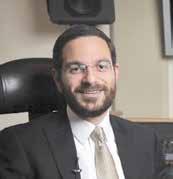
By Eliyahu RosEnBERg
The night grew older with every toss and turn, as Rabbi Dan Roth lay awake in the darkness. Although he was tired, he just couldn’t fall asleep. His mind was restless, preoccupied with a flurry of thoughts about his brand-new job as a teacher. What initially seemed to the 33-year-old rab -
bi to be an exciting opportunity to touch the lives of young, troubled souls turned out to be something of a nightmare.
“I started teaching in Ohr Somayach at a program called Yesod,” Rabbi Roth recalled. “It was for guys who grew up in religious homes but, for one reason or another, were seriously turned off from
Who doesn’t want to get excited about the most exciting thing in the world, which is Judaism and Torah? Deep down inside, no matter what your background is, we all really just want to connect to hashem and his Torah.
i believe that just like there’s a mitzvah to beautify shabbos candles and to have a beautiful mezuzah, there’s also the obligation to beautify the Torah and Talmud Torah. Teaching Torah has to also be done in the most beautiful way.
Davening energizes me for the whole day. i can wake up with so much on my mind, so many things i’m worried about, and just having that time to pour out my heart just makes me feel like a different person. The most important thing in my day is to just take tefillah seriously.
Judaism. They were either on drugs, coming off of drugs, or had social or psychological issues. The only real requirement to get into that program was that you couldn’t get into any other yeshiva.”
Having just published a book on Pirkei Avos, Rabbi Roth was fascinated with the tractate and innocently assumed that his students would share in his fascination. But they did not. Instead, as Rabbi Roth attempted to teach the boys about the wisdom of our great sages, the students pretended like the rabbi wasn’t even there. The classroom quickly became a scene of free-for-all chaos, with boys randomly walking in and out, texting classmates on their phones, and paying no attention to or showing little interest in Rabbi Roth’s lecture, no matter how fascinating it might have been. The rabbi felt flustered and utterly powerless.
Rabbi Roth came home later that day, disheartened and rejected, feeling as though the class’s disinterest in his lecture was a reflection of his ability to teach effectively. Even as he lay in bed, trying to fall asleep, his mind wouldn’t stop replaying the day’s events on repeat, as seemingly unanswerable questions swarmed into his mind. He thought to himself, “How am I going to get through this? How could I find success in this job? And if this job doesn’t work out, how am I going to support my wife and five children?”
“That nightmare turned out to be the best blessing of my life,” Rabbi Roth says. “It was Hashem, opening up
Rabbi Dan Roth was born and raised in London. When he was a young adult, he thought he had his entire life planned out: he would continue living in England, go to college to study his passion – computer science – and have a career as a programmer. But, as Rabbi Roth says, “Hashem had different plans.” He would instead move to the United States, become a rabbi, and fall in love with Pirkei Avos. At age thirty, he wrote a sefer about how Pirkei Avos pertains to today’s world, titled, “Relevance: Pirkei Avos for the Twenty-First Century.” After spending three years deeply immersed in the tractate, Rabbi Roth completed his book, after which he joined the workforce as a rebbi.
When Rabbi Roth found it difficult to reach his students, he decided to try an educational method that was unconventional at the time. Instead of approaching the issue as a teacher traditionally would, he dealt with the problem like the computer enthusiast he was inside. Instead of giving ordinary lectures, Rabbi Roth decided to harness the powers of “Hollywood” and craft educational videos – with animated, colorful characters – that would captivate his students. The idea inspired him, and he thus stayed up late each night, teaching himself how to use the software and tools required to create professional, multimedia videos. The results were incredible.
“It was a miracle. The same kids who weren’t interested in the regular teaching methods were suddenly like, ‘Wow, this guy’s really with it!’ It was no longer rebbi versus student,” Rabbi Roth explained. “They were like, ‘He’s one of us. He understands our language!’ And they were just so open to learning.”
Rabbi Roth went on to teach in other yeshivas and continued to witness miracles born from his new teaching method. Regardless of whether his students were run-of-the-mill yeshiva boys or lost Jewish souls, it seemed as though his videos were able to win everyone’s affection. The students weren’t only learning better and retaining more information than they previously could, but they were also having an enjoyable, fun time.
“Who doesn’t want to get excited about the most exciting thing in the world, which is Judaism and Torah?” Rabbi Roth noted. “Deep down inside, no matter what your background is, we all really just want to connect to Hashem and his Torah.”
Understanding the incredible power of using technology and multimedia content to teach the world about Judaism, Rabbi Roth decided to expand the scope of his efforts, creating a website called TorahLive.com with educational and entertaining Torah videos and games. With a vast and growing library of video courses for children, teenagers, and adults, Torah Live offers professionally produced animated and filmed videos and movies on a wide range of topics, anywhere from halachos to middos to tefillah.
“It really hurts me that Hollywood has harnessed all these powerful tools, and people can’t wait for a film to be released and millions of people are just being brainwashed by the values of the non-Jewish world,” Rabbi Roth explains. “And we,

the Jewish nation, are the chosen people. We have the real thing, the emes Imagine what we could do if we also used those tools! If Hashem created 3D graphics and animation and the whole idea of film, I, and rabbonim that I’m following, believe that that’s something to be harnessed.”
Of course, Rabbi Roth’s efforts pertain only to those who already use technology in their daily lives; he does not encourage those who don’t use technology to start using the internet because of Torah Live.
Rabbi Roth dreams of a world where children and adults could enjoy immersive, high-quality Jewish films about Yetzias Mitzrayim and other major Biblical events; movies that are just as captivating as, l’havdil, the non-Jewish world’s top films. He aspires to one day transform Torah Live into the Jewish version of Khan Academy, an educational website that has lessons for every subject and learning level, going all the way, for example, from basic arithmetic to the most advanced college math. Imagine an incredible, educational website that has captivating videos on every halacha, hashkafa, and middah, for every topic related to Judaism, and for every learning level. That is Rabbi Roth’s vision for the future of Torah Live.
locations. It had a $850,000 budget!”
The Torah Live team is composed of around thirty-five people: directors, producers, animators, graphic designers, developers, videographers, and the like. Many Torah Live employees are experts in their fields. In fact, one of Torah Live’s scriptwriters used to make movies in Hollywood.
As Rabbi Roth explains, the first stage in the development of a new video course is the research stage, wherein he spends around a year studying the issues at hand, immersing himself in relevant books and sefarim, and speaking to Torah educators. Then, he brainstorms ideas and holds discussions with his team for another six to twelve months. Finally, the Torah Live team dives into the production phase and all the challenges that come along with it.
“I believe that just like there’s a mitzvah to beautify Shabbos candles and to have a beautiful mezuzah, there’s also the obligation to beautify the Torah and Talmud Torah. Teaching Torah has to also be done in the most beautiful way,” Rabbi Roth maintains. “Especially in our generation, when the competition is Hollywood, if it’s a haphazard, poorly put together video, it’s not going to grab any attention.”
lia, Torah Live has impacted countless Jews. For example, there was a young secular Jewish boy in South Africa who became frum thanks to Torah Live.
In a recent update, the Torah Live experience has become more interactive, allowing children to publish their own meaningful content on the website and also use a virtual, on-site currency to do real acts of chessed.
“For example, if they just watched the ‘Honoring Parents’ video, they can now send a food package or flowers to an elderly person in an old age home. It doesn’t cost them anything,” Rabbi Roth explained. “If they watch the ‘Smiling’ video, they can bring a smile to a child in a hospital by having a clown perform for that child. You can have a mezuzah delivered to somebody who’s becoming religious. The thinking is, let’s have kids not just learning about each of these mitzvos, but actually enable children around the world to perform these mitzvos.”
Rabbi Dan Roth isn’t exactly the outgoing type. A bit on the shy side, Rabbi Roth’s biggest challenge in running Torah Live is, self-admittedly, fundraising. Of course, much of his website’s content is funded by donors.
“Just over $9 million have gone into producing the whole library of videos,” Rabbi Roth explained. “I mean, the newest movie that we’ve come out with is about chessed, and it has over 400 extras, actors, and actresses, and over 100
Torah Live has changed the lives of people all around the world, even inspiring some secular Jews to become religious. Over 2,000 schools use the website as part of their curriculum, countless children absolutely love the colorful, humorous Torah videos and games, and adults too can appreciate the deep lessons that Torah Live has to offer. Children are eager to watch videos that are, for example, about respecting parents and davening to Hashem with kavanah.
Rabbi Roth has heard incredible stories from all around the world – from South Africa to India to Chile to Austra-
Rabbi Dan Roth, the founder and director of Torah Live, has, for years, leveraged technology for its intended purpose: to bring people closer to Hashem. He has played no small part in changing the lives of countless Jews. However, Rabbi Roth doesn’t see himself as anything more than a simple educator.
“There have been so many miracles that I’ve seen. The whole idea that someone as shy and reserved as I am is creating all these videos that, baruch Hashem, are being enjoyed, it just doesn’t make sense and it’s all clearly yad Hashem ,” Rabbi Roth shares. “From A to Z, it’s all siyata dishmaya, through and through, and I can’t thank Hakadosh Baruch Hu enough. And I just pray every day that it should grow and bring more people closer to Judaism and their heritage, and to show them the most beautiful, gorgeous thing in the world, which is the Torah.”
By Leah R. Lightman


My husband and I love traveling to places of Jewish significance.
On a recent trip to Hungary, we spent a day in northeastern Hungary near the borders of Slovakia and Ukraine, and it did not disappoint. We visited Szerencs, Mad, Kerestir and Satoraljaujhely, and we were struck by the honor accorded to those who are no longer in this world.
In Szerencs, for example, which is about 120 miles from Budapest, the Jewish cemetery is on a hill and its gate is secured by a padlock. We chose to go to Szerencs as we know the descendants of the late chief rabbis. Adjacent to the locked gate is a board upon which is written in Hebrew letters the word “code” and then four Hebrew letters, each one corresponding to a number on the padlock. A couple tries, combined with a push or two on the padlock, and it finally yielded and opened to an overgrown cemetery on yet a higher hill with the ohel at the hill’s peak. The tombstones were weather-worn and the grass was thigh-high. My husband and I stood for a pregnant
moment, trying to figure out if and how to proceed. My husband plowed forward determinedly, separating the high weeds and thistles so I could follow in his path.
In contrast to the wilds of the cemetery, the Szerencs Ohel is a study in order and tranquility. Its floor is done in brick and is easy to traverse. Buried inside are two chief rabbis of Szerencs, Rabbis Pinchas HaLevi Billitzer (1860-1913) and Amram Yishai HaLevi Billitzer (18341889). There was no lack of stones or kvitlech on each kever. We could feel the ties of the generations in this simple structure where the accomplishments in Jewish life and learning of the previous generations offer inspiration.
Our next stop was Mad, which at one time was a major center of kosher winemaking. The shul has been restored and more than hints to the grandeur of Jewish life in the region prior to World War II. The shul has been the setting for numerous simchas over the last twenty or so years.
Our visit to the cemetery was fas -
cinating. Like the one in Szerencs, it is nestled on a hill and is overgrown with grass: Miriam Frank of the Mad Jewish Museum explained that the grass in all cemeteries is mowed 3-4 times annually and that this recent spring was unusually wet and caused major overgrowth. A mowing and pruning was scheduled for later in the week.
In the cemetery is a state-of-the-art, relatively newly constructed ohel by the Schwartz family of Lakewood, New Jersey, for their antecedents who had been rabbis in Mad. One forefather had been a premier student of the Chasam Sofer and, after meeting the scion of the Sanz dynasty, became attached to chassidus. The lights in the ohel turn on automatically as one enters. The Ohel is heated in the winter and delightfully air conditioned in the summer. The mounds of stones and kvitlech attesting to the numbers of visitors were astonishing.
After a brief stop at a winery that had three types of kosher wine (which we purchased), we then traveled to Ker -
estir. Kerestir is famous for Rav Shaya Steiner, the legendary Reb Shaya’le of Kerestir, who was Kerestir’s Rebbe from the end of the 19th century until his death in 1925.
Reb Shaya’le was a chassidic rebbe known for hospitality on an institutional scale. The hungry, the homeless and any person in need of physical and spiritual sustenance could go to Kerestir where Reb Shaya’le would tend to them himself.
Like our previous stops, the ohel is up on a hillside. There are separate entrances for men and women. On that Thursday afternoon not even two weeks ago, there were about three or four other people in the ohel , davening and beseeching Reb Shaya’le to be a melitz yosher for whatever they were davening for. My husband and I each found places on our respective sides of the mechitzah, sat down and joined the davening, pleading the Al-Mighty for personal requests and the safety and salvation of Klal Yisrael and Eretz Yisrael in these tumultuous times. More than one tear was shed as we wrote
out kvitlech that we carefully placed on the kever.
I’d be remiss if I did not mention that kosher food abounds in Kerestir. We sat down to a late lunch at 3:30 p.m. As hungry as I was, I could not eat the cholent even though my husband assured me it was delectable. When I asked Mr. Friedlander (who oversees one of Kerestir’s eateries) for the bill, he looked at me puzzled and replied, “There is no bill. In the tradition of Reb Shaya’le, we have ample food. You can choose to donate as you want.” And we did.
Completing our visit to Kerestir was a stop at Reb Shaya’le’s house. We walked gingerly across the freshly washed kitchen floor to see the place of Reb Shaya’le’s original oven which is preserved under plexiglass. We marveled at the kitchen and volumes of food it produces to feed the throngs of people who travel to Kerestir. They estimate that on a “quiet” day, such as when we were there, they average about 150 visitors. We were also shown the building of a replica to the size of the original house.
Our driver, Eliezer, a 28-year-old Budapest native who learned in Yeshivat Netiv Aryeh, then insisted that we travel about 30 minutes to Ujhely/
Satoraljaujhely to the kever of the Yismach Moshe, Rabbi Moshe Teitelbaum. Rabbi Teitelbaum descended from an old rabbinic family and was the founder of Hungarian chassidism, specifically the Sighet-Satmar dynasty. Fascinatingly, he rejected all chassidic teaching until he was in his fifties. One day, his sonin-law asked him to travel to Lublin to meet Rabbi Yaakov Yitzchak of Lublin. Rabbi Teitelbaum had been troubled by chassidim emphasizing joy when we do not have the Beis HaMikdash. Anticipating his question, Rabbi Lublin stated that while chassidim are outwardly joyous and happily praise Hashem, in their hearts, they mourn the Beis HaMikdash. Because of this encounter, Rabbi Teitelbaum committed to chassidus. He became known as a miracle worker who helped many sick people. Subsequently, his city – Satoraljaujhely – became one of the most important destinations for Jews traveling to Hungary. While this ohel is not on a hill, we nonetheless had to walk up several steps. After we davened, we went to the adjacent building where there are several rooms, including a large kitchen area with tables. The room is stocked with different foods and drinks. We were told
that they were beginning preparations for the Yismach Moshe’s yahryzeit which is on the 28 th of Tammuz which would be the following week. They were expecting thousands of visitors.
Our “tour” of the kevarim ended at about 6 p.m., at which time we returned to Budapest. It was a long day that flew by. When my husband and I later debriefed, we agreed it was thrilling to be part of something much larger than us – and to tap into a history that began at Har Sinai and continues through this very day. Over Shabbos, we met a wide spectrum of people, including secular Israelis, who were planning trips on Sunday to Kerestir and its environs. Each person had his or her own story and wanted to daven where it feels that there’s almost an express line for our prayers to go “straight up there.”

May our collective tefillos wherever they are said be accepted l’tovah and bring the ultimate redemption which we sorely need.



Moderated by Jennifer Mann, LCSW of The Navidaters

I’m 24 and read your column religiously. I come from a more modern background, having attended a more modern school. My girlfriend, however, went to an extremely orthodox school and became more modern over the years. She’s super nice, intelligent and volunteers across various chessed centers in the community.
Things are great between us. The issue is her parents. They have gotten progressively more yeshivish over the years. I totally respect and admire their decision. However, I personally would rather live a different lifestyle and believe they should respect my decision, too.
They’ll often make remarks like, “Does he daven or learn at all?” These types of questions carry a tremendous amount of weight on me. it’s not just about whether I daven or learn but about whether I fit their ideal son-in-law they’ve envisioned for their daughter.
These comments make my girlfriend and I very uncomfortable. I can see the tension it causes between her love for me and her respect for her parents. I just wish they could respect me like I respect them, especially because she’s so close to them... Long term, I know she expects to live near them, and I’m wondering if this will have a negative effect on our marriage.
Please advise,
Avi*

Rebbetzin Faigie Horowitz, M.S.
Your concerns are well placed; you are contemplating marriage with a compatible young woman and are concerned about her family’s acceptance of your religious status which doesn’t match theirs. You are correct in assessing that the current tension will affect you as a couple. This needs professional help to open doors of communication, acceptance, and understanding that their journey is not yours and to maintain family relationships. You are right to be concerned that this will be a problem in the future. The two of you may want to meet with her parents’ rabbi, guide during their journey, or other spiritual mentors they respect and communicate with. There may have been meetings with therapists
in the past. Go back to these individuals who already know your girlfriend’s family and their strengths and weaknesses. Get input and advice from them. They may also have influence on them. There may come a time for a direct conversation between you and them about acceptance. However, I believe it will be more helpful to wait on that until you meet with those who know them a long time and have seen the family members adjust to various circumstances, both in terms of religiosity and the vicissitudes of life.
painful than feeling like a disappointment to your in-law (or potential in-law) family. Feelings that come up span the gamut from insecurity to resentment, with many other feelings in between. You want to be accepted and not judged for who you are.
This is a painful situation to be in and I can understand where you are coming from. There is nothing more

You need to talk to the girl you’re dating about these feelings, especially since it appears that she is the one repeating what her parents are saying. As quoted from your letter, “They’ll often make remarks like, ‘Does he daven or learn at all?’” You have to get to the bottom of understanding where she is holding with her parents’ feelings and judgments. If she is this close with them and plans on living near them, this is not something that you can simply move away and escape from. It will be a long-term commitment, and it is best to proceed into engagement with clarity.
The first step is having an open discussion with the girl you are dating. Can she talk to her parents about it and help smooth things over? Can she enlighten them about how much she respects you and how much it hurts her when they nit-pick the nuances in your Yiddishkeit?
The second step will have to come from you after communicating your concerns and the comments stop. Internally, you know who you are and the amazing maalos you will bring into the marriage; build up that confidence. Continue to display all the amazing character traits you possess, and you will eventually win over their hearts. At the end of the day, they just want to see that their daughter is happy. They will see this and appreciate you for who you are. Hatzlacha with everything!
Dr. Jeffrey Galler
Congratulations on your choice of reading material.
And congratulations on having the maturity to respect and love your girlfriend’s parents for who they are, despite your differences, and for being astute enough to realize that current and future
Continue to display all the amazing character traits you possess, and you will eventually win over their hearts.
tensions with her parents are issues that need to be addressed.
May I suggest that you have two very important conversations.
Conversation #1 – With the Girlfriend’s Parents
Pick a time when you, your girlfriend, and her parents have time for a heartfelt, relaxed discussion. See if you can come to a mutual understanding.
First, acknowledge that you understand that their concerns about you stem from wanting the best for their daughter, and that you understand that they had always envisioned a son-in-law who mirrored their own religious beliefs and practices.
Second, explain that although they might be positioned a bit more to the right and that you might be positioned a bit more to the left on our religious spectrum, you nevertheless share extremely important, basic values.
For example, you may wish to assure them that despite your differences, your home will be strictly kosher and that they will always feel comfortable visiting and eating in your home; that you and their daughter will certainly be sending the children to a yeshiva; and that you both share a deep sense of emunah, and love for Am Yisrael and Eretz Yisrael.
Third, express the hope that the love and respect that you will have for them will be reciprocated by them, that you envisage a future where you will be visiting for the chagim, and where your
children will be welcomed to their home, along with their other grandchildren, in a loving, non-judgmental way.
Conversation #2 – With the Girlfriend
Discussing and deciding where to live and raise a family is one of the most important decisions a couple will make. There is an old adage that it is wise to live a short drive but a long walk from one’s in-laws.
Living near parents and/or in-laws makes a lot of sense. They can be incredibly helpful. They are the best babysit-
ters and support system. And, later in life, it will make it easier to help them when needs arise.
But, importantly, you will have to make sure that the neighborhood is one in which “modern” families are welcomed. You will want a neighborhood where there is a heterogenous population, with a diversity of yeshivas and shuls that cater to folks who are positioned differently on our religious spectrum.
Remember that healthy friendships are very important for a healthy lifestyle. Classmates, shul
Dating and Relationship Coaches and Therapists
Dear Avi,
Thank you for writing and for being a regular reader! Your desire for your girlfriend’s parents to be respectful of who you are is completely understandable and valid. And for what it’s worth, you are absolutely correct in that parents should always be respectful of their children’s partners. Parents are entitled to disagree or to have hoped for something different (in the crevices and private corners of their own minds, in their therapist’s office or when they are out to lunch with a close friend). The appropriate time for parents to voice concern is when there is reason for actual concern, like when they see red flags or outright abusive behavior or they see their child’s behavior and/ or mood changing drastically. Not approving of a religious level of a child’s partner, when this person is a reflection of their own child’s religious standing, is completely unhelpful behavior and will only
accomplish one of two things:
1. Create a wedge between the young couple (and ultimately drive the partner away.)
2. Create a wedge between the parents and the young couple.
When there is no abuse involved, a parent’s role is to be supportive, loving and accepting and thank their lucky stars their child is healthy and happy and in love. Parents are entitled to feel all their feelings, as feelings are always valid. They are not entitled to share these disappointments and little comments with their children.
But Avi, here’s the thing... You can’t stop the comments, and ultimately, your girlfriend cannot stop the comments. Neither of you are responsible for her parents. Only the parents can stop. Of course they should respect your decision, but it is up to them to do so.
acquaintances, and their parents will be extremely important sources of friendships for your children and for you.
You want to be sure that you and your children will not feel shunned and rejected in an exclusively “yeshivish” community.
So, Avi, in spite of religious differences, I hope that your girlfriend’s parents will agree to reciprocate your love and respect.
And I hope that you can live harmoniously in a community where both “modern” and “yeshivish” Jews are warmly welcomed and treasured.
Express the hope that the love and respect that you will have for them will be reciprocated by them.
(And, if all these suggestions fail, I understand that Congregation Sukat Shalom, in Juneau, Alaska, is the center of Jewish life in Southeast Alaska and welcomes new members.)
If things are great between you and your girlfriend, I am hopeful that you can keep things great and go the distance, with the following game plan in place, a game plan that is all about healthy and respectful boundaries that you and your girlfriend create. The very first suggestion I have is the notion that you don’t have to know about every comment coming in from the parents. In other words, you are completely entitled to ask your girlfriend not to share with you every time her parents make a remark.
A lot of the potential for health of this relationship is relying on your girlfriend’s ability to create and maintain boundaries with her parents and also on where she herself is holding in terms of her religious choices. You are a reflection of where she is at. Her parents ultimately aren’t disappointed in you; they are disappointed in their own daughter and are trying (perhaps subconsciously) to make their daughter more orthodox again. And your girlfriend is going to
have to “do the work” of standing firm in who she is with her parents and also in making you feel completely comfortable and confident and secure in your relationship.
I recommend that the two of you speak to a couples therapist sooner rather than later to help carve out a healthy path forward, hopefully, one in which she can maintain a relationship with her parents and where she makes you feel safe in the foundation of your relationship.
Disappointed and critical parents who make comments can absolutely get in the way of a marriage, if the child of those parents lacks healthy adult-like boundaries with his/her parents. When healthy and kind boundaries are in place, when two people truly love each other, a beautiful marriage is absolutely possible!
Sincerely, Jennifer
By Sara Rayvych, MSEd

Do I say something? Is it worth it? Will they appreciate it or get annoyed? I don’t want to come off the wrong way, but I really don’t agree with what they’re doing.
It’s a common scenario. We see something, and we are unsure if we should say something. It may be disagreeing with someone else’s parenting methods. Perhaps we think they are too permissive/restrictive. Maybe their child isn’t dressed warmly/tznius/clean enough. Someone sees a child melting down and they want to step in to assist. It may be a complete stranger we’ll never see again, or perhaps it’s one of our nearest and dearest.
This article won’t provide definitive answers to these questions, because there aren’t any. My purpose is more to provide some thoughts on the issue, recognizing that each individual must decide for themselves what to do in each unique scenario. While this comes up in many areas – such as dating – I’ll focus on parenting and child related issues.
The Relationship
How well do I know this person?
The more connected we are to the child, the more emotions we will experience. We also may be at greater risk of
being biased. For example, we might not notice something minor with a stranger’s child but be outraged if the same happened to our own.
When we know someone well, we have more information to better ascertain whether they will welcome or reject our concerns. Additionally, they may more readily listen to us when they see us as a warm, familiar face than a total stranger.
Some relationships are close but can be tricky. For example, grandparents intensely love their grandchild, but their comments can risk their married child’s shalom bayis. It is important to make sure that any well-meaning action doesn’t cause a worse repercussion.
Speak With Warmth (Too) many years ago, I was in Israel walking down the holy streets with my baby in a carrier. He was happily snuggling up to his mommy when an older Russian woman walked by and gently pulled up his sock, stating, “His feet are cold.” I had not noticed his slipping sock, but I still remember the matter-of-fact way she told me.
Anything we say will be more accepted when spoken with warmth and concern rather than judgment and harsh-
ness. Especially when we are criticizing someone – and these situations usually involve criticism – we want to be extra careful in how we speak.
Our tone and words should be prepared in advance and chosen carefully.
A brief statement is better than a megillah, and compliments can go a long way in smoothing ruffled feathers. Empathy, kindness and understanding will be more successful than judgment and criticism.
When possible, it can be helpful to suggest to the parent to consult a relevant professional, rather than directly give advice. This takes themselves (and their opinions) out of the equation and allows the parents to get more accurate information. Instead of, “There is something wrong with your child’s XYZ,” saying, “Perhaps you want to mention that to their pediatrician/teacher/therapist” may be more productive.
This is a big question, and there are many factors to take into consideration. The first question is whether or not they will respond positively. If you think they will welcome your input, then you have a good reason to speak. Alternatively, if you think you will be ignored or treated
disrespectfully, then you may want to keep quiet. Often, people don’t respond positively to unsolicited advice, and they react strongly to the perception of criticism or judgment. My general advice is that it’s often best to refrain from commenting because of the unlikelihood that it will be accepted. Despite my articles, I shy away from offering unsolicited advice in person.
I was once grocery shopping with my son in his stroller. The weather was warm enough that I was without a coat or sweater, but I made sure my little guy had on a warm sweatshirt with a hood. Someone saw us and – so horrified that I had neglected to give my son a hat under his hood – this individual reported me to my father-in-law. Sadly, this is a real story. Is the issue an objective concern? Like the above story, there are so many situations where someone is sure there is one correct solution, but then discovers others do things differently – and it’s OK. There are situations that are objectively wrong, but those are not as common. There are different opinions between cultures/communities, genders and generations. There can be more than one “right way” to do something, and often our opinions are simply “opinions.”
Sometimes, the best thing is to just empathize and encourage rather than correct. The parent of a melting down toddler will probably benefit more from a passerby saying, “She is so cute, I remember the frustration when mine did the same,” than “You know, you should be handling this differently.” A calmer parent thinks clearer and will make better choices on their own.
There is room to be dan l’kaf z’chus. A friend was walking with her daughter who was suddenly very hot despite the chilly weather. Her child proceeded to remove each layer of warm clothing as they walked. Someone looking on could think the mother was not taking proper care of her child. In reality, the parent had provided the child with suitable attire, yet the child intentionally removed it. Seeing the underdressed child, a passing police officer stopped in concern and inquired about the situation. After the mother explained what happened, he asked the child who said with frustration, “I’m SO hot.” With that reassurance, the officer left.
A child may not have their lunch because they forgot it at home or they ate it on the bus ride to school. They may have been dressed in clean clothes that morn-
ing but jumped in a puddle of mud or had an argument with a permanent marker. It helps to get facts before we judge. Whenever we see something concerning – major or minor – it’s always worthwhile to send up a quick tefillah.
but don’t walk away or ignore it. Anything that can cause a severe or imminent risk to a child must be dealt with quickly. Examples include abuse, drug misuse or denying medical care for a serious illness or injury.
They may more readily listen to us when they see us as a warm, familiar face than a total stranger.
Davening is always the correct solution and works miracles.
The Exception
It seems like every rule has an exception. Everything up till now was assuming relatively minor offenses. We may disagree, we may not like something, but that doesn’t make it an objective emergency.
There are times that we must speak up no matter how uncomfortable we are. You can certainly consult a rav for guidance,

“Tell me about the bachur,” she is asked. She thinks to herself, “He has a violent temper and I’d never let him near my daughter, but he needs to get married and I don’t want to say lashon hara.” She responds, “Such a wonderful family.” While this example concerns adults, we can readily think of many examples where a child is the one in danger.
It’s upsetting how often adults can suddenly become quiet when a child’s basic safety is at risk. I’ve spoken with children – now adults – who have gone
through the most disturbing levels of abuse/neglect that was ignored by the adults around them. I heard them describe all the opportunities when adults could have stepped in and saved them –yet it never happened.
As painful as it is, we must tell the parents, teacher or relevant authorities. A knowledgeable rav or mental health professional can help guide you. Please note, the parents are not the best address to bring your concerns if they are the ones risking the child’s safety. An abusive parent is more likely to cover it up rather than make changes on their own.
As caring individuals, we are pained when we see situations we feel we can correct. While keeping our thoughts to ourselves is often the prudent response, knowing how and when to speak up is a fine art.
May Hashem gives us the wisdom to know how and when to speak and when to keep our thoughts private.
Sara Rayvych, MSEd, has her master’s in general and special education. She has been homeschooling for over 10 years in Far Rockaway. She can be contacted at RayvychHomeschool@gmail.com.

By Tehila Levine-Soskel, RDN, CDN
Maintaining healthy bones is crucial for our health as it plays imperative roles in our body’s systems, from influencing physical activity to helping to prevent chronic diseases.
It’s essential to consume a balanced diet to help support bone strength and bone density. A balanced diet, including fruits, vegetables, legumes, nuts, seeds, and protein, helps ensure you are getting the majority of nutrients needed to maintain healthy bones. However, with age, it is necessary to ensure we are eating a balanced diet that helps support bone health to help prevent conditions like osteoporosis. Including the right food and nutrients into your diet can help maintain stronger bones and a healthier life. There are certain minerals that play an important role in bone health.
One of the key ingredients of bones is calcium as it is responsible for strength and bone structure. Calcium comes from dietary sources or supplements as we do not make it on our own. Lack of calcium in the bloodstream leads to thinning of the bones. Milk, yogurt, cheese, beans, nuts, seeds, and vegetables like leafy greens, artichoke, and squash are all rich sources of calcium. The RDA (Recommended Dietary Allowance) of calcium for individuals 51 years and older is 1200 mg per day for women and 1000-1200 mg per day for men.
Vitamin D is just as crucial as it helps our bodies absorb calcium and regulates levels of calcium and phosphorus, all needed to help build bones. We can get vitamin D from exposure to sunlight, as the skin synthesizes vitamin D. Fatty fish like salmon, egg yolks, and fortified milk can help provide adequate vitamin D intake. The Recommended Dietary Allowance for vitamin D is 400 IU for children up to 12 months, and 600 IU for individuals 1 to 70 years old.
Magnesium plays many roles in the body such as regulating blood sugar lev-

els, muscle and nerve function, as well as making bones, protein, and DNA. According to the American Bone Health, people with higher intakes of magnesium have a higher bone mineral density which is important to help reduce the risk of bone fractures and osteoporosis. There are groups of people that may be likely to not get enough magnesium such as individuals with Crohn’s disease, celiac disease, type 2 diabetes, and older people. Food sources of magnesium include green leafy vegetables, legumes, milk, yogurt, chocolate, whole grains, nuts, and seeds, and it is sometimes added to fortified cereals. The Recommended Dietary Allowance for magnesium is 350 mg for females and 420 mg for males.
Many foods contain phosphorus, such as dairy products, cereals, fish, meat, eggs, legumes, nuts, grains, potatoes, and asparagus. Phosphorus is found in the cells of our body, with most of it found in our bones and teeth. It is essential that we have enough phosphorus for our body to make energy and for many chemical processes to take place. The Recommended Dietary Allowance for phosphorus for adults 19 years and older is 700 mg.
Potassium plays numerous roles in our bodies such as maintaining proper kidney and heart function, nerve transmission,
and muscle contraction. Too little potassium in your body may increase your blood pressure and deplete your bones of calcium. According to American Bone Health, many of the diets in the U.S. do not contain enough potassium. Individuals with inflammatory bowel disease and those who use laxatives or certain diuretics may not be meeting their potassium needs. Those with certain medical conditions like kidney disease need to be aware of their potassium levels. Food sources of potassium include avocados, beans, bananas, broccoli, cereals, lentils, milk, yogurt, nuts, prunes, raisins, spinach, and tomatoes. The Recommended Dietary Allowance for adult males is 3,400 mg and 2,600 for adult females.
Protein is known as the building blocks for our health. Potassium has many roles such as helping with cell structure and building and repairing skin, muscle, and bones. Protein helps with bone formation and makes up most of the volume and mass. Including healthy protein sources like lean protein, legumes, whole grains, nuts and seeds into your diet can have a positive effects on your bone health. The recommended daily intake for protein varies on many factors like age, gender, and activity level.
Omega-3 Fatty Acids
Omega-3 fatty acids are found in
foods like salmon and sardines and are anti-inflammatory which helps support bone health. Foods with omega-3 fatty acids can help reduce the risks of fractures and osteoporosis. Antioxidant-rich fruits and vegetables like berries, oranges, and bell peppers also help with bone health by reducing inflammation and oxidative stress. Omega-3 fatty acids are a key nutrient to help support bone health.
Water is essential for our bodies to function. Our bones need proper hydration in order to stay healthy. Did you know that water makes up around 60% of our body weight? Regulating our body temperature and lubricating our body and joints are just two of the many functions of water in our body. Unfortunately, dehydration can lead to osteoporosis and many other musculoskeletal conditions. Common symptoms of dehydration are constipation, headaches, muscle cramps, dry eyes and mouth, and decreased urine output. Be mindful to drink enough water.
Reducing your salt intake and alcohol may be recommended as they may lead to calcium loss and weakened bones. Smoking is another factor that also negatively affects bone health by reducing bone density and increasing the risk of fractures. Proper weight-bearing exercises are essential for helping maintain bone strength and density.
Focusing on a balanced diet, including a variety of nutrient-rich foods, and drinking enough water is imperative to supporting bone health and a healthier life. Reach out to a healthcare professional or registered dietitian for a personalized plan for you based on your individual needs.
Tehila Soskel is a registered dietitian nutritionist with a private practice in the Five Towns. She sees clients for weight loss, diabetes, and other various diseases. Appointments can be made for in-person or virtual sessions: 516-457-8558, tehilasoskelrd@gmail.com, tehilasoskelnutrition.com.


By Naomi Nachman
This is a great dinner-in-a-bowl recipe. I throw this together in a big double batch and freeze, and then I take one out of the freezer for a quick dinner. I take it out the night before and put it in the fridge and boil it up quickly when I get home.
Ingredients
◦ 1 tablespoon extra-virgin olive oil
◦ 1 cup diced onion
◦ 1 large jalapeno pepper, seeded, with ribs removed
◦ 1 cup diced celery
◦ 1 cup gala apples, peeled and chopped
◦ 1 (6-ounce) package chicken cabanossi (kabanos), sliced into ½-inch rounds
◦ 1 bunch kale, chopped, about 6 cups
◦ 2 cloves garlic, minced or 2 cubes frozen garlic
◦ 1 teaspoon cumin
◦ 4 cups chicken or vegetable broth
◦ 14 ½ ounces diced tomatoes, undrained
◦ 1 (15-ounce) can white beans, drained and rinsed
◦ ½ teaspoon salt, or to taste
◦ ¼ teaspoon ground black pepper
◦ Dash of sriracha (optional)

1. In a large soup pot, heat olive oil over medium-high heat. Add onions, pepper, celery, apples, and sausage. Sauté, stirring, until onion is just tender.
2. Reduce heat to medium-low. Add kale, garlic, and cumin; cover and continue cooking for two minutes.
3. Add remaining ingredients; cover and cook for 15 to 20 minutes, until vegetables are tender.
4. Taste and adjust salt, pepper and cumin, as needed.
Naomi Nachman, the owner of The Aussie Gourmet, caters weekly and Shabbat/ Yom Tov meals for families and individuals within The Five Towns and neighboring communities, with a specialty in Pesach catering. Naomi is a contributing editor to this paper and also produces and hosts her own weekly radio show on the Nachum Segal Network stream called “A Table for Two with Naomi Nachman.” Naomi gives cooking presentations for organizations and private groups throughout the New York/New Jersey Metropolitan area. In addition, Naomi has been a guest host on the QVC TV network and has been featured in cookbooks, magazines as well as other media covering topics related to cuisine preparation and personal chefs. To obtain additional recipes, join The Aussie Gourmet on Facebook or visit Naomi’s blog. Naomi can be reached through her website, www.theaussiegourmet.com or at (516) 295-9669.


By Country Yossi Toiv
As a young boy, I attended the Lubavitcher yeshiva on Bedford and Dean Streets. Right in front of the yeshiva building was a small, triangular plaza bounded by Bedford and Rogers Avenues called Grant Square featuring a giant statue of General Ulysses S. Grant sitting on a horse. I drove by recently and it’s now completely gated in and covered with shrubs, bushes and
Flowers, but back then it was a perfectly smooth, paved sidewalk perfect for… stickball. We would play at recess every day, and to us it was our private Ebbet’s Field (home of the Brooklyn Dodgers, which actually was only a few blocks away down Bedford Avenue).
About 150 feet away from home plate, which was a square drawn with chalk at the base of the statue, was a tall building. On top of that building, about 200 feet up, was a giant billboard advertising Marlboro cigarettes.
Nobody ever hit that sign!
One memorable day – I remember like it was yesterday – I was batting with an 0-2 count and the pitcher foolishly tried to throw a fastball past me. I was ready for it. I swung hard and hit it right on the sweet spot! The ball took off like a rocket, way up in the air, then took a sharp turn heading straight for the billboard. Everybody turned to watch in disbelief. Then, with a loud, resounding THUD, it hit the Marlboro Man right between the eyes!
Everybody was in shock.
“Yossi hit the sign!” was repeated in hushed tones for the next few days. My rebbi even asked me later that day, “Toiv, you really hit the sign?”
Yes, I did!
Rabbi G. was the English principal, and he was a proud, well-educated, college graduate with a prolific vocabulary that he loved to show off.
Once a week, every Wednesday, we had “gym” scheduled on the 4th floor, up three flights of metal stairs. We all breathlessly looked forward to it all week, choosing up teams in advance, assigning positions and discussing strategies. At three o’clock sharp we all excitedly lined up to make the trek upstairs…but it was not without peril! There, hiding out of sight on the third floor landing, lurked Rabbi G.! If he heard one person talking, whispering or running, he would suddenly and dramatically appear and announce in a stentorian, authoritarian voice, “You have the audacity to disturb the decorum of this edifice? Gym is cancelled! Go back to class!”
I couldn’t believe it. I was utterly devastated and depressed.
This unfortunately happened just about every week.
As hard as we tried to tiptoe and keep quiet trudging up the stairs, somebody always sneezed, coughed, laughed, tripped or blew their nose too loud, and BOOM, there he was, “You have the audacity to disturb the decorum of this edifice? Gym is cancelled! Go back to class!”
Thus, 35 sensitive, young hearts were broken and our spirits deflated every single week.
On that sad note did my elementary school experience end.
But not quite!
You see, it seems hashgacha pratis had determined that that wouldn’t be my last encounter with Rabbi G.!
40 Years Later
I’m sitting in my office one day in the Country Yossi Family Magazine building when in walks guess who? He obviously didn’t recognize me, but although he had aged considerably, I knew it was him immediately. I felt like Yosef and his brothers. I was gonna say, “Ha’od avi chai?” but I held myself back.
He told me his son was releasing a musical CD, and he asked if I could kindly
give him some free publicity in my magazine. I sat there, lost in reverie, mulling my response!
I could have said, “you have the audacity to ingress my province and enjoin me to avail my benefaction, ministration and subsidy to provide succor and patronage to your scionic progeny?”
But instead, I said, “Do you remember me?”
He studied me, eyebrows furrowed, stroking his gray beard.
“Yossi Toiv,” he muttered over and over to himself, “the name sounds familiar. Were you in Lubavitch?”
Like Yosef Hatzaddik, I could control myself no longer!
“Everybody out,” I shouted to my office staff. When the room was cleared, I proceeded to pour out my heart to him. I explained all the anguish, pain and disappointment he caused me all those years ago. Forty years had passed, but the anger and resentment still lingered!
His face turned ashen.
Like Yosef’s brothers, he was dumbstruck! This he wasn’t expecting. Here, he was just visiting Country Yossi for a favor, and he got yeneh mishabeirach!
After a few moments, he said, “I’m sorry, I guess I was a bit severe at the time. I apologize.”
Having gotten everything off my chest I felt like a heavy load had been lifted and considering his belated but albeit sincere apology, I agreed to give his son a free write-up.
I don’t know why, but as I watched him leave, I kinda felt sorry for him.
I never saw him again.
The Homerun
Back in Lubavitch, it was mandatory to attend a TANYA shiur every Thursday night after English classes were over.
But this was 1961.
I was 12 years old, and Roger Maris was chasing Babe Ruth’s record of 60 homeruns

in a season. Me and my good friend and classmate Simon were avid Yankee fans, and we wouldn’t miss listening to Mel Allen and Phil Rizzuto announce the game for anything, Tanya shiur or not, especially when Maris was only a few homers away from breaking the record.
We worked out a system where we brought our small transistor radios to school and hid them in our shirt pockets. We then ran the long wire of the earpiece through our shirtsleeves and out into our hands. We then inserted the earpiece into our ears and cupped our hands over it and leaned our heads on our hands like we were just resting when in reality we were listening to the game.
It worked like a charm for half the class – the rebbi didn’t suspect a thing – until Roger came up in the ninth inning.
“In steps Roger Maris, still looking for number 58… Here comes the pitch… There’s a high drive to deep right field… It’s way back there… That ball is going, going, gone…Holy cow, he did it…number 58!”
Me and Simon both jumped out of our seats like we were shot out of a cannon. “Homerun!” we shouted in our manic euphoria, completely forgetting where we were.
Rebbi looked at us like we were out of our minds.
“Vus, zent eer meshugeh?” he yelled. Suddenly, we realized where we were and quickly sat down. But it was too late! The damage was already done! Rebbi had noticed the earpieces hanging out of our shirtsleeves.
“Azah chutzpah!” he hissed. He then confiscated our radios – earpieces and all.
We never saw them again.
This column features business insights from a recent “Mind Your Business with Yitzchok Saftlas” radio show. The weekly “Mind Your Business” show – broadcasting since 2015 – features interviews with Fortune 500 executives, business leaders and marketing gurus. Prominent guests include John Sculley, former CEO of Apple and Pepsi; Dick Schulze, founder and Chairman Emeritus of Best Buy; and Beth Comstock, former Vice Chair of GE; among over 400+ senior-level executives and business celebrities. Yitzchok Saftlas, president of Bottom Line Marketing Group, hosts the weekly “Mind Your Business”
show, which airs at 10pm every Sunday night on 710 WOR and throughout America on the iHeartRadio Network.
Since 2015, Yitzchok Saftlas has been speaking with leading industry experts on the “Mind Your Business” show, sharing insightful business and marketing strategies.
In this article, we’ve gathered five of the best strategies from Fortune 500 executives and consultants for growing your business.

Feedback Focused
John s culley, c hairman & cMo of Rx advance and Former ceo of a pple & Pepsi
Today, with nearly every consumer owning a smartphone and communicating with each other around 40-50 times a day, we’ve entered a new era of transparency. We’re able to be more transparent regarding not only the cost of products, but more importantly, what other people think about those products. These are things that get shared online all the time, leading consumers to trust the advice of people that they’ve never met before. Consumers know that these people have no agenda other than to share what they really think. People trust the advice of other customers, even more than they trust the reputations of the most established brands in the world. Just think about that for a moment. That means there is an opportunity to build entirely new business concepts, based entirely on customers sharing their thoughts online. That’s a radically different way to think about and approach everything in our businesses, from how we market to how we design our products. It’s important that we adjust our mindsets for this shift.

Gatekee Pe R s vs. Goalkee Pe R s
beth c omstock, Former v ice c hair of Ge and President of Integrated Media at N bc universal
I was once listening to fashion designer Marc Ecko give an amazing talk in which he distinguished between the gatekeepers in his life and the goalkeepers. Gatekeepers are the thought leaders, the press, critics, etc., but it’s the goalkeepers who actually matter. I love that framing. This is how I hope every good business leader and manager thinks of themselves, as a goalkeeper. It is your job to help your team, your colleagues, to make their goals. I don’t care if your company has three people, 300 people, or 300,000 people. Too often, what happens is people start to protect their turf. They protect their ideas and their power, and they become gatekeepers. That means that you don’t allow people with new ideas through the gates. I once worked for a manager who was very much a gatekeeper. He said no to everything, didn’t share insights, didn’t encourage us, or let us try new things. I felt my only recourse was to leave the company. But, as soon as I left, I realized that there are gatekeepers everywhere and that I had to learn a way to work around them. It’s important to recognize that a gatekeeper could be anyone. It could be a supplier who insists on doing things one way or even a customer that says, “We’ve always done this and don’t want to change.” You have to become aware of those people to find ways to work around them, but unfortunately, sometimes you also just have to move on.
Nobody ever says, “We’ve benchmarked our way to innovation.”

Josh Mohrer, General Manager at u ber
When you carve out a unique niche for yourself, it doesn’t take long for others to try and make their way into your new market. So, the fact that there are “copycat” companies who create apps that are similar to yours I think only validates the idea. If other companies are trying to do something similar to us, it just shows that we’re onto something good. Ultimately, consumers are going to choose the option that is most cost-effective, convenient, and offers the best experience. So, getting ahead of competition is really just a matter of staying on top of those metrics. That’s why we focus on how we can offer cheaper rides and shorter pickup times. In the end, you have to welcome competition. I think it’s good for everyone. It’s good for consumers because it encourages us to come up with better ways to serve them. It’s also great for drivers. With these kinds of apps coming online, drivers now have access to so many more opportunities than before. Those are the kind of innovative benefits that only competition can create.

Joe Hart, ceo of dale c arnegie
The most important thing to remind yourself when starting a business is that you don’t know what you don’t know, especially if it’s your first business. That’s why it’s vital to have conviction, belief, and persistence. In my experience with starting my first business, it was much harder than I thought it would be. The things I thought were going to happen didn’t happen. I found myself working way harder than I had ever thought possible and having incredible headwinds that I thought were going to drive us out of business. So, you’ve got to have conviction, belief, and persistence. I really believe that if you have a good idea and a sound business concept, and you really put everything you have into it, you’re going to be successful. Now, maybe that’s not always true. But, that’s all the more reason to give it everything you have, so that if it doesn’t work out the way that you wanted it to and you move on to something else, you can at least look back at it and say, “I gave it 100%. I have no regrets on it.”

beyoN d be Nc HM a R k ING
Steven Gaffney, Communications Consultant for Fortune 500 Companies
Benchmarking can often be more restrictive than helpful. What if Martin Luther King had said, “I’m going to try to be the best preacher out there?” He, and many other people who have done incredible things, don’t benchmark against other people. They think about what is possible. Look at Tom Brady or Elon Musk. Some people may like or dislike them, but that’s not the point. What’s universally accepted is that they’ve done incredible things. They don’t benchmark against other people. I’m not saying benchmarking isn’t useful at times. But, if you’re going to benchmark your company against others, all you’re going to do is potentially reach the level of those other companies. Let’s say in your industry, 15% turnover is what’s universally accepted. Well, why can’t we get it down to 10% or 5%? People say it’s not possible, but just because they have never seen it done, doesn’t mean it can’t be done. My big problem with benchmarking is that it just creates mediocrity. At best, you’re comparing yourself against what may be the best competitor out there, but you’re not thinking about how to excel beyond them. Innovation is a significant jump forward. It’s not creeping to other people’s level. Nobody ever says, “We’ve benchmarked our way to innovation.”


I think at this point in history, Donald Trump…should be up in the polls. The reason he’s not is that after he was shot, people had an expectation that he would modify a little bit, and he has not. He picks fights and the fights don’t help him, they don’t help the American people. State of Georgia, he should be winning by seven or eight points just because of Laken Riley, the University of Georgia student who was murdered brutally by an undocumented migrant, and you have to acknowledge, when you allow millions of people into this country unvetted, that’s gonna happen, and that’s what Biden and Harris have done. So that should have been the focus of his remarks over the weekend, not Brian Kemp and the 2020 election beef.
– Bill O’Reilly in a News Nation interview
She has gotten to be a really gifted, Obama-level orator.
- MSNBC political analyst Molly Jong-Fast talking about Kamala Harris who has yet to prove that she can string together a straight sentence, unless on a teleprompter
We’re out to get you – you’re dead.
- Former House Speaker Nancy Pelosi (D-CA) talking to the Washington Post about Republicans, weeks after the assassination attempt on Trump
I’m being indicted for you. Did you like my mugshot? Did you like the mugshot? My father’s looking down, my mother and father, they’re looking down because they’re definitely in heaven, they made heaven, they’re great. They’re looking down and saying, “I can’t believe my son took a mugshot; this is unbelievable.”
- Trump at a Pennsylvania rally
But it’s the number one-selling mugshot in history. It beat Elvis! And it beat Frank Sinatra, did you know that? Frank Sinatra had a big one, did you know he got arrested for something? And I think Elvis had a fight at a gas station or something. But Elvis was one, Frank Sinatra was two, and I’m proud to admit and I’m proud to tell you that you have made mine bigger than both of them by a lot. It’s the biggest-selling mugshot ever, and I still haven’t figured out whether or not I’m happy about it. I’m not sure. In one way I’m thrilled, in another way I’m not sure I like it.
- Ibid.
I’ve not been very political before… they try to paint me as a far right guy, which is absurd because I like to make electric vehicles… I supported Obama. I stood in line for 6 hours to shake Obama’s hand… historically, I was a moderate Democrat. But now I feel like we’re at a critical juncture for the country. I think a lot of people thought the Biden administration would be a moderate administration, but it’s not. Were just going to see an even furtherleft administration with Kamala. That’s my honest opinion. For the people out there in the moderate camp, I think you should support Donald Trump for president.
- Elon Musk, during his interview with Trump

Who knew that 2024 would give us the biggest tribute band of all – Kamala Harris taking the stage as the Donald Trump Experience! A decade ago she was Indian, then she became African American, and now she is Orange Hitler. Credit Trump’s magical power to turn Kamala into a caking pants suited version of himself… Kamala’s policies are starting to dribble out and they come straight from the Orange Man’s handbook.
- Greg Gutfeld, Fox
It’s clear that Trump is winning the war of ideas, but Kamala can win the election by stealing those ideas… The most hilarious part is that all of those people that called those policies hateful now declare that they are joyful.
- Ibid.
Maybe she can have Alec Baldwin shoot her in the ear.
- Ibid.
I guess if you spend enough time around Joe Biden, his plagiarism skills begin to rub off.
– Ibid.
Former President Donald Trump’s vow to stop taxing tips would cost the federal government up to $250 billion over 10 years, according to a nonpartisan watchdog group.
- Tweet by CBS News in June when Trump announced his proposal of no tax on tips
Vice President Kamala Harris is rolling out a new policy position, saying she’ll fight to end taxes on tips for service and hospitality workers.
- Tweet by CBS News last week after Harris copied Trump’s proposal

Many seem intent on remaking a core 2016 mistake: acting as though the Democratic candidate’s job is to become the President of Online rather than the President of the United States, begging Harris to devote her campaign to memes and social media, playing to people like them instead of the middle class white retirees in Wisconsin and Arizona who will actually determine this election.
- Freddie Deboer, Substack
I think that voters should think that she’s a human being who learns new things every single day.
- Sen. Laphonza Butler (D-CA) defending Kamala Harris for changing her position this week on fracking, defunding the police, securing the border, and Medicaid for all

Understandable that Kamala’s campaign would find it confusing to listen to a presidential candidate speak off the teleprompter for more than 0 seconds.
- Trump campaign tweet in response to Harris’s campaign criticizing Trump’s interview with Elon Musk
Is that supposed to be a laugh line?
- CNN host Kaitlin Collins, when Stephen Colbert’s audience burst out laughing when he said that CNN is politically objective
[Gov. Walz] is a great governor for Texas, he’s a great governor for Florida, he’s a great governor for South Dakota and North Dakota, but he’s not a good governor for Minnesota because he has taken the job creation there and wiped it out.
- Shark Tank’s Kevin O’Leary talking about how businesses have been fleeing from Minnesota to other states because of the radical policies of vice presidential candidate Gov. Tim Walz (D)
If Trump wins, no, I’m not confident at all.
- Pres. Biden when asked by CBS News reporter Robert Costa, “Are you confident that there will be a peaceful transfer of power in January 2025?” before he corrected himself and said, “I mean if Trump loses, I’m not confident at all.”
Twenty-eight out of every high school students is Latino.
- Pres. Biden, who until three weeks ago was supposedly as sharp as ever, at a White House event


If VP Harris were a confident, competent candidate well-prepared to be president, she would be willing, even eager, to outline her plans and explain herself to inquiring journalists. But she is not. She appears afraid she’ll remind people why so many came to regard her as a giggling lightweight.
- Tweet by Brit Hume
I think that Netanyahu is really inside the head of Iranian leadership. When he killed Hamas’s political chief, that was one thing. The location of it was actually more important because it in a high security areas where many of the elite of Iran have taken up residence…and Netanyahu penetrated that, and he had to have help.
– Retired General Jack Keane on Fox News
What Netanyahu is saying is, “You come in here and hurt my civilian population here, I’m gonna come back for you,” and that has to be inside their head.
- Ibid.
Smoking is dangerous, but Hamas is more dangerous.
- Message posted on boxes of cigarettes that the IDF dropped over Khan Yunis last week
Hamas is burning Gaza.
- Another message posted on the cigarettes
By AnA SwAnSon And Cl Aire Fu
SHENZHEN, China — In the southern Chinese city of Shenzhen, a mazelike market stretches for a half-mile, packed with stalls selling every type of electronic imaginable.
It’s an open secret that vendors here are offering one of the world’s most sought-after technologies: the microchips that create artificial intelligence, which the United States is battling to keep out of Chinese hands.
One vendor said he could order the chips for delivery in two weeks. Another said companies came to the market ordering 200 or 300 chips from him at a time. A third business owner said he recently shipped a big batch of servers with more than 2,000 of the most advanced chips made by Nvidia, the U.S. tech company, from Hong Kong to mainland China. As evidence, he showed photos and a message with his supplier arranging the April delivery for $103 million.
The United States, with some success, has tried to control the export of these chips. Still, The New York Times has found an active trade in restricted AI technology — part of a global effort to help China circumvent U.S. restrictions amid the countries’ growing military rivalry.
The chips are an American innovation powering self-driving cars, chatbots and medical research. They have also led to rapid advances in defense technology, spurring U.S. fears that they could help China develop superior weaponry, launch cyberattacks and make faster decisions on the battlefield. Nvidia chips and other U.S. technology have aided Chinese research into nuclear weapons, torpedoes and other military applications, according to a review of previously unreported university studies.
Beginning in October 2022, the United States set up one of the most extensive technological blockades ever attempted: banning the export to China of AI chips and the machinery to make them. The Biden administration also added hundreds of Chinese companies to a list of organizations considered a national security threat, and it could soon expand the rules.
These bans have made it harder and more costly for China to develop AI. But given the vast profits at stake, businesses around the world have found ways to skirt the restrictions, according to interviews with more than 85

current and former U.S. officials, executives and industry analysts, as well as reviews of corporate records and visits to companies in Beijing, Kunshan and Shenzhen.
In one case, Chinese executives bypassed U.S. restrictions when they created a new company that is now one of China’s largest makers of AI servers and a partner of Nvidia, Intel and Microsoft. American companies have found workarounds to keep selling some products there. And an underground marketplace of smugglers, backroom deals and fraudulent shipping labels is funneling AI chips into China, which does not consider such sales illegal.
While the scale of the trade is unclear, the sales described to Times reporters, including the $103 million transaction, would be far larger than any previously reported in China. More than a dozen state-affiliated entities have purchased restricted chips, according to procurement documents uncovered by the reporters and the Center for Advanced Defense Studies, or C4ADS, a Washington-based nonprofit. The United States has flagged some of those organizations as helping the Chinese military.
Nvidia and other U.S. companies say they are abiding by the restrictions but cannot control everything in their distribution chain. There was no evidence that any of Nvidia’s banned chips in the markets came directly from the company.
“We comply with all U.S. export controls and expect our customers to do the same,” said John Rizzo, a spokesperson for Nvidia. “Although we cannot track products after they are sold, if we determine that any customer is violating U.S. export controls, we will take appropriate action,” he added.
The AI bans have cost American companies billions of dollars in sales, and some executives argue that the restrictions will backfire by giving Chinese competitors an edge. U.S. officials defend the bans as necessary but also say they are testing the limits of their enforcement powers.
“This is an enormously difficult job, and I’m under no illusions that we are doing it perfectly,” Gina Raimondo, the commerce secretary, said in a recent interview.
She said that it wasn’t surprising that China, with its vast network around the world, was gaining access to some chips. Still, her agency was working daily with law enforcement, the intelligence community and allies “to identify
the holes and how China gets around them, and filling those holes,” she said.
“New,
Near the White House, in an office with worn carpet and antiquated computer systems, the little-known Bureau of Industry and Security oversees the government’s growing trade restrictions intended to limit the flow of U.S. technology.
One of the bureau’s chief tools is the so-called entity list, created under the Clinton administration to prevent adversaries from developing weapons of mass destruction. Companies cannot export products from the United States to a business on the list unless they obtain a license.
In the last few years, the United States has wielded the power more aggressively. To limit trade in countries that do not recognize U.S. law, President Donald Trump expanded the list’s authority, blocking shipments to Chinese telecom giant Huawei from businesses around the world. If they do not comply, the United States can fine them or bar them from obtaining American technology that they need to make their products.
The Biden administration used the list to further target China’s defense sector, and also banned the sale of technology goods to Russia because of its war in Ukraine.
But the entity listing applies only to a specific company name or address, so businesses sometimes set up a new company or simply move down the road. Some front companies have gone without detection for years, according to former officials.
“They go the next block over, open the same company under a different name, under a different address — they’re just doing the same thing,” said Craig Phildius, a former official with the bureau.
U.S. officials say American companies generally try to comply with the rules. But some have found loopholes, like rerouting business through new partnerships or overseas subsidiaries.
The bureau has tried to adapt, toughening its penalties and creating a so-called Disruptive Technology Strike Force with law enforcement and the intelligence community to pursue technology theft and illegal procurement networks.
Raimondo, who oversees the bureau, said that she was proud of her team’s work, but that they were impeded by limited resources. The bureau has a budget of $191 million, less than the cost of two fighter jets.
Nettrix, one of China’s largest manufacturers of AI servers, is one example of how business can thrive despite U.S. restrictions.
At its first product launch in April 2020, a Nettrix executive described one of the startup’s advantages. “In this company we talk about ‘new, but not new,’” he said, clarifying that its employees were industry veterans.
In fact, Nettrix was an offshoot of Sugon, a firm that provided advanced computing to the Chinese military and built a system the government used to surveil persecuted minorities. In December 2019, six months after the United States put Sugon on the entity list, a group of former executives formed Nettrix.
Nvidia, Intel and Microsoft — which had been partners with Sugon for years, back when the United States was encouraging business relations with China — quickly formed ties with the new firm. Ashok Pandey, the general manager of Nvidia’s China business, said at the product launch that Nettrix had already become an important partner, adding that Nettrix’s key personnel were “not strangers to anyone.”
Records accessed through WireScreen, a business intelligence platform, show that Sugon and Nettrix have links to the Chinese Academy of Sciences, a vast research institution that develops chip technology. Nettrix’s owners share a complex with Sugon and other companies owned by the academy in Kunshan, a Times reporter found on a visit, despite having a different registered address.
Kevin Wolf, a former official with the Bureau of Industry and Security, said that having executives in common with a firm on the entity list was a “bright, bright red flag.”
Procurement documents indicate that Nettrix has sold servers, some of which contained Nvidia and Intel chips, to several of the same organizations as Sugon, including one later put on the entity list. Nettrix’s customers also include universities that host defense laboratories and cybersecurity firms that work with the military and on China’s Great Firewall.
In a statement, Nettrix said that it strictly abided by relevant laws. Neither company holds shares in the other, Nettrix said, and it is not part of a network connected to the Chinese Academy of Sciences. “There is no situation in which Nettrix helped Sugon avoid the impact of the U.S. entity list,” the company said.
Sugon said that after it was added to the entity list, it laid off hundreds of employees and some started their own businesses.
Rizzo said Nvidia conducted extensive due diligence to confirm that its clients were not restricted by the entity list. Sarah Keller, a spokesperson for Intel, said that it complied with all export regulations and required its customers to do the same. Microsoft declined to comment.
Six months into the Biden administration, China tested a weapon that shook U.S. officials: a hypersonic missile that circled the Earth.
The weapon, which surpassed American technology, could theoretically dodge missile defense systems to deliver a nuclear warhead to the United States, according to a half-dozen current and former national security of-
ficials. Much is still unclear about the technology, but several officials said that U.S. chips helped accelerate China’s missile program.
White House officials had already been developing broader restrictions on selling chipmaking equipment to China. They later learned more about the role of U.S. chip technology in Chinese cyberoperations, cryptography, disinformation and research valuable to the military.
In southern China, for example, Nvidia’s restricted A100 chips began powering a high-performance computing cluster at Sun Yat-sen University in November 2022. Researchers there used advanced computing to model missiles and torpedoes, according to papers and university news releases.
In China’s northeast, a supercomputing center set up one of the world’s fastest AI and computing platforms in 2019. The center uses chips from Nvidia, Advanced Micro Devices and Intel, according to its website, and can analyze

“They go the next block over, open the same company under a different name, under a different address — they’re just doing the same thing.”
satellite imagery of China’s island-building program in the South China Sea and the radar signature of stealth fighters.
And in central China, a university affiliated with the Chinese Academy of Sciences was using Nvidia, AMD and Intel chips to study nuclear weapons, according to university materials. In May, the United States added the university to the entity list.
Rizzo said that Nvidia’s products were “designed, marketed and sold for beneficial, nonmilitary uses. We do not permit our products to be used for prohibited military purposes.” Intel said it complied with trade law. AMD declined to comment.
Chip experts estimate that only a small portion of the hundreds of thousands of advanced AI chips Nvidia sold to China before the ban went to help its military. Most were used to power social media platforms, video game graphics and weather forecasts.
But Nvidia, now one of the world’s most valuable companies, attracted White House attention because it dominated the market. Jake Sullivan, the U.S. national security adviser, and his deputies saw advanced chips as the most viable chokepoint to control AI, since they were made by
just a handful of businesses.
U.S. officials met with Nvidia executives in 2021 and 2022 to discuss how their chips were used in China. In August 2022, the government ordered the company to stop shipping China the A100, its most advanced chip at the time.
Nvidia adapted quickly. It zapped the A100 with electricity to disable some connections, creating a slightly downgraded chip it called the A800. By November, Nvidia was selling the chips in China, and Chinese companies hurried to stockpile them.
U.S. officials believed the A800s would allow China to achieve practically the same results and were irritated, several former officials recalled, speaking on the condition of anonymity.
Tim Teter, Nvidia’s general counsel, said in an interview last year that the downgraded chip was within the government’s parameters. If the speed limit is 65 mph and I’m driving 63, he asked, “am I violating the spirit of the rule? Of course not.”
Tech companies ramped up their lobbying. In July 2023, Nvidia’s CEO, Jensen Huang, visited the White House along with the leaders of Intel and Qualcomm. They argued that excessive export controls would hurt American companies.
U.S. officials proceeded anyway, forbidding the sale of A800s to China in October.
Like AMD and Intel, Nvidia continues to legally sell less powerful chips to Chinese firms, some with military links. Of the 136 Chinese companies Nvidia listed as partners on its website in July, at least 24 have had procurement contracts with the Chinese military or are partly owned by defense contractors or organizations on the entity list, according to records from Wirescreen and Datenna, a China intelligence platform. One of Nvidia’s listed partners had been added to the entity list in May for supporting the high-altitude balloon that traversed the United States last year.
Nvidia’s chips are in such demand it quickly made up lost sales elsewhere. But American companies are concerned that the rules have created a vacuum for Chinese businesses like Huawei, which has been rolling out more powerful AI chips. The United States leads China in AI for now, but China is making rapid progress as both countries race to create AI that would rival human intelligence.
Liu Pengyu, a spokesperson for the Chinese Embassy, said that China firmly opposed the rules and that they would “only make China even more determined and capable in boosting our own strength in technology and innovation.”
China’s leader, Xi Jinping, delivered a similar warning on a call with President Joe Biden in April, saying his country would not “sit back and watch.”
In the Shenzhen electronics market, vendors who traditionally sold Nvidia chips to gamers and bitcoin miners are trying to meet the growing demand for AI.
Previous reports from Reuters, Nikkei Asia and The Wall Street Journal have uncovered sales of dozens of banned chips. But the Times talked with several vendors in Shenzhen who mentioned deals involving hundreds or thousands. Reporters spoke with representatives of 11 companies that said they sold or transported banned Nvidia

chips — including A100s and H100s, the company’s most advanced — and found dozens more businesses offering them online. A local procurement website listed nearly 100 stores that also said they sold the chips.
Leslie Zhou, the market vendor who shared a detailed message arranging the $103 million shipment to a local warehouse, said the chips weren’t hard to obtain. While the transaction could not be independently verified, he said he regularly brought in banned chips from three or four suppliers and sold to repeat customers. “The Shenzhen market cannot be restricted,” he said.
Industry experts said the price was high but within international rates — roughly $380,000 for a server with eight H100s. (Counterfeiting of electronics is widespread in China, but four industry experts said that would be highly unlikely for Nvidia chips on a commercial scale, given their complexity.)
Nvidia’s chips are made in Taiwan, then sent to other manufacturers and distributors. Industry experts said that businesses in Singapore, Vietnam and other countries where it is not considered illegal to export them were probably diverting some into China.
Just how many chips get into China is an important question, because the number required for AI is high and increasing fast. By some estimates, the AI language model GPT-4 was trained on 25,000 Nvidia A100s. U.S. officials say they don’t expect to capture everything, but the goal is to hold China back during a critical window in which the United States can pull ahead.
Tim Fist, a senior adjunct fellow at the Center for a New American Security, said that with a moderate level of smuggling, the bans would slow commercial developments in China but probably not impede more targeted military research.


Chinese procurement records examined by C4ADS showed that at least 550 restricted Nvidia chips had been sold to state-linked research institutions, including two on the entity list. (That figure is almost certainly an underestimate, because few contracts specified the types of chips being purchased.)
Trade records obtained by C4ADS showed a shipment from Vietnam to Beijing of servers that were marked as containing banned chips. In other cases, companies mislabeled shipments to hide them.
Wang Qiang, an employee of a logistics company in southern China that has sent A100s from Hong Kong to the mainland, said the shipments would not be tracked because Hong Kong was still a free-trade harbor. He advised clients, he said, to label banned chips as tea or toys.
© The New York Times


In choosing Minnesota Gov. Tim Walz as her running mate, Vice President Kamala Harris made her first unforced error as the Democratic nominee, giving Donald Trump a huge opening with swing voters. The question is: Will he seize it?
Harris is the most radically left-wing presidential nominee in modern times, so many expected her to try to balance her ticket by choosing a centrist like Pennsylvania’s Josh Shapiro – a popular governor with 61 percent approval in a must-win swing state. If she had done so, she could have put Trump on his heels in the Keystone State and sent a message to the country that she would govern from the center, not the far left.
Instead, she doubled down by choosing a fellow leftist from a deep-blue state. You could hear Republicans exhale in relief. On the economy, she picked a running mate who declared last week (on a video call for something called “White Dudes for Harris”) that “one person’s socialism is another person’s neighborliness.” On the border, she chose a running mate who signed legislation giving illegal immigrants taxpayer-funded health care, driver’s licenses and free college tuition. On crime, she chose a running mate on whose watch violent crime in Minnesota increased for three straight years. On education, she went with a running mate who oversaw student reading and math scores on national tests plummet to their lowest in more than 20 years, even as spending on schools soared.
When CNN’s Jake Tapper asked the Minnesota governor how he responded to charges that he was a “big-government liberal,” Walz replied that he is “more than happy to take the label.” His record is so far left, it won the early endorsement of Sen. Bernie Sanders (I-Vt.), who
By Marc A. Thiessen

lobbied Harris to pick Walz over more moderate candidates.
In doing as Sanders urged, Harris made the same mistake Trump did in picking Ohio Sen. JD Vance: choosing a running mate who appeals almost exclusively to the base rather than to skeptical swing voters in key battleground states who will decide the election.
The difference is that most Americans are more comfortable with the MAGA agenda than they are with the democratic socialism of the Harris-Walz ticket. A new Harvard CAPS-Harris poll finds that a majority of voters support all the key elements of the GOP platform, and a 54 percent majority approve of the job Trump did as president - including majorities of every age and almost every demographic group.
The poll also shows that most voters believe Harris supports left-wing policies they disagree with, such as open borders and electric vehicle mandates – an impression she has now underscored with
her vice-presidential pick. By selecting Walz, Harris has clearly signaled that she cares more about placating her restive left-wing base than about appealing to swing voters by moving to the center.
That creates an opportunity for Trump. He can tell those swing voters: Democrats have now fielded the most left-wing presidential ticket in modern history. You may not love me or my behavior, but you love the job I did as president. The choice in this election is clear: Do you want socialism or common sense?
That is a winning message. But to take advantage of this opportunity, Trump needs to spend all his time hammering it home rather than focusing on energizing his base. In the wake of Trump’s attempted assassination, MAGA voters will walk over molten lava to cast their ballots for him. There is no need for him to pour fuel on that already-raging fire.
Rather, he needs to spend the next
three months appealing to the swing voters in a handful of critical states who will decide this election – voters who don’t like Harris but are unsure about putting him back in the Oval Office. His every word, action and decision between now and Election Day should be focused on assuaging their concerns about him while raising their concerns about a Harris-Walz administration.
That means he needs to stop questioning Harris’s race and ethnicity and focus on questioning her judgment and ideology. He needs to contrast her record with his and present himself as the candidate who can return our country to safety, prosperity and normalcy. And to do that, he needs to stop doing things that undermine that message – such as getting into fights with fellow Republicans, as he did at a recent campaign rally in Georgia, where he attacked the state’s popular GOP governor, Brian Kemp, whose get-out-the-vote operation he needs if he’s going to win the presidency.
Can Trump do this? For months, he showed incredible discipline and even magnanimity – endorsing “Never Trump” GOP Senate candidates such as former Maryland governor Larry Hogan while staying out of the spotlight as Democrats writhed in the agony of pushing President Joe Biden out of the race. But since Biden dropped out, Trump has started to go off the rails again. If he does not correct course soon, he will blow one of the most winnable presidential elections in history.
With her selection of Walz, Harris has given Trump an opening. The fundamentals of the election are still in his favor. Harris faces a huge challenge to win the presidency. But Trump can easily lose it.
© 2024, Washington Post
By Avi Heiligman


Throughout its history, Israel has undertaken many operations and missions both during war and at peacetime. These range from eliminating terrorists to rescuing hostages to destroying arms caches to preventing foreign powers from advancing their nuclear capabilities. Some of the details from these missions are well known, while other information may not be talked about in the media. Here are some of the many Israeli military operations since 1948.
As Israel was about to declare independence in the spring of 1948, agents were sent across the globe looking for desperately needed supplies. The army, navy and air force needed everything from guns and planes to medical supplies and spare parts for vehicles. These supplies were sourced any way possible, but a new problem arose. Transporting the material to Israel would have to be done in secret. Pilots, planes and airfields were needed. Israel launched Operations Chasida and Balak to bring these urgently required necessities to the soldiers on the battlefield.
Following World War II, many weapons, vehicles and planes were abundant in Europe and often were abandoned, dumped in the ocean or sold for scrap. Some were sold at very cheap prices to just about anyone who wanted to buy them. Israel was a buyer of these weap -
ons, and despite an arms embargo, they managed to procure much of their material from Czechoslovakia in late 1947. Included in the deal was the purchase of 23 Avia S-199 fighters, which were a knock-off of the German Bf-109 fighters. Pilots were gathered in Czechoslovakia to fly the planes to Israel including non-Jewish British pilot Gordon Levett. He was sent to a Czechoslovakian airfield that was used by the Luftwaffe
to shut down due to international pressure. Levett said of the operation, “Looking back, I have neither failed nor succeeded, the fate of most of us, but I shall leave the world a better place than when I entered it because I helped found the State of Israel.”
Rescue operations are often filled with logistical complications. Today, these missions are undertaken by a team of Special Forces that are trained to spe -
The stranded sailors had built an improvised landing strip and used a smoke candle to signal to the incoming Pipers that it was safe to land.
(the Nazi air force) about 20 miles from the German border. Called Operation Balak, the mission was a success as it proved vital for the fledgling IDF.
For three months, the pilots brought supplies to Israel that included bombs, ammunition, firearms, medical equipment and six C-56 transport planes. About 100 sorties were flown before the base in Czechoslovakia was forced
cialize in these operations. In the past, these missions were frequently handed down to highly trained military forces but weren’t dedicated just to rescue missions.
On April 1, 1954, an Israeli Navy tug, the Bar Giora, disguised as a fishing vessel, got stuck off the coast of Saudi Arabia.
The seven men on board were looking for good areas to ambush and hide for future missions when they ran into coral and
floated towards the beach. Planes were dispatched to locate the ship’s exact location while planners back in Israel worked on a rescue operation.
The operation commenced on the morning of April 3 with seven Piper Super Cab propeller planes taking off from an airfield in Eilat. The stranded sailors had built an improvised landing strip and used a smoke candle to signal to the incoming Pipers that it was safe to land. Despite the inclement weather, the men returned to Israel without further incident. Four Israeli Mustang fighters under Major Moti Hod set the boat on fire to prevent the Saudis from capturing it intact. The Saudis were unaware of the mission.
Intelligence officers use various methods to gather information including interrogating prisoners. In 1994, Israel wanted to talk to a Lebanese chief terrorist to obtain information on an Israeli airman that had been captured in 1986. Operation Venomous Sting was led by Lieutenant Colonel Doron Avital and targeted Mustafa Dirani of the Amal terrorist party. An IDF intelligence unit found someone close to Dirani who was able to give them an accurate picture of his daily activities and provided a sketch of his house. Avital made it clear to his soldiers that civilian casualties were to be avoided at all costs. Herzi Halevi, the current chief of staff



of the IDF, and Emmanuel Moreno, the only soldier that the IDF prohibits the publication of his photo even after his death in 2006, were among the soldiers that took part in the operation.
The operation commenced on May 21, 1994 with the team being flown in on helicopters to the Bekaa Valley in Lebanon. Halevi led the security force in surrounding the house while the rest of the team made their way into the house. They captured Dirani even though he tried to put up a fight – his bodyguards
were easily overwhelmed by the Israeli soldiers. Intelligence materials and documents were taken and were later examined by the IDF. As they were leaving the house, Dirani’s brother shot at them using a shotgun from a nearby rooftop. His aim was off and, heeding the order to not inflict civilian casualties, the IDF force did not shoot back. They moved quickly to get towards the mountains where they would be extracted. One of the fighters noticed that he was shot in the thigh, but he dressed his wound be -

fore continuing with the mission. The team made it back to Israel even though their extraction point had to be changed due to the fear of exposure to the enemy.
Aside from the one IDF soldier who was wounded in the thigh, there were no other casualties from either side. The raid was a success, but Israel soon realized that Dirani would not reveal the whereabouts of the captured airman. Dirani was released in 2004 in a prisoner exchange deal.
The IDF conducts missions both
in times of war and peace. While many of the operations are still classified, there are many whose details have been published. These Forgotten Heroes aren’t often given credit for their dedication and sacrifice.
Avi Heiligman is a weekly contributor to The Jewish Home. He welcomes your comments and suggestions for future columns and can be reached at aviheiligman@gmail.com.

MAJOR APPLIANCE REPAIR
Servicing Washers , Dryers , Refrigerators , Dishwasher, stoves
All work guaranteed. Call 718 3762288
VACUUM SALES AND REPAIR
All areas call Max Flam 718-444-4904
THE LEATHER SHOPPE
The spot for all your custom leather Judaica. Tallis/tefillin bags, lulav and esrog bags, havdallah sets, challah covers, shtenders, pesach sets, matzah/afikomen bags. WhatsApp: (732) 523-0007 or email: theleathershoppe732@gmail.com for a full catalog. We ship.
MY MOTTO IS DON’T WAIT TO buy real estate
Buy real estate and wait Your realtor for life 516-784-0856 Alexandra at Realty Connect USA
PEACEFUL PRESENCE STUDIO
Men’s private yoga, Licensed Massage & Holistic Health Guidance 436 Central Ave, Cedarhurst Info. & free video training www.peacefulpresence.com 516-371-3715
READING SPECIALIST
Trained in Orton Gillingham and many multisensory reading programs. Specializes in dyslexia and auditory processing disorder and other reading difficulties. Rhess.education@gmail.com Call or Text (516) 220-2059
GERBER MOVING
FULL SERVICE MOVING
Packing Moving Supplies
Local Long Distance. Licensed Insured 1000’S Of Happy Customers Call Shalom 347-276-7422
HANDYMAN AVAILABLE
For big or small jobs, Sheetrock, carpentry, painting, electrical, plumbing, install & repair appliances Call Ephraim at 347-593-4691
MANAGEMENT STAFF WILL ASSIST you with: * Obtaining Medicaid and Pooled Income Trust
* In-home Assessments, Individual and Family Counseling
* Securing reliable home care assistance
* Case and Care Management services
Dr. S. Sasson, DSW, LCSW (718) 544- 0870 or (646) 284-6242
HAIR COURSE:
Learn how to wash & style hair & wigs. Hair and wig cutting, wedding styling Private lessons or in a group Call Chaya 718-715-9009
ZEVIZZ WOODTURNING JUDAICA Challah knifes, batei mezuzah, besamim holder, kiddish cups, havdalah candle holders, yad for sefer torah, pens, stenders, bowls and more 952-356-2228
DON’T GET STUCK WITH A TWO STORY HOUSE YA KNOW, IT’S ONE STORY BEFORE YOU BUY IT BUT A SECOND STORY AFTER YOU OWN IT! Call Dov Herman For An Accurate Unbiased Home Inspection
Infrared - Termite Inspection Full Report All Included NYC 718-INSPECT Long Island 516-INSPECT www.nyinspect.com
WOODMERE
Beautiful, brick, colonial boasting 5 bdr 3.5 Bth in pristine condition. Excellent location, near all! Move right in! RCUSA 516-512-9626
CEDARHURST
Don’t miss this opportunity!
4 Bedroom 21/2 Bathroom House Perfectly located in Cedar Bay Park, walking distance to all. Oversized property for expansion, A Must See. LOCATION, LOCATION. For More Info call (516) 881-7727 Leave Message
WOODMERE
Introducing a stunning 14-side hall colonial home in the Hewlett Woodmere School District. Formal living room, formal dining room, den with a skylight. Eat in Kitchen, two sinks, a double oven, a warming draw and a microwave. First floor bedroom, a full bathroom and laundry room. Two-car garage. Upper level has four bedrooms, two full bathrooms. Finished basement with playroom, storage and utilities. Well-groomed exterior with porch adjoining the master bedroom. Hardwood floors and back patio. Central air conditioning, inground sprinkler system, alarm system. Close proximity to schools, shopping centers, restaurants, and transportation options. Mark Lipner Associate Broker Berkshire Hathaway Laffey International 516-298-8457 mlipner@bhhslaffey.com

classifieds@fivetownsjewishhome.com • text 443-929-4003
CAN’T AFFORD YOUR PROPERTY TAXES?
MORTGAGE?
Must sell for any reason? Call for FREE Consultation. Call now 212-470-3856 Cash buyers available!
Spacious home within school district 14 with exquisite upgrades and central air conditioning, splendid kitchen with dual sinks, five bedrooms. Main level encompasses a spacious great room, office space, complementing the formal living and dining areas.
Unfinished basement, detached garage. Expansive lot, measuring 80 x 100. Conveniently located near shopping, railroad, restaurants and places of worship.
Mark Lipner Associate Broker Berkshire Hathaway Laffey International 516-298-8457 mlipner@bhhslaffey.com
OF CEDARHURST
Entrance off Gourmet Glatt lot, second floor, shared bath, ideal for therapist/ office work, includes utilities, $600. Call 516-371-3715
Trustee Sale. 10 Cents on the dollar. 2. AC Farmhouse. Elmer. NJ. And 12.000. Sq. Ft commercial lot South. Brunswick NJ. Accepting all offer. 212-470-1708. Text or leave message
Attractive Pricing!
1500sf loft office (formerly SDF Architect) Cedarhurst 2&3 Office Suites Store/office; ~600sf Cedarhurst office ~100sf Also… Large Parking Lot & Storage available Utilities, Internet & Parking incl. with some Kosher kitchen — Minyan Next to LIRR — No broker fee Call/text/Whatsapp: 516-206-1100

BIG FULLY RENOVATED, Woodmere, spacious 4bedroom 2 full bath split level.2 car garage +driveway. Backyard on water SD#14. W&D. Tons of storage space. 347-517-3552
Teaching Position Zareinu is hiring for the 24-25 school year. Looking for a qualified teacher to teach a modified English curriculum! for a small group of 3rd grade girls in Far Rockaway. Great Pay! Warm environment! Great administrative support! Email resume: jlepolstat@zareinu.org or call 516-993-2142
SEEKING ELA TEACHER
Teaching position for Gr. 6. Mon.-Thurs., afternoon hours. Far Rockaway/5T area. Great salary, warm, supportive environment. Training in our curriculum is provided.
Teachersearch11@gmail.com
FULL TIME ADMINISTRATIVE
Assistant
Join the Zareinu team! Seeking a detail-oriented individual Will provide support to our administration, staff and parent body. Responsibilities: managing office tasks, setting up appointments, maintaining records, and assisting with communication between our staff and with the different schools that host Zareinu. Strong communication and computer skills. Competitive salary!! RSVP: jlepolstat@zareinu.org












classifieds@fivetownsjewishhome.com • text 443-929-4003
Assistant Teachers Needed in Lawrence for Fall, 2024
The Gural JCC Early Childhood Center is hiring Assistant Teachers for the 2024-2025 school year.
Please send resumes to JCC.Nursery@guraljcc.org or call (516) 239-1354
Tutoring regents in Algebra and Geometry A Darchei Torah instructor. Guaranteed results
Text 347-491-8045
WhatsApp 347-767-1755
SEEKING ASSISTANT teachers for elementary General Studies classes for ‘24-’25 school year. Candidates should have skills to take over for teachers if needed. M-Th, PM hours, strong support. Far Rockaway area. Send resume to teachersearch11@gmail.com
BOOKKEEPER
Excellent growth potential, Frum environment, Excellent salary & benefits. Email resume to: resumetfs1@gmail.com
DELIVERY PERSON NEEDED to deliver this Newspaper every Thursday morning to locations in Brooklyn. Must have Mini van or SUVand availability to work Consistently every week. Good pay
Please email gabe@ fivetownsjewishhome.com or call (917) 299-8082

5 Towns area Nursing Home management office seeking a Regional/Corporate level MDS Nurse to work in our office.
Must be an RN. Regional experience preferred. 2-3 years MDS experience with good computer skills required.
Position is Full Time but Part Time can be considered.
Great Shomer Shabbos environment with some remote options as well.
Email: officejob2019@gmail.com
HEAD ENGLISH, AFTERNOON Teaching Position
Zareinu is hiring for the 24-25 school year. Looking for a qualified teacher to teach a modified English curriculum! for a small group of 4th and 5th grade girls in Far Rockaway. Great Pay! Warm environment! Great administrative support! Email resume: jlepolstat@zareinu.org or call 516-993-2142
HEAD MORAH, MORNING POSITION Zareinu is hiring for the 24-25 school year. Looking for a qualified head Morah afternoon position! Looking for a qualified teacher to teach a modified Limudie Kodesh curriculum. for a small group of 4th and 5th grade girls. Great Pay! Warm environment! Great administrative support! Email resume: jlepolstat@zareinu.org or call 516-993-2142

classifieds@fivetownsjewishhome.com • text 443-929-4003
TEACHER, MORNING and Afternoon Positions
Join our Specialized team at Zareinu.
Looking for a warm and caring teacher assistant to work with an experienced teacher
in a small 3rd and 4th grade girls’ class in a Beis Yaakov in Far Rockaway.
Great Pay! Great Opportunity!
Warm environment with administrative support!
Email resume:
jlepolstat@zareinu.org or call 516-993-2142
SPECIAL ED TEACHER
HASC seeks Special Ed Teachers for our Early Learning Program. Warm, supportive and enjoyable working environment. Great Pay and Benefits! Sign on Bonus! Referral Bonus! Please email resume to jobswd@hasc.net
A multi-tasker needed for general office work. The ideal candidate is someone who is detail-oriented, responsible, and can take ownership. Looking for someone who is eager to learn, and expand his/her skill set while possessing the ability to work independently and as part of a team. Experience with Excel required. Five Towns location. In-office position only, not remote. Please send resume to 5tpart.timecareer@gmail.com
A YESHIVA IN QUEENS
is looking for an experienced part/ full time secretary, 2-year-old morah, kindergarten morah, kindergarten morah assistant and Pre-1A English teacher for the 2022-2023 school year. Nice and timely pay. Please email resume to mshelt613@gmail.com or call/text 718-971-9799.
5 TOWNS BOYS YESHIVA Seeking Elem Gen Ed Teachers
Excellent working environment and pay. Only lic/exp need apply. Email resume to yeshivalooking@gmail.com
YESHIVAT KOL YAAKOV
In Great Neck, NY, is seeking general studies teachers for both the elementary and middle schools, for the upcoming academic year. Mon-Thur afternoons. Competitive salary, warm and supportive environment. Send resume to m.kalati@kolyaakov.org
NEFESH MATCHMAKING
(Chesed) Free Shadchan service for the special needs community. We help those with Medical, Physical, Emotional or Intellectual challenges find their spouse. Strictly confidential. Email for more info. Nefesh.matchmaking@gmail.com
SHMIRAS HALASHON
Text 516-303-3868 with a time slot of your choice to be careful on lashon hara. Be a part of the 1,000 people for klal yisroel!

Try to pat your head up and down with your hand repeatedly while rubbing your tummy with the other hand in a continuous circular motion.
Remember attempting this as a kid? If not, try it right now. Not a simple act… For some, it’s as hard as trying to stand on your head and stand on your feet at the same time.
That’s kind of how it is to try and groom your toenails. Not to be offensive, but let’s be brutally real – it’s gotta get done and not everyone relishes doing it.
Some would say that a pedicure is a luxury, while others might say it’s a lifesaver. These people aren’t focused on the relaxation or aesthetics of it. Rather, they are overjoyed that someone else is dealing with this difficult task that they tend to avoid.
Still, others might honestly feel that if someone else didn’t do this for them, they’d probably need to go up half a shoe size every month – for how else could they make space for those growing fiends?
At home, this task often takes Herculean skills….
It could be the bending over into a pretzel that makes it so challenging. Yet, that might just be the tip of the iceberg. Some people cannot stand the anxiety of coming at something so small with a sharp
By Rivki D. Rosenwald Esq., LMFT, CLC, SDS

instrument and fear hurting themselves. Others, just can’t get the angle. No matter what position they set themselves up in, they leave sharp edges or stab themselves. It just seems to be one of those less-than-coveted tasks.
I’d kind of say it’s a little like flossing your teeth. For some, it seems to be the tedium of the task; while for others, it feels too much like an ordeal. Teeth brushing is already daunting and time-consuming –why do they need an added activity?
“Don’t go too deep or hit a nerve.”
And on top of that, the X-rays they seem to need to take once again during this part of the visit tend to contort your mouth into positions you didn’t know your facial anatomy could get into. And then, you need to hold that position!
Of course, at the same time, one corner of that little X-ray film is painfully digging into some region of your gum or palate. Worst of all, it tends to stimulate a gag reflex that keeps you sitting there praying
It could be the bending over into a pretzel that makes it so challenging.
The best feeling is after a dental cleaning. The glassy, glossy clean feeling of running your tongue over your newly vetted teeth.
At the same time, one of the worst feelings takes place during the dental cleaning. The digging and eking and creaking that goes on flips a person out a bit. All the while, you can’t utter a clear word. Therefore, you’re forced to remain in your head just thinking,
you keep your last meal down till they return to remove it.
The most prized dental hygienist is the one who calls out, “You can open now,” before she actually returns to remove the film card so that you can breathe again. Pure relief!
There are obviously certain hygienic tasks that we are certainly happy to farm out.
For instance, cutting the back of your
hair. Did you ever try to take two mirrors and see the back of your head? That’s hard enough! Now, try sticking a scissors in your hands, figuring out which direction you’re going, all while working through a mirror behind you reflected in front of you, all while trimming the back of your head.
Ergo, the appreciation of hairdressers!
We are glad to do the simple, uncomplicated things, like wash our face or brush our hair. However, when it comes to the finicky stuff, it’s nice to have an alter ego take charge or anyone else.
As the saying goes, “Lo alecha hamlacha ligmor ” – not every task is yours to finish.
It’s OK to be busy with what you feel is your strength and to leave the contortions to someone else.
Take great care of yourself. And let others help whenever they can!
Rivki Rosenwald is a Licensed Marriage & Family Therapist working with both couples and individuals and is a certified relationship counselor. Rivki is a co-founder and creator of an effective Parent Management of Adolescent Years Program. She can be contacted at 917-705-2004 or at rivkirosenwald@gmail. com. A book is the ultimate apparatus.

